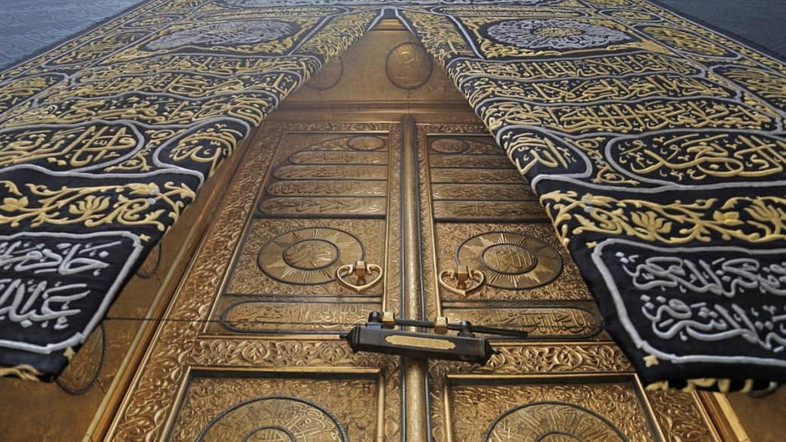بسم الله الرحمن الرحيم
Assalamu Alaikum.
(Here are Parts 1, 2, 3, 4 and 5.)
So, this year’s Hajj has started and it’s a “local” one due to the coronavirus. So why am I posting the latest part of my Hajj series now?
Well, this part is about Makkah and Masjid Al-Haram (as the pilgrim is headed there to do Tawaf) so I thought that people would enjoy reading about it more now that they have been temporarily cut off from it.
Allah knows Best when we will be able to visit again. However, in the meantime, we can go through its virtues and all the lovely pics of the place.
Hope you enjoy reading this part.
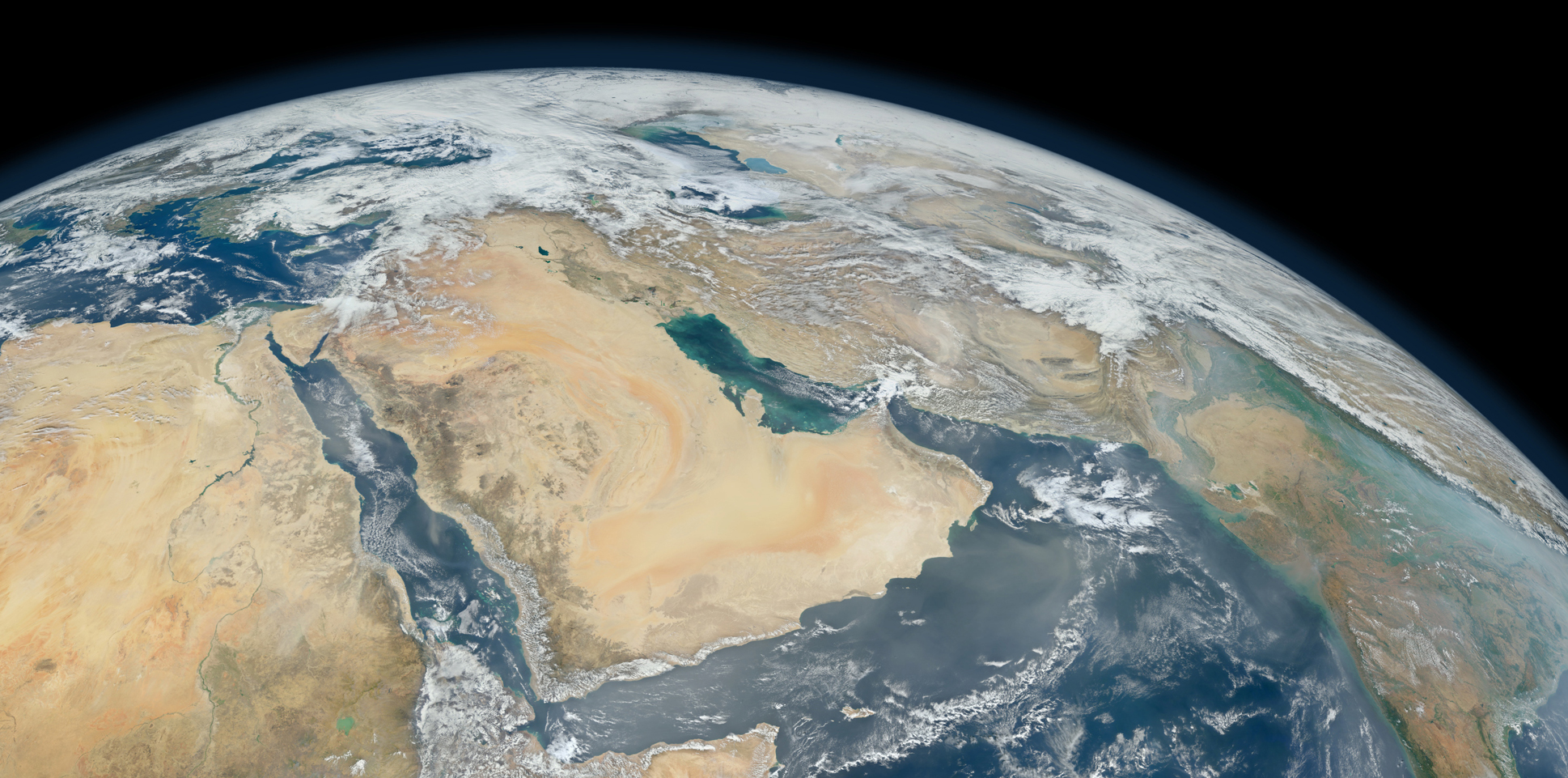
VIRTUES OF THE ARABIAN PENINSULA
Whilst on the way to Makkah, you need to remember that you are in the Arabian Peninsula (Jazeeratul Arab).
Historically speaking, the Arabian Peninsula consists of all the Gulf States (Saudi Arabia, United Arab Emirates, Kuwait, Bahrain, Oman and Qatar) and Yemen (along with a part of Iraq and a part of Jordan).
عن سَعِيدٌ – يَعْنِي ابْنَ عَبْدِ الْعَزِيزِ – جَزِيرَةُ الْعَرَبِ مَا بَيْنَ الْوَادِي إِلَى أَقْصَى الْيَمَنِ إِلَى تُخُومِ الْعِرَاقِ إِلَى الْبَحْرِ
It was reported from Saeed, meaning Ibn Abdul Aziz said “The Arabian Peninsula is that which lies between Al Wadi up to the farthest part of Yemen extending to the border of Al Iraq, to the sea.” [Sunan Abee Dawood, Hadeeth No.3033. Graded “sahih maqtoo” (authentic as a statement of a Tabiee* by Al-Albani.]
(*The Tabieen are the generation after the Prophet’s (sallallahu alaihi wasallam) generation.)
(Note: Jordan belongs to Ash-Sham (the Levant region) which itself has a lot of virtues. The other countries in Ash-Sham are Lebanon, Palestine and Syria, along with some parts of the surrounding areas. The virtues of Ash-Sham will be dicussed in the last part, in shaa Allah, when we get to Masjid Al-Aqsa.)
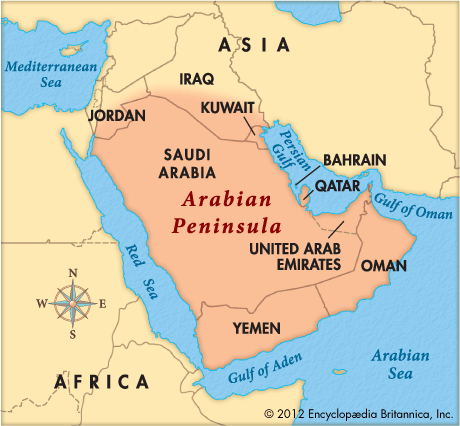
So, what’s so special about this part of the world?
Well, Islam began here, with the advent of the Prophet (sallallahu alaihi wasallam). It will also return here at the end of time.
عَنِ ابْنِ عُمَرَ، عَنِ النَّبِيِّ صلى الله عليه وسلم قَالَ : إِنَّ الإِسْلاَمَ بَدَأَ غَرِيبًا وَسَيَعُودُ غَرِيبًا كَمَا بَدَأَ وَهُوَ يَأْرِزُ بَيْنَ الْمَسْجِدَيْنِ كَمَا تَأْرِزُ الْحَيَّةُ فِي جُحْرِهَا
It is narrated on the authority of Ibn Umar (radiallahu anhuma) that the Messenger of Allah (sallallahu alaihi wasallam) observed: Verily Islam started as something strange and it would again revert (to its old position) of being strange just as it started, and it would recede between the two mosques* just as the serpent crawls back into its hole. [Sahih Muslim, Hadeeth No. 271]
(*This refers to Masjid Al-Haram in Makkah and Masjid An-Nabawi in Madinah.)
Also, Shaytaan (the devil) has despaired that he would be worshipped in this area (as a whole).
عَنْ جَابِرٍ، قَالَ سَمِعْتُ النَّبِيَّ صلى الله عليه وسلم يَقُولُ : إِنَّ الشَّيْطَانَ قَدْ أَيِسَ أَنْ يَعْبُدَهُ الْمُصَلُّونَ فِي جَزِيرَةِ الْعَرَبِ وَلَكِنْ فِي التَّحْرِيشِ بَيْنَهُمْ
Jabir (radiallahu anhu) reported: I heard Allah’s Messenger (sallallahu alaihi wasallam) as saying: Verily, the Satan (the devil) has lost all hopes that those who pray in the Arabian Peninsula would ever worship him, but he (is hopeful) that he would sow the seed of dissension amongst them. [Sahih Muslim, Hadeeth No. 6752]
In fact, the Prophet (sallallahu alaihi wasallam commanded that only one religion (deen) remain in the Peninsula.
عن عائشة قالت: كان آخر ما عهد رسول الله صلى الله عليه وسلّم أن قال: لا يُتْرَكُ بِجَزِيرَةِ العَرَبِ دِينانِ
Aisha (radiallahu anha) narrated that the final instruction of the Messenger of Allah (sallallahu alaihi wasallam) that he said: Two religions should not be left (i.e. permitted) in the Arabian Peninsula. [Musnad Ahmad, Hadeeth No. 26352. Shuaib Al-Arnaut said it was “sahih lighairihi” (authentic due to supporting narrations).]
Apart from its general virtues, the Arabian Peninsula contains certain places which have specific virtues of their own.
For example, Yemen and its people have been mentioned by the Prophet (sallallahu alaihi wasallam).
عَنْ أَبِي مَسْعُودٍ، أَنَّ النَّبِيَّ صلى الله عليه وسلم قَالَ : الإِيمَانُ هَا هُنَا - وَأَشَارَ بِيَدِهِ إِلَى الْيَمَنِ - وَالْجَفَاءُ وَغِلَظُ الْقُلُوبِ فِي الْفَدَّادِينَ، عِنْدَ أُصُولِ أَذْنَابِ الإِبِلِ مِنْ حَيْثُ يَطْلُعُ قَرْنَا الشَّيْطَانِ رَبِيعَةَ وَمُضَرَ .
Narrated Abu Masud (radiallahu anhu): The Prophet (sallallahu alaihi wasallam) beckoned with his hand towards Yemen and said, “Belief is there.” The harshness and mercilessness are the qualities of those farmers etc., who are busy with their camels and pay no attention to the religion (is towards the east) from where the side of the head of Satan will appear; those are the tribes of Rabia and Mudar. [Sahih Al-Bukhari, Volume 5, Hadeeth No. 670]
عَنْ أَبِي هُرَيْرَةَ ـ رضى الله عنه ـ عَنِ النَّبِيِّ صلى الله عليه وسلم قَالَ : أَتَاكُمْ أَهْلُ الْيَمَنِ، هُمْ أَرَقُّ أَفْئِدَةً وَأَلْيَنُ قُلُوبًا، الإِيمَانُ يَمَانٍ وَالْحِكْمَةُ يَمَانِيَةٌ، وَالْفَخْرُ وَالْخُيَلاَءُ فِي أَصْحَابِ الإِبِلِ، وَالسَّكِينَةُ وَالْوَقَارُ فِي أَهْلِ الْغَنَمِ
Narrated Abu Hurairah (radiallahu anhu): The Prophet (sallallahu alaihi wasallam) said, “The people of Yemen have come to you and they are more gentle and soft-hearted. Belief is Yemeni and wisdom is Yemeni, while pride and haughtiness are the qualities of the owners of camels (i.e. bedouins). Calmness and solemnity are the characters of the owners of sheep.” [Sahih Al-Bukhari, Volume 5, Hadeeth No. 671]
عَنِ أَبي هُرَيْرَة ـ رضى الله عنه ـ قَالَ سَمِعْتُ رَسُولَ اللَّهِ صلى الله عليه وسلم يَقُولُ : الْفَخْرُ وَالْخُيَلاَءُ فِي الْفَدَّادِينَ أَهْلِ الْوَبَرِ، وَالسَّكِينَةُ فِي أَهْلِ الْغَنَمِ، وَالإِيمَانُ يَمَانٍ، وَالْحِكْمَةُ يَمَانِيَةٌ
سُمِّيَتِ الْيَمَنَ لأَنَّهَا عَنْ يَمِينِ الْكَعْبَةِ، وَالشَّأْمَ عَنْ يَسَارِ الْكَعْبَةِ
Narrated Abu Hurairah (radiallahu anhu): I heard Allah’s Messenger (sallallahu alaihi wasallam) saying, “Pride and arrogance are characteristics of the rural bedouins while calmness is found among the owners of sheep. Belief is Yemeni, and wisdom is also Yemeni (i.e. the Yemenis are well-known for their true belief and wisdom).” Abu Abdullah (Al-Bukhari) said, “Yemen was called so because it is situated to the right of the Kabah, and Sham was called so because it is situated to the left of the Kabah.” [Sahih Al-Bukhari, Volume 4, Hadeeth No. 703]
عَنْ أَبِي هُرَيْرَةَ، قَالَ قَالَ رَسُولُ اللَّهِ صلى الله عليه وسلم : جَاءَ أَهْلُ الْيَمَنِ هُمْ أَرَقُّ أَفْئِدَةً الإِيمَانُ يَمَانٍ وَالْفِقْهُ يَمَانٍ وَالْحِكْمَةُ يَمَانِيَةٌ
It is narrated on the authority of Abu Hurairah (radiallahu anhu) that the Messenger of Allah (sallallahu alaihi wasallam) observed: There have come the people of Yemen; they are tender of hearts, the belief is that of the Yemenis, the understanding (of the faith) is that of the Yemenis and wisdom is that of the Yemenis. [Sahih Muslim, Hadeeth No. 84]
عَنْ أَبِي هُرَيْرَةَ، قَالَ قَالَ رَسُولُ اللَّهِ صلى الله عليه وسلم : أَتَاكُمْ أَهْلُ الْيَمَنِ هُمْ أَضْعَفُ قُلُوبًا وَأَرَقُّ أَفْئِدَةً الإِيمَانُ يَمَانٍ وَالْحِكْمَةُ يَمَانِيَةٌ
Narrated Abu Hurairah (radiallahu anhu) that the Messenger of Allah (sallallahu alaihi wasallam) said: “The people of Yemen have come to you. They are weaker in heart and softer in understanding, faith is Yemeni and wisdom is Yemeni.” [Sunan At-Tirmidhi, Hadeeth No. 3935. Graded “sahih” (authentic) by Al-Albani.]
عَنْ أَبِي هُرَيْرَةَ، قَالَ قَالَ رَسُولُ اللَّهِ صلى الله عليه وسلم : الْمُلْكُ فِي قُرَيْشٍ وَالْقَضَاءُ فِي الأَنْصَارِ وَالأَذَانُ فِي الْحَبَشَةِ وَالأَمَانَةُ فِي الأَزْدِ – يَعْنِي الْيَمَنَ
Narrated Abu Hurairah (radiallahu anhu) that the Messenger of Allah (sallallahu alaihi wasallam) said: “Leadership is among the Quraish, and reasoning and judgment is among the Ansar, and the Adhan is among the Ethiopians, and the trust is among the Al-Azd.” meaning Yemen. [Sunan At-Tirmidhi, Hadeeth No. 3936. Graded “sahih” (authentic) by Al-Albani.]
And of course, the Arabian Peninsula contains Makkah and Madinah, which have numerous virtues of their own, which will be discussed later on in their respective sections, in shaa Allah.
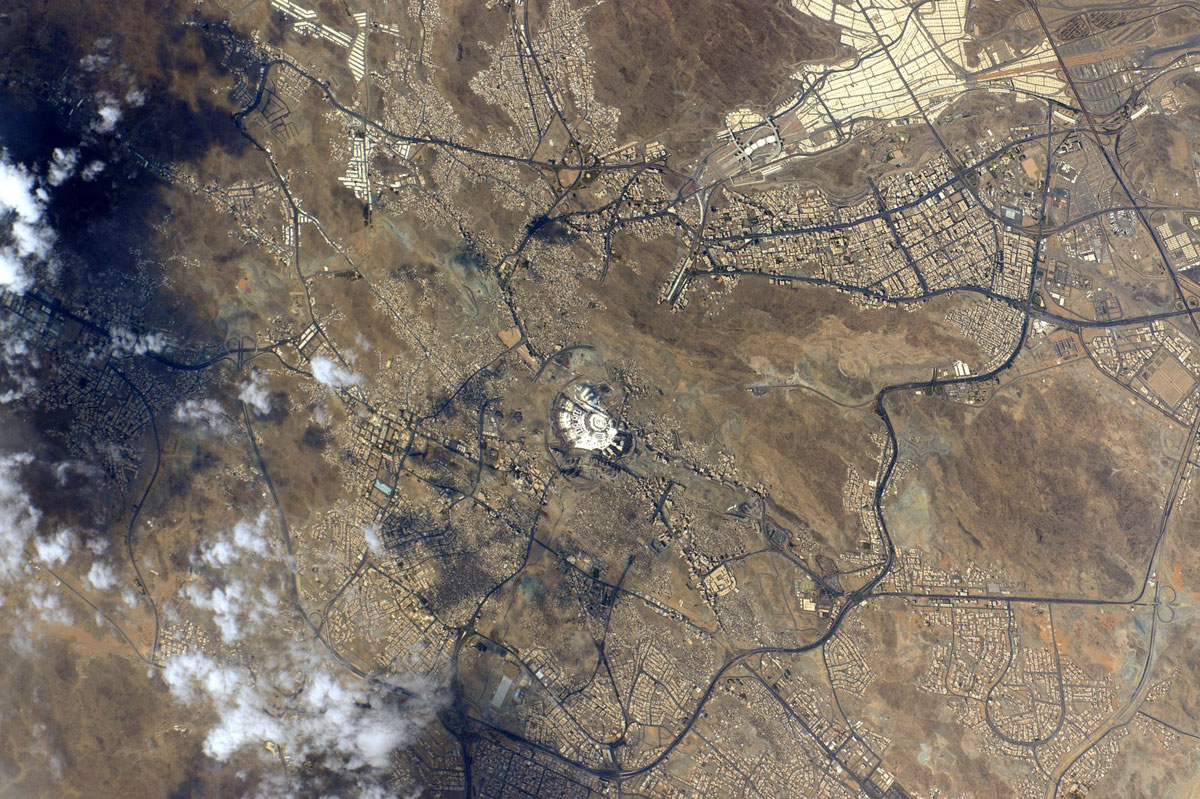
MAKKAH
So, now a pilgrim arrives in Makkah.
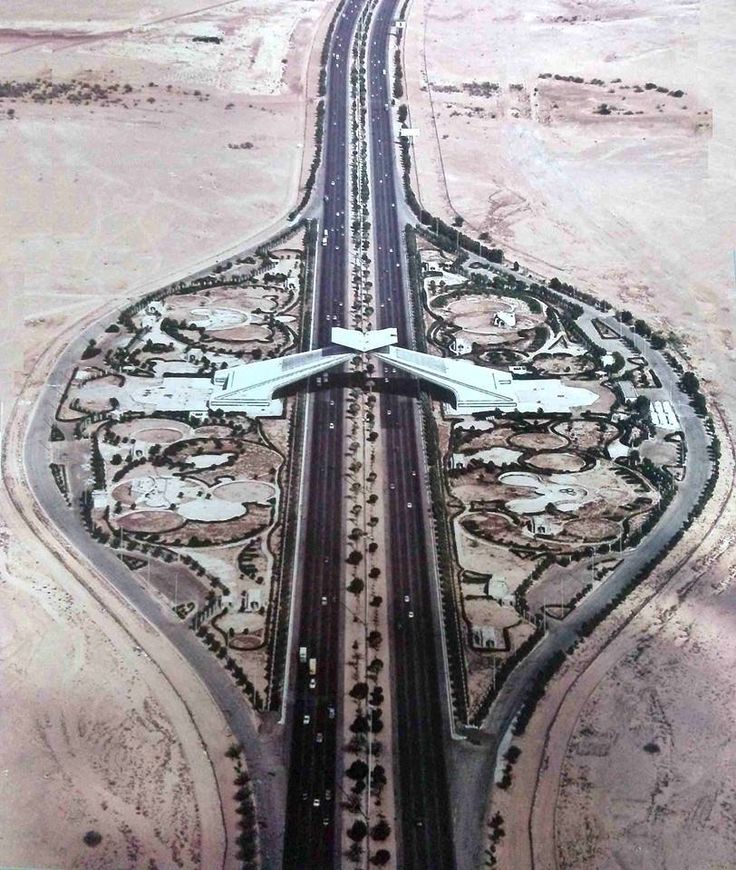
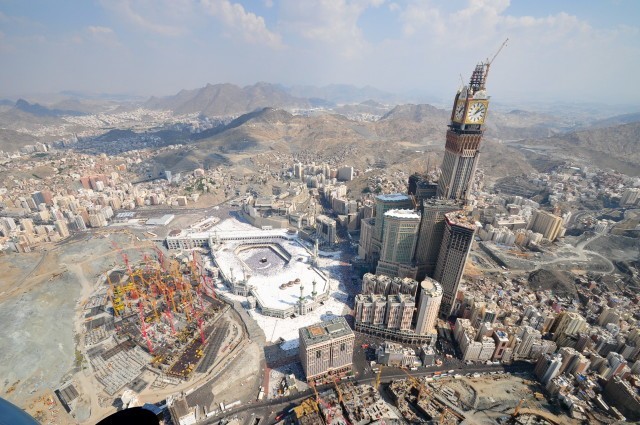
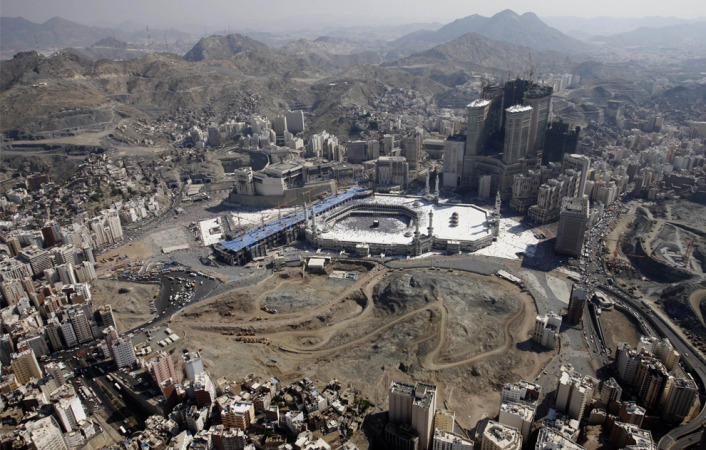
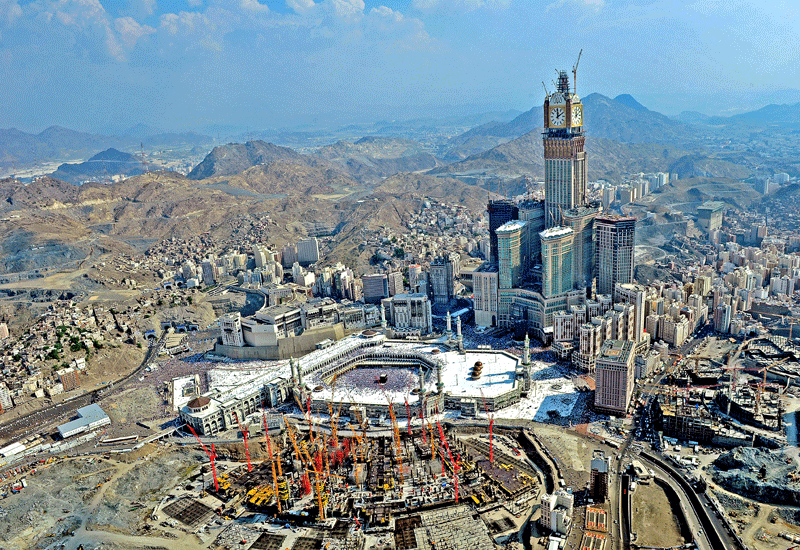
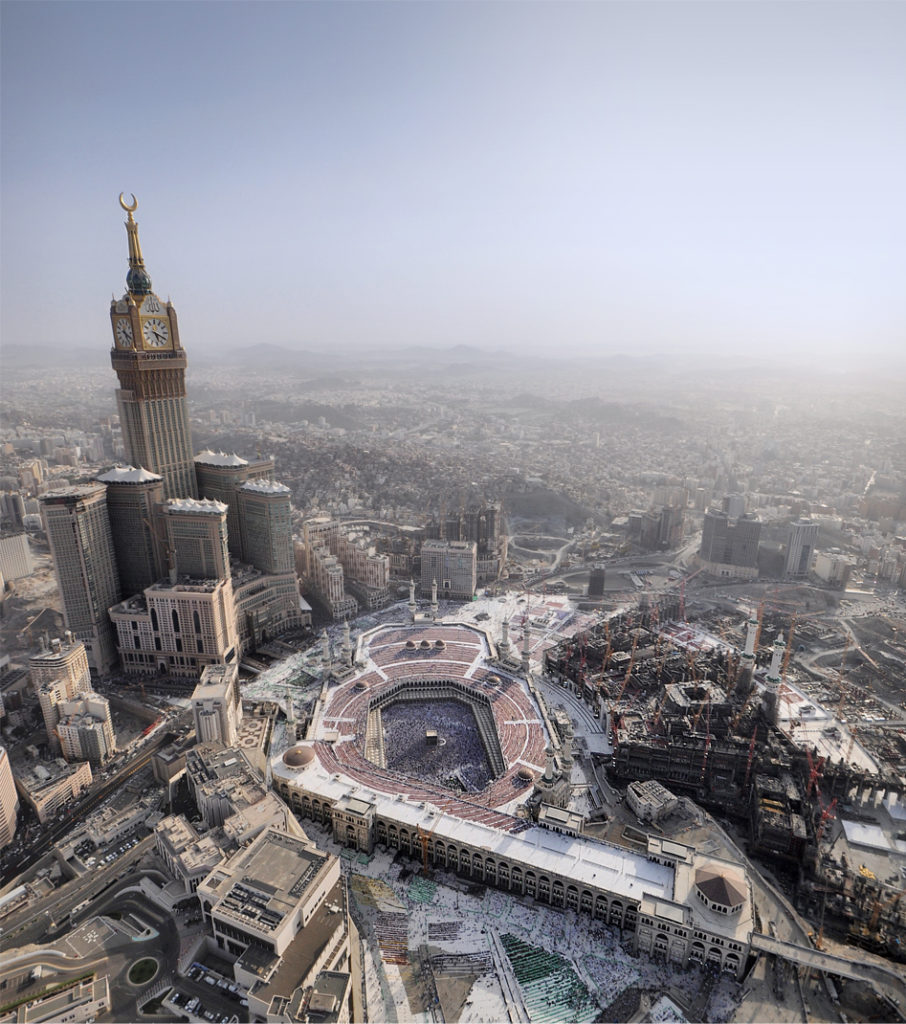
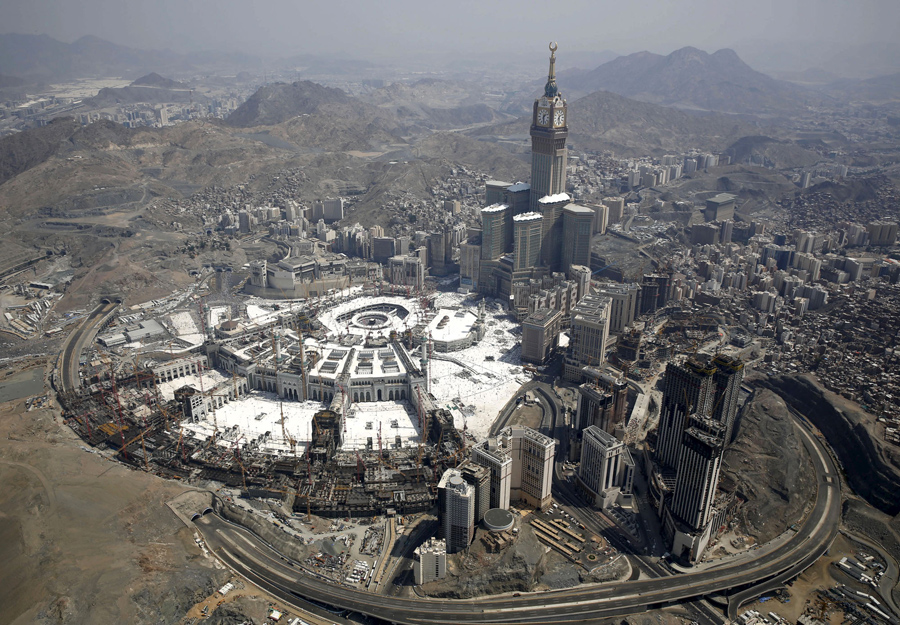
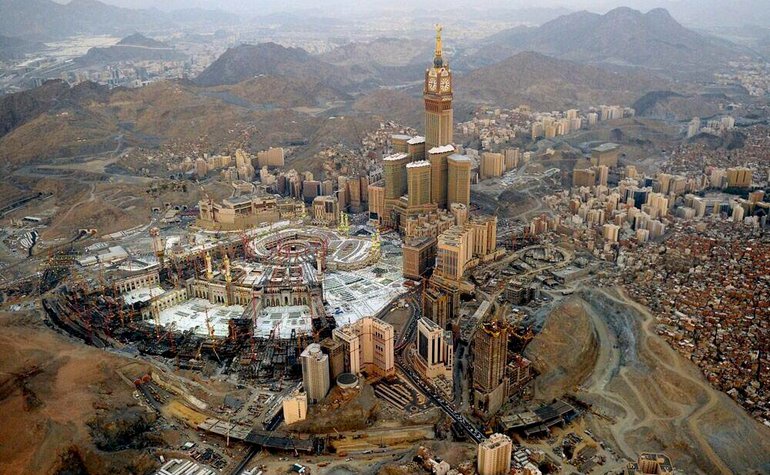
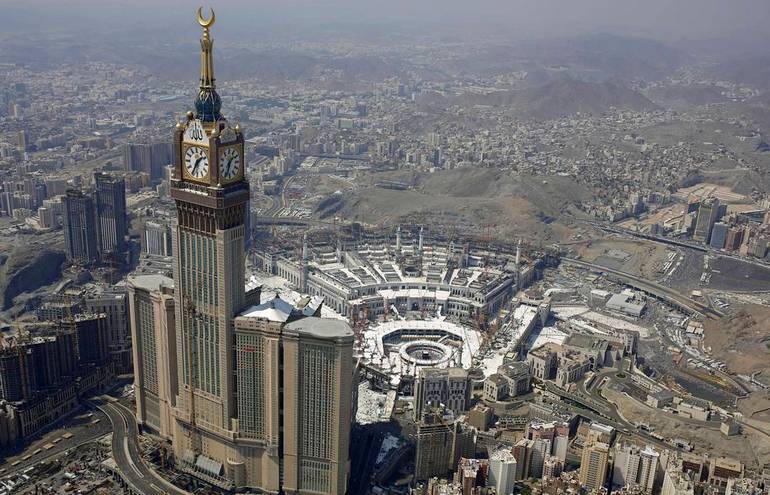
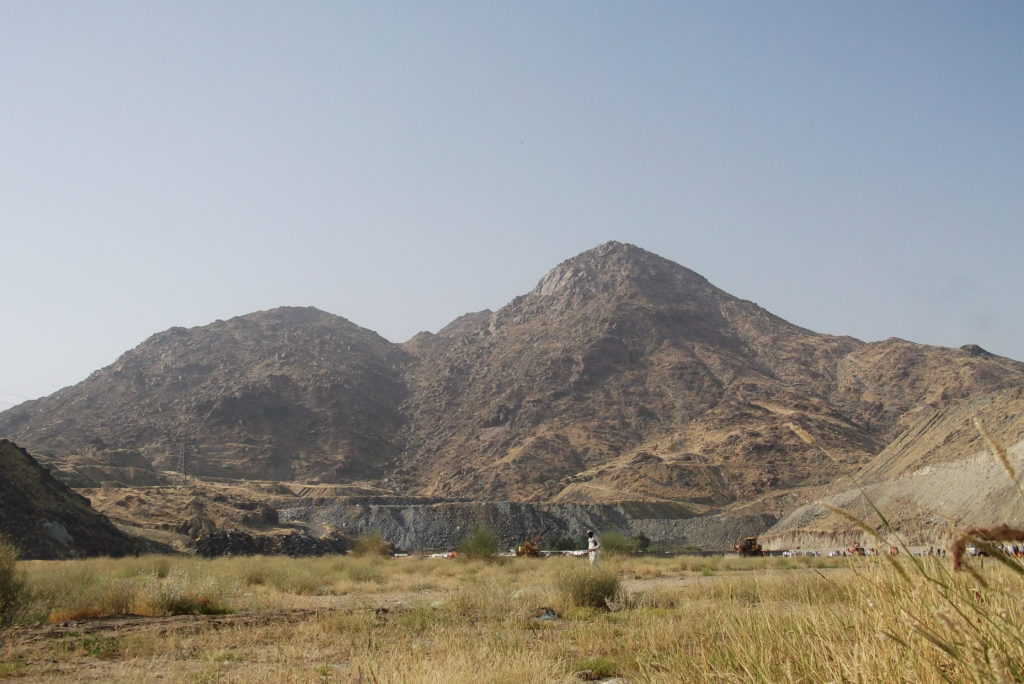
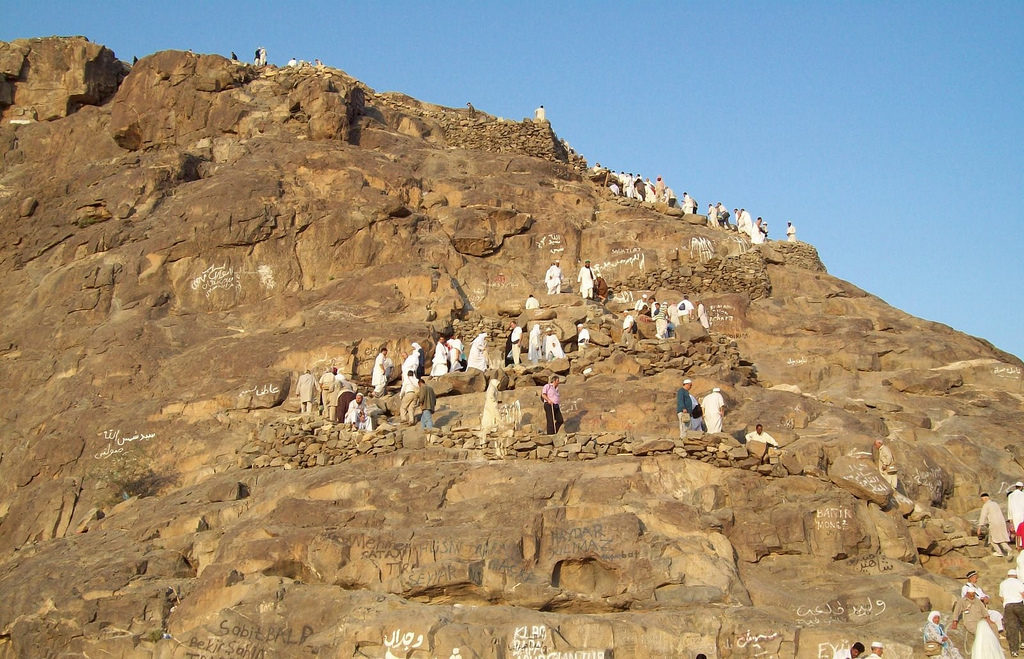

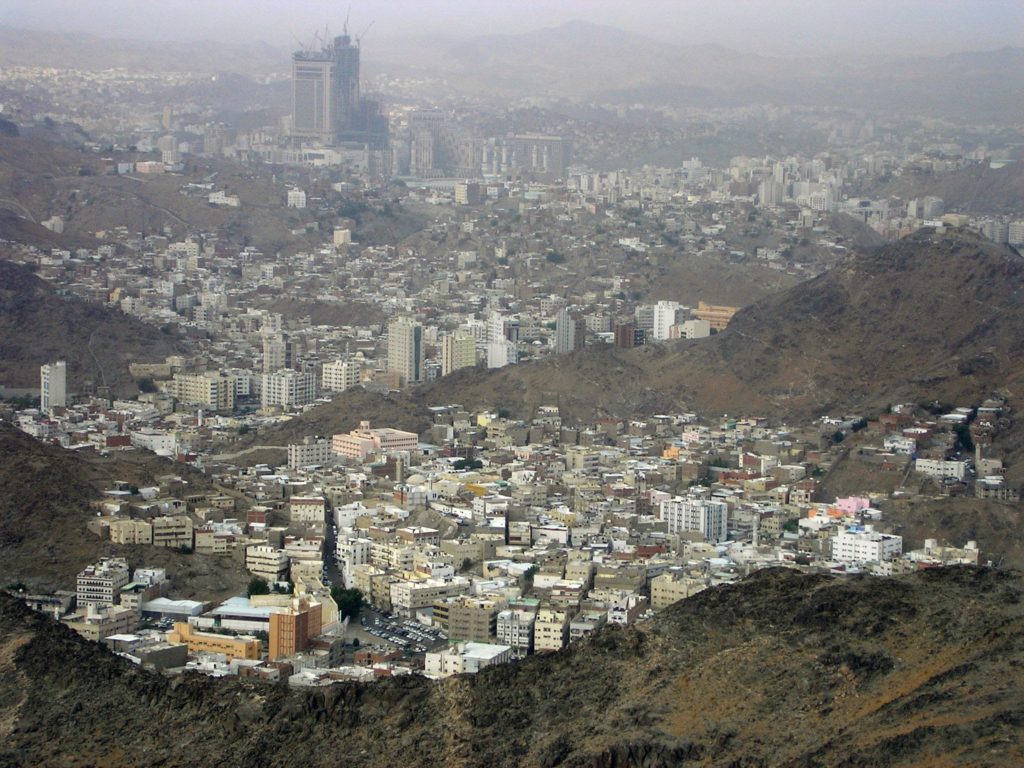
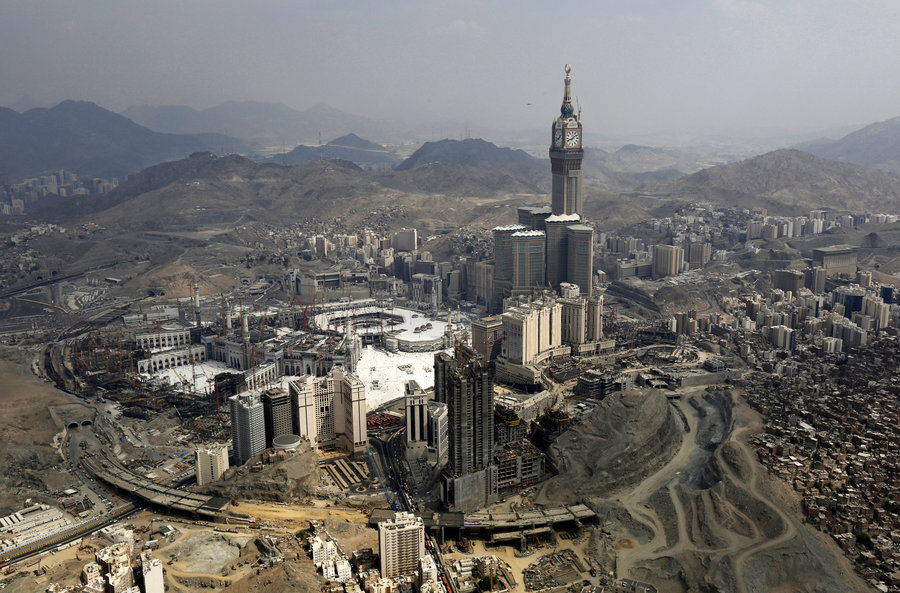
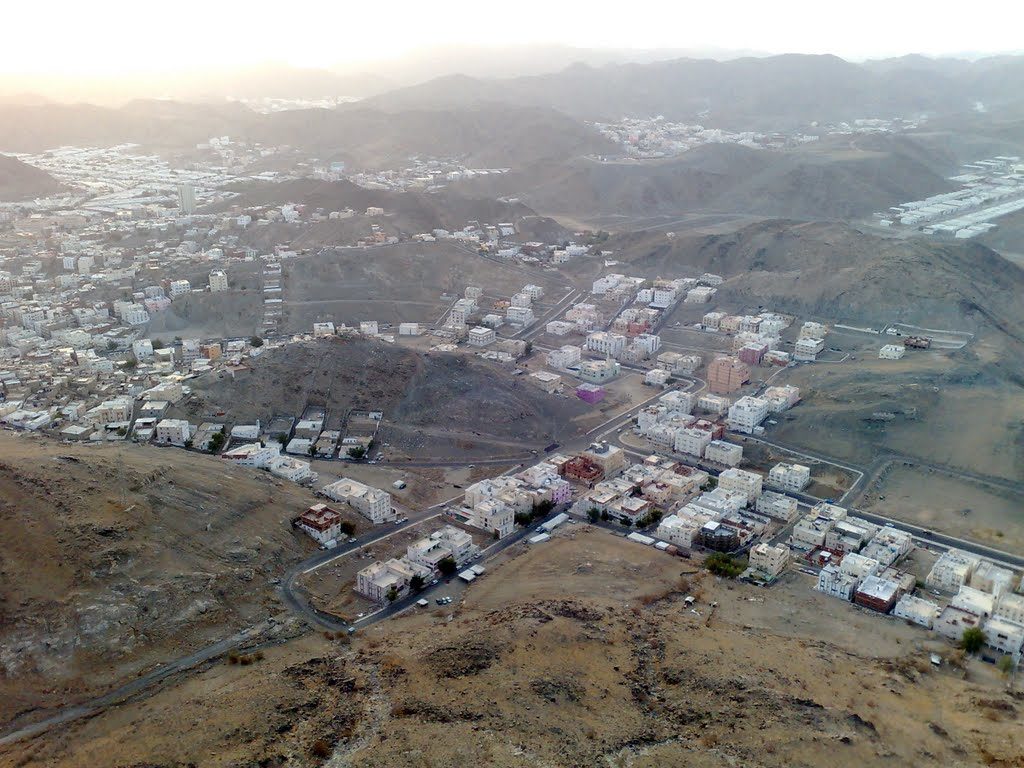
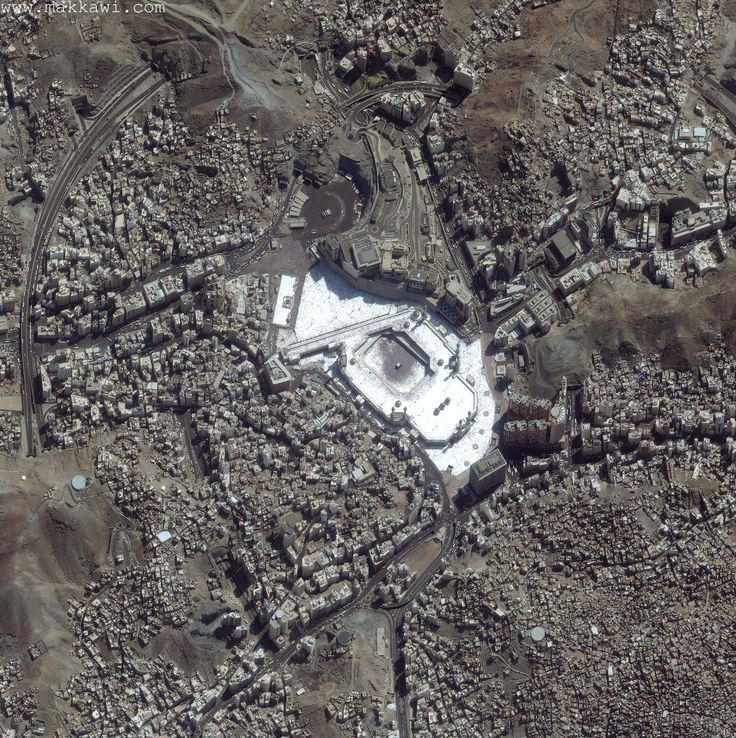
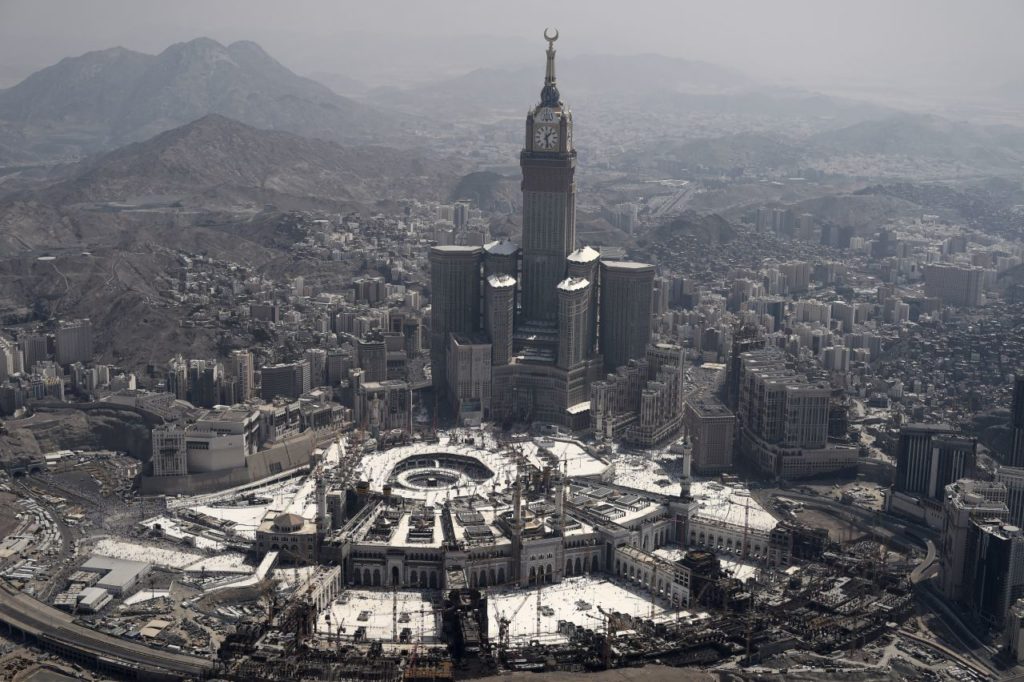
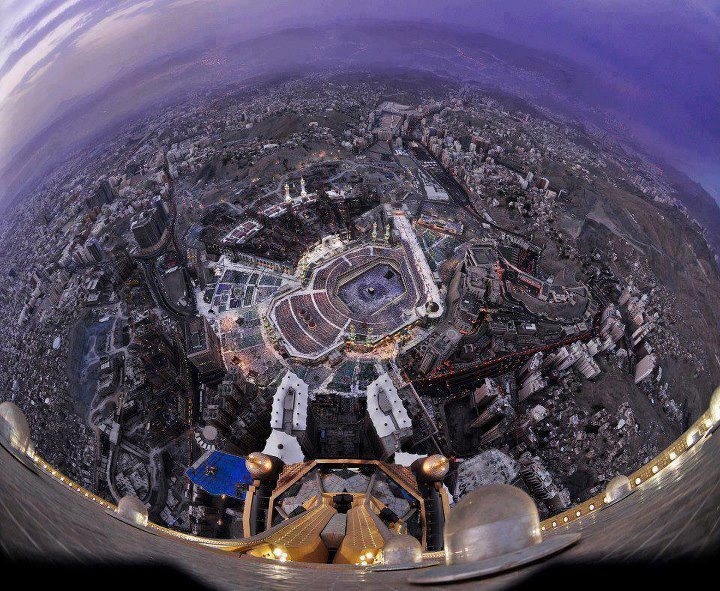
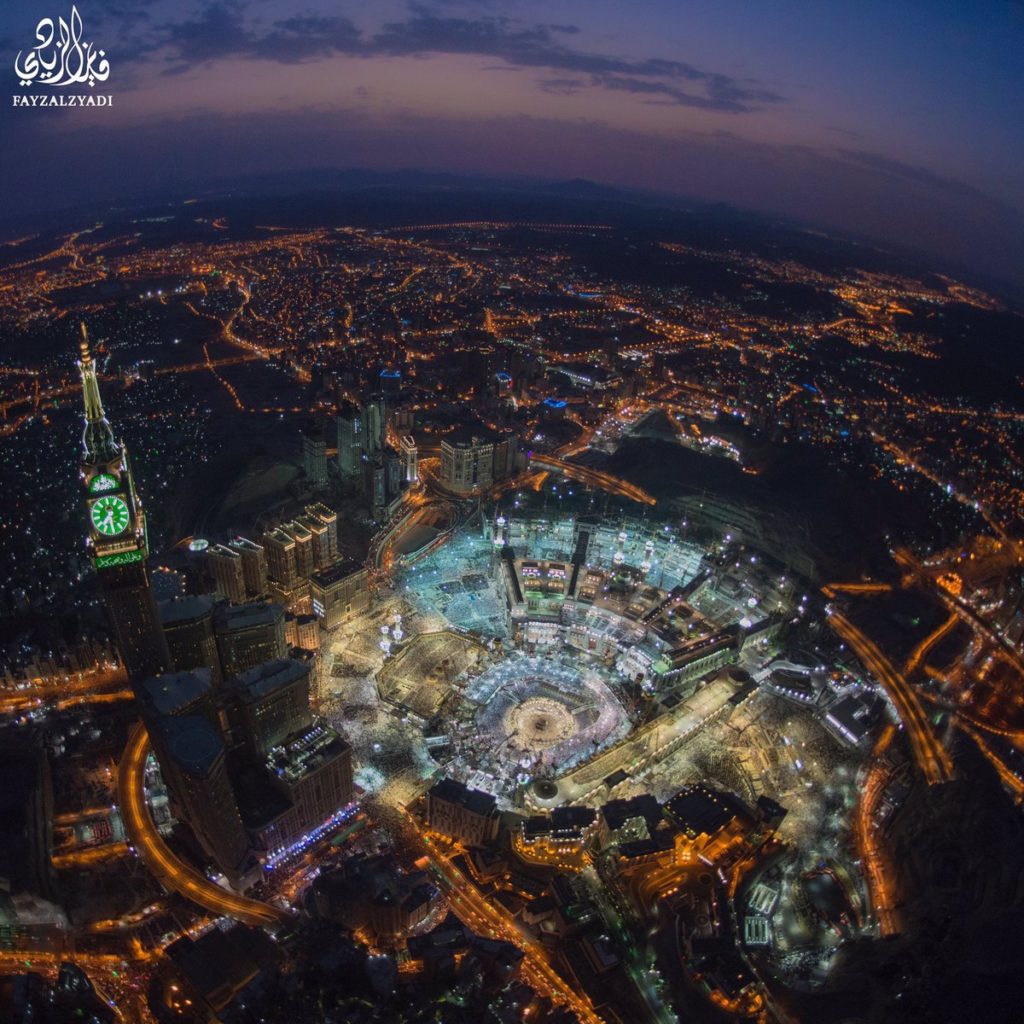
The Boundaries of Makkah
The boundaries of Makkah are mentioned in this article, and shown in the two images below.
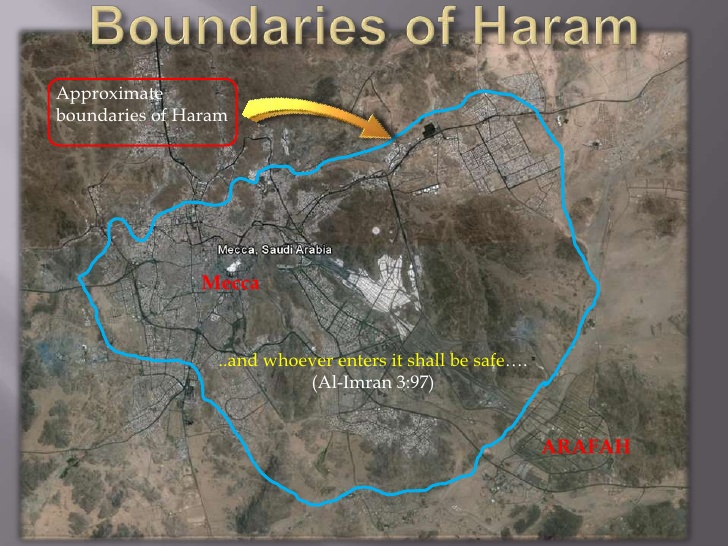
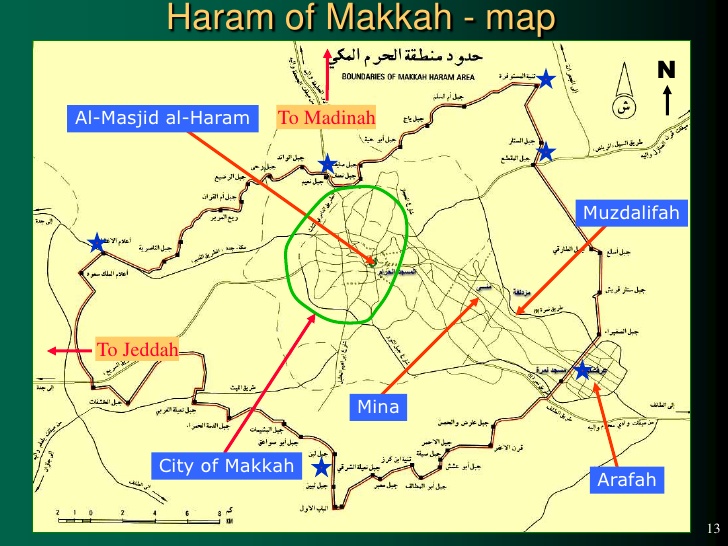
Some of Makkah’s Other Names
Makkah has other names by which it is own, one of them being “Bakkah”.
إِنَّ أَوَّلَ بَيْتٍ وُضِعَ لِلنَّاسِ لَلَّذِي بِبَكَّةَ مُبَارَكًا وَهُدًى لِّلْعَالَمِينَ
“Verily, the first House (of worship) appointed for mankind was that at Bakkah (Makkah), full of blessing, and a guidance for Al-Alameen (the mankind and jinns). [Surah Aal-Imran (3) : 96]
Ibn Kathir states in his explanation of the above verse:
“Allah said,
﴿لَلَّذِى بِبَكَّةَ﴾
(was that at Bakkah), where Bakkah is one of the names of Makkah. Bakkah means, `it brings Buka’ (crying, weeping) to the tyrants and arrogant, meaning they cry and become humble in its vicinity. It was also said that Makkah was called Bakkah because people do Buka next to it, meaning they gather around it. There are many names for Makkah, such as Bakkah, Al-Bayt Al-Atiq (the Ancient House), Al-Bayt Al-Haram (the Sacred House), Al-Balad Al-Amin (the City of Safety) and Al-Mamun (Security). Makkah’s names include Umm Rahm (Mother of Mercy), Umm Al-Qura (Mother of the Towns), Salah, [as well as others].”
Virtues of Makkah
-
It is the best place in the sight of Allah
عن عَبْدِ اللّهِ بنِ عَدِيِّ بنِ حَمْرَاءَ الزهري ، قال: رَأَيْتُ رسولَ اللّهِ وَاقِفاً عَلَى الْحَزْورَةِ، فَقَالَ: وَاللّهِ إِنَّك لَخَيْرُ أَرْضِ اللّهِ، وَأَحَبُّ أَرْضِ اللّهِ إِلَى اللّهِ. وَلَوْلاَ أَنِّي أُخْرِجْتُ مِنْكِ مَا خَرَجْتُ
Abdullah ibn Adi ibn Hamra Az-Zuhri said: “I saw the Messenger of Allah (sallallahu alaihi wasallam) standing at Al-Hazwarah and he said: “By Allah! You are the best of Allah’s earth, and the most beloved of Allah’s earth to Allah, and if it were not that I was expelled from you, I would not have left.” [Jaami At-Tirmidhi, Hadeeth No. 3925. Graded “sahih” (authentic) by Shaikh Al-Albani.]
So, Makkah is the greatest place on earth. And that is only ONE of its many virtues.
2. It was dear to the Prophet (sallallahu alaihi wasallam)
عن ابنِ عَبَّاسٍ قالَ: قال رسولُ اللّهِ لِمَكَّةَ،: مَا أَطْيَبَكِ مِنْ بَلِدٍ وَأَحَبَّكِ إِلَيَّ، وَلَوْلاَ أَنَّ قَوْمِي أَخْرَجُونِي مِنْكِ مَا سَكَنْتُ غَيْرَكِ
Ibn Abbas (radiallahu anhu) narrated that the Messenger of Allah (sallallahu alaihi wasallam) said about Makkah: “How sweet of a land you are and how dear you are to me, and if it were not that my people expelled me from you, I would not have lived in other than you.” [Jaami At-Tirmidhi, Hadeeth No. 3926. Graded “sahih” (authentic) by Al-Albani.]
3. Allah swears by this city in the Quran
لَا أُقْسِمُ بِهَـٰذَا الْبَلَدِ
وَأَنتَ حِلٌّ بِهَـٰذَا الْبَلَدِ
I swear by this city (Makkah); And you are free (from sin, to punish the enemies of Islam on the Day of the conquest) in this city (Makkah). [Surah Al-Balad (90) : 1-2]
وَهَـٰذَا الْبَلَدِ الْأَمِينِ
And by this city of security (Makkah). [Surah At-Tin (95) : 3]
4. Allah refers to Himself as the Lord of this city
إِنَّمَا أُمِرْتُ أَنْ أَعْبُدَ رَبَّ هَـٰذِهِ الْبَلْدَةِ الَّذِي حَرَّمَهَا وَلَهُ كُلُّ شَيْءٍ ۖ وَأُمِرْتُ أَنْ أَكُونَ مِنَ الْمُسْلِمِينَ
I (Muhammad) have been commanded only to worship the Lord of this city (Makkah), Him Who has sanctified it and His is everything. And I am commanded to be from among the Muslims (those who submit to Allah in Islam). [Surah An-Naml (27) : 91]
Ibn Kathir states in his explanation of this verse:
“Allah commands His Messenger to say:
﴿إِنَّمَآ أُمِرْتُ أَنْ أَعْبُدَ رَبِّ هَذِهِ الْبَلْدَةِ الَّذِى حَرَّمَهَا وَلَهُ كُلُّ شَىءٍ﴾
(I have been commanded only to worship the Lord of this city, Who has sanctified it and to Whom belongs everything.) This is like the Ayah,
﴿قُلْ يأَيُّهَا النَّاسُ إِن كُنتُمْ فِى شَكٍّ مِّن دِينِى فَلاَ أَعْبُدُ الَّذِينَ تَعْبُدُونَ مِن دُونِ اللَّهِ وَلَـكِنْ أَعْبُدُ اللَّهَ الَّذِى يَتَوَفَّاكُمْ﴾
(Say: “O you mankind! If you are in doubt as to my religion, then (know that) I will never worship those whom you worship besides Allah. But I worship Allah Who causes you to die.) (10:104)
The fact that the word “Rabb” (Lord) is connected to the word city (in the phrase “the Lord of this city”) is a sign of honor and divine care for that city. This is like the Ayah,
﴿فَلْيَعْبُدُواْ رَبَّ هَـذَا الْبَيْتِ – الَّذِى أَطْعَمَهُم مِّن جُوعٍ وَءَامَنَهُم مِّنْ خوْفٍ ﴾
(So let them worship the Lord of this House (the Kabah), Who has fed them against hunger, and has made them safe from fear.) (106:3-4)
﴿الَّذِى حَرَّمَهَا﴾
(Who has sanctified it) means, the One Who made it a sanctuary by His Law and by His decree, making it sanctified. It was recorded in the Two Sahihs that Ibn Abbas said: “On the day of the conquest of Makkah, the Messenger of Allah said:
«إِنَّ هَذَا الْبَلَدَ حَرَّمَهُ اللهُ يَوْمَ خَلَقَ السَّمَوَاتِ وَالْأَرْضَ، فَهُوَ حَرَامٌ بِحُرْمَةِ اللهِ إِلَى يَوْمِ الْقِيَامَةِ، لَا يُعْضَدُ شَوْكُهُ، وَلَا يُنَفَّرُ صَيْدُهُ وَلَا يَلْتَقِطُ لُقَطَتَهُ إِلَّا مَنْ عَرَّفَهَا وَلَا يُخْتَلَى خَلَاهَا»
(Verily, this city was made sacred by Allah the day He created the heavens and the earth, so it is sacred by the sanctity of Allah until the Day of Resurrection. Its thorny bushes should not be cut, its game should not be chased, and its lost property should not be picked up except by one who would announce it publicly and none is allowed to uproot its thorny shrubs…)” This was reported in Sahih, Hasan, Musnad narrarations, through various routes, by such a large group that it is absolutely unquestionable, as has been explained in the appropriate place in the book Al-Ahkam, to Allah is the praise and thanks.
﴿وَلَهُ كُلُّ شَىءٍ﴾
(and to Whom belongs everything.) This is a statement of general application following a specific statement, i.e., He is the Lord of this city, and the Lord and Sovereign of all things, there is no god worthy of worship besides Him.
﴿وَأُمِرْتُ أَنْ أَكُونَ مِنَ الْمُسْلِمِينَ﴾
(And I am commanded to be from among the Muslims. ) means, those who believe in Allah alone, who are sincere towards Him and who obediently follow His commands.”
5. It is a sanctuary
عَنْ عَبْدِ اللَّهِ بْنِ زَيْدٍ ـ رضى الله عنه ـ عَنِ النَّبِيِّ صلى الله عليه وسلم : أَنَّ إِبْرَاهِيمَ حَرَّمَ مَكَّةَ، وَدَعَا لَهَا، وَحَرَّمْتُ الْمَدِينَةَ كَمَا حَرَّمَ إِبْرَاهِيمُ مَكَّةَ، وَدَعَوْتُ لَهَا فِي مُدِّهَا وَصَاعِهَا، مِثْلَ مَا دَعَا إِبْرَاهِيمُ ـ عَلَيْهِ السَّلاَمُ ـ لِمَكَّةَ
Narrated Abdullah ibn Zaid (radiallahu anhu): The Prophet (sallallahu alaihi wasallam) said, “Ibrahim made Makkah a sanctuary, and asked for Allah’s blessing in it. I made Madinah a sanctuary as Ibrahim made Makkah a sanctuary and I asked for Allah’s Blessing in its measures the Mudd and the Saa as Ibrahim (alaihissalaam) did for Makkah. [Sahih Al-Bukhari, Volume 3, Hadeeth No. 339]
عَنْ عَمِّهِ عَبْدِ اللَّهِ بْنِ زَيْدِ بْنِ عَاصِمٍ، أَنَّ رَسُولَ اللَّهِ صلى الله عليه وسلم قَالَ : إِنَّ إِبْرَاهِيمَ حَرَّمَ مَكَّةَ وَدَعَا لأَهْلِهَا وَإِنِّي حَرَّمْتُ الْمَدِينَةَ كَمَا حَرَّمَ إِبْرَاهِيمُ مَكَّةَ وَإِنِّي دَعَوْتُ فِي صَاعِهَا وَمُدِّهَا بِمِثْلَىْ مَا دَعَا بِهِ إِبْرَاهِيمُ لأَهْلِ مَكَّةَ
Abdullah ibn Zaid ibn Asim (radiallahu anhu) reported Allah’s Messenger (sallallahu alaihi wasallam) as saying: Verily Ibrahim declared Makkah sacred and supplicated (for blessings to be showered) upon its inhabitants, and I declare Madinah to be sacred as lbrahim had declared Makkah to be sacred. I have supplicated (Allah for His blessings to be showered) in its saa and its mudd (two standards of weight and measurement) twice as did Ibrahim for the inhabitants of Makkah. [Sahih Muslim, Hadeeth No. 3150]
An interesting point: Makkah is the greatest place and Madinah is the second greatest place. Muhammad (sallallahu alaihi wasallam) was the greatest prophet and Ibrahim (alaihissalaam) was the second greatest prophet.
So, the second greatest prophet made the greatest place a sanctuary and the greatest prophet made the second greatest place a sanctuary.
وَقَالُوا إِن نَّتَّبِعِ الْهُدَىٰ مَعَكَ نُتَخَطَّفْ مِنْ أَرْضِنَا ۚ أَوَلَمْ نُمَكِّن لَّهُمْ حَرَمًا آمِنًا يُجْبَىٰ إِلَيْهِ ثَمَرَاتُ كُلِّ شَيْءٍ رِّزْقًا مِّن لَّدُنَّا وَلَـٰكِنَّ أَكْثَرَهُمْ لَا يَعْلَمُونَ
And they say: “If we follow the guidance with you, we would be snatched away from our land.” Have We not established for them a secure sanctuary (Makkah), to which are brought fruits of all kinds, a provision from Ourselves, but most of them know not. [Surah Al-Qasas (28) : 57]
لَمْ يَرَوْا أَنَّا جَعَلْنَا حَرَمًا آمِنًا وَيُتَخَطَّفُ النَّاسُ مِنْ حَوْلِهِمْ ۚأَفَبِالْبَاطِلِ يُؤْمِنُونَ وَبِنِعْمَةِ اللَّـهِ يَكْفُرُونَ
Have they not seen that We have made (Makkah) a sanctuary secure, and that men are being snatched away from all around them? Then do they believe in Baatil (falsehood – polytheism, idols and all deities other than Allah), and deny (become ingrate for) the Graces of Allah? [Surah Al-Ankabut (29) : 67]
عَن سَعِيدٌ، عَنْ أَبِي شُرَيْحٍ، أَنَّهُ قَالَ لِعَمْرِو بْنِ سَعِيدٍ وَهْوَ يَبْعَثُ الْبُعُوثَ إِلَى مَكَّةَ ائْذَنْ لِي أَيُّهَا الأَمِيرُ أُحَدِّثْكَ قَوْلاً قَامَ بِهِ النَّبِيُّ صلى الله عليه وسلم الْغَدَ مِنْ يَوْمِ الْفَتْحِ، سَمِعَتْهُ أُذُنَاىَ وَوَعَاهُ قَلْبِي، وَأَبْصَرَتْهُ عَيْنَاىَ، حِينَ تَكَلَّمَ بِهِ، حَمِدَ اللَّهَ وَأَثْنَى عَلَيْهِ ثُمَّ قَالَ : إِنَّ مَكَّةَ حَرَّمَهَا اللَّهُ، وَلَمْ يُحَرِّمْهَا النَّاسُ، فَلاَ يَحِلُّ لاِمْرِئٍ يُؤْمِنُ بِاللَّهِ وَالْيَوْمِ الآخِرِ أَنْ يَسْفِكَ بِهَا دَمًا، وَلاَ يَعْضِدَ بِهَا شَجَرَةً، فَإِنْ أَحَدٌ تَرَخَّصَ لِقِتَالِ رَسُولِ اللَّهِ صلى الله عليه وسلم فِيهَا فَقُولُوا إِنَّ اللَّهَ قَدْ أَذِنَ لِرَسُولِهِ، وَلَمْ يَأْذَنْ لَكُمْ. وَإِنَّمَا أَذِنَ لِي فِيهَا سَاعَةً مِنْ نَهَارٍ، ثُمَّ عَادَتْ حُرْمَتُهَا الْيَوْمَ كَحُرْمَتِهَا بِالأَمْسِ، وَلْيُبَلِّغِ الشَّاهِدُ الْغَائِبَ . فَقِيلَ لأَبِي شُرَيْحٍ مَا قَالَ عَمْرٌو قَالَ أَنَا أَعْلَمُ مِنْكَ يَا أَبَا شُرَيْحٍ، لاَ يُعِيذُ عَاصِيًا، وَلاَ فَارًّا بِدَمٍ، وَلاَ فَارًّا بِخَرْبَةٍ.
Narrated Saeed: Abu Shuraih (radiallahu anhu) said, “When Amr ibn Saeed was sending the troops to Makkah (to fight Abdullah ibn Az- Zubair) I said to him, ‘O chief! Allow me to tell you what the Prophet (sallallahu alaihi wasalam) said on the day following the conquest of Makkah. My ears heard and my heart comprehended, and I saw him with my own eyes, when he said it. He glorified and praised Allah and then said, “Allah and not the people has made Makkah a sanctuary. So anybody who has belief in Allah and the Last Day (i.e. a Muslim) should neither shed blood in it nor cut down its trees. If anybody argues that fighting is allowed in Makkah as Allah’s Messenger (sallallahu alaihi wasalam) did fight (in Makkah), tell him that Allah gave permission to His Messenger, but He did not give it to you. The Prophet (sallallahu alaihi wasalam) added: Allah allowed me only for a few hours on that day (of the conquest) and today (now) its sanctity is the same (valid) as it was before. So it is incumbent upon those who are present to convey it (this information) to those who are absent.” Abu Shuraih was asked, “What did Amr reply?” He said Amr said, “O Abu Shuraih! I know better than you (in this respect). Makkah does not give protection to one who disobeys (Allah) or runs after committing murder, or theft (and takes refuge in Makkah). [Sahih Al-Bukhari, Volume 1, Hadeeth No. 104]
عَنِ ابْنِ عَبَّاسٍ ـ رضى الله عنهما ـ قَالَ قَالَ رَسُولُ اللَّهِ صلى الله عليه وسلم يَوْمَ فَتْحِ مَكَّةَ : لاَ هِجْرَةَ وَلَكِنْ جِهَادٌ وَنِيَّةٌ، وَإِذَا اسْتُنْفِرْتُمْ فَانْفِرُوا . وَقَالَ يَوْمَ فَتْحِ مَكَّةَ : إِنَّ هَذَا الْبَلَدَ حَرَّمَهُ اللَّهُ يَوْمَ خَلَقَ السَّمَوَاتِ وَالأَرْضَ، فَهْوَ حَرَامٌ بِحُرْمَةِ اللَّهِ إِلَى يَوْمِ الْقِيَامَةِ، وَإِنَّهُ لَمْ يَحِلَّ الْقِتَالُ فِيهِ لأَحَدٍ قَبْلِي، وَلَمْ يَحِلَّ لِي إِلاَّ سَاعَةً مِنْ نَهَارٍ، فَهْوَ حَرَامٌ بِحُرْمَةِ اللَّهِ إِلَى يَوْمِ الْقِيَامَةِ، لاَ يُعْضَدُ شَوْكُهُ، وَلاَ يُنَفَّرُ صَيْدُهُ، وَلاَ يَلْتَقِطُ لُقَطَتَهُ إِلاَّ مَنْ عَرَّفَهَا، وَلاَ يُخْتَلَى خَلاَهُ . فَقَالَ الْعَبَّاسُ يَا رَسُولَ اللَّهِ إِلاَّ الإِذْخِرَ، فَإِنَّهُ لِقَيْنِهِمْ وَلِبُيُوتِهِمْ. قَالَ : إِلاَّ الإِذْخِرَ
Narrated Ibn Abbas (radiallahu anhuma): Allah’s Messenger (sallallahu alaihi wasalam) said on the day of the conquest of Makkah, “There is no migration now, but there is Jihad (i.e. holy battle) and good intentions. And when you are called for Jihad, you should come out at once” Allah’s Messenger (sallallahu alaihi wasalam) also said, on the day of the conquest of Makkah, “Allah has made this town a sanctuary since the day He created the Heavens and the Earth. So, it is a sanctuary by Allah’s Decree till the Day of Resurrection. Fighting in it was not legal for anyone before me, and it was made legal for me only for an hour by daytime. So, it (i.e. Makkah) is a sanctuary by Allah’s Decree till the Day of Resurrection. Its thorny bushes should not be cut, and its game should not be chased, its fallen property (i.e. Luqata) should not be picked up except by one who will announce it publicly; and its grass should not be uprooted,” On that Al-Abbas said, “O Allah’s Messenger (sallallahu alaihi wasalam)! Except the Idhkhir, because it is used by the goldsmiths and by the people for their houses.” On that the Prophet (sallallahu alaihi wasalam) said, “Except the Idhkhir.” [Sahih Al-Bukhari, Volume 4, Hadeeth No. 412]
عَنِ ابْنِ عُمَرَ، رضى الله عنهما قَالَ قَالَ النَّبِيُّ صلى الله عليه وسلم بِمِنًى : أَتَدْرُونَ أَىُّ يَوْمٍ هَذَا . قَالُوا اللَّهُ وَرَسُولُهُ أَعْلَمُ. قَالَ : فَإِنَّ هَذَا يَوْمٌ حَرَامٌ، أَفَتَدْرُونَ أَىُّ بَلَدٍ هَذَا . قَالُوا اللَّهُ وَرَسُولُهُ أَعْلَمُ. قَالَ : بَلَدٌ حَرَامٌ، أَتَدْرُونَ أَىُّ شَهْرٍ هَذَا . قَالُوا اللَّهُ وَرَسُولُهُ أَعْلَمُ. قَالَ : شَهْرٌ حَرَامٌ . قَالَ : فَإِنَّ اللَّهَ حَرَّمَ عَلَيْكُمْ دِمَاءَكُمْ وَأَمْوَالَكُمْ وَأَعْرَاضَكُمْ، كَحُرْمَةِ يَوْمِكُمْ هَذَا فِي شَهْرِكُمْ هَذَا فِي بَلَدِكُمْ هَذَا
Narrated Ibn Umar (radiallahu anhuma): The Prophet (sallallahu alaihi wasallam) said at Mina, “Do you know what day is today?” They (the people) replied, “Allah and His Messenger know better,” He said “Today is 10th of Dhul-Hijjah, the sacred (forbidden) day. Do you know what town is this town?” They (the people) replied, “Allah and His Messenger know better.” He said, “This is the (forbidden) Sacred town (Makkah a sanctuary).” And do you know which month is this month?” They (the People) replied, “Allah and His Messenger know better.” He said, ”This is the Sacred (forbidden) month .” He added, “Allah has made your blood, your properties and your honor Sacred to one another (i.e. Muslims) like the sanctity of this day of yours in this month of yours, in this town of yours.” [Sahih Al-Bukhari, Volume 8, Hadeeth No. 69]
6. It is a place of peace and security
وَإِذْ قَالَ إِبْرَاهِيمُ رَبِّ اجْعَلْ هَـٰذَا بَلَدًا آمِنًا وَارْزُقْ أَهْلَهُ مِنَ الثَّمَرَاتِ مَنْ آمَنَ مِنْهُم بِاللَّـهِ وَالْيَوْمِ الْآخِرِ ۖ قَالَ وَمَن كَفَرَ فَأُمَتِّعُهُ قَلِيلًا ثُمَّ أَضْطَرُّهُ إِلَىٰ عَذَابِ النَّارِ ۖ وَبِئْسَ الْمَصِيرُ
And (remember) when Ibrahim said, “My Lord, make this city (Makkah) a place of security and provide its people with fruits, such of them as believe in Allah and the Last Day.” He (Allah) answered: “As for him who disbelieves, I shall leave him in contentment for a while, then I shall compel him to the torment of the Fire, and worst indeed is that destination!” [Surah Al-Baqarah (2) : 126]
وَإِذْ قَالَ إِبْرَاهِيمُ رَبِّ اجْعَلْ هَـٰذَا الْبَلَدَ آمِنًا وَاجْنُبْنِي وَبَنِيَّ أَن نَّعْبُدَ الْأَصْنَامَ
And (remember) when Ibrahim said: “O my Lord! Make this city (Makkah) one of peace and security, and keep me and my sons away from worshipping idols. [Surah Ibrahim (14) : 35]
وَقَالُوا إِن نَّتَّبِعِ الْهُدَىٰ مَعَكَ نُتَخَطَّفْ مِنْ أَرْضِنَا ۚ أَوَلَمْ نُمَكِّن لَّهُمْ حَرَمًا آمِنًا يُجْبَىٰ إِلَيْهِ ثَمَرَاتُ كُلِّ شَيْءٍ رِّزْقًا مِّن لَّدُنَّا وَلَـٰكِنَّ أَكْثَرَهُمْ لَا يَعْلَمُونَ
And they say: “If we follow the guidance with you, we would be snatched away from our land.” Have We not established for them a secure sanctuary (Makkah), to which are brought fruits of all kinds, a provision from Ourselves, but most of them know not. [Surah Al-Qasas (28) : 57]
Ibn Kathir stated in his explanation of the above verse:
﴿وَقَالُواْ إِن نَّتَّبِعِ الْهُدَى مَعَكَ نُتَخَطَّفْ مِنْ أَرْضِنَآ﴾
“(And they say: “If we follow the guidance with you, we would be snatched away from our land.”) Allah tells us that this is the excuse which was given by some of the disbelievers for not following true guidance. They said to the Messenger of Allah :
﴿إِن نَّتَّبِعِ الْهُدَى مَعَكَ نُتَخَطَّفْ مِنْ أَرْضِنَآ﴾
(If we follow the guidance with you, we would be snatched away from our land.), meaning, `we are afraid that if we follow the message of guidance that you have brought, and go against the pagan Arab tribes around us, they will seek to do us harm and wage war against us, and they may snatch us away from wherever we may be.’ Allah said in response to them:
﴿أَوَلَمْ نُمَكِّن لَّهُمْ حَرَماً ءَامِناً﴾
(Have We not established for them a secure sanctuary,) meaning, the excuse they give is a lie and is false, because Allah has put them in a secure city and a venerated sanctuary which has been safe from the time it was built – how could this sanctuary be safe for them when they believed in disbelief and Shirk, and how could it not be safe for them when they become Muslims and follow the truth.”
أَوَلَمْ يَرَوْا أَنَّا جَعَلْنَا حَرَمًا آمِنًا وَيُتَخَطَّفُ النَّاسُ مِنْ حَوْلِهِمْ ۚ أَفَبِالْبَاطِلِ يُؤْمِنُونَ وَبِنِعْمَةِ اللَّـهِ يَكْفُرُونَ
Have they not seen that We have made (Makkah) a sanctuary secure, and that men are being snatched away from all around them? Then do they believe in Baatil (falsehood – polytheism, idols and all deities other than Allah), and deny (become ingrate for) the Graces of Allah? [Surah Al-Ankabut (29) : 67]
Ibn Kathir stated in his explanation of the above verse:
“Allah reminds Quraysh how He blessed them by granting them access to His sanctuary which He has made (open) to (all) men, the dweller in it and the visitor from the country are equal there, and whoever enters it is safe, because he is in a place of great security, although the Arabs of the desert round about used to ambush and raid one another and kill one another. As Allah says:
لإِيلَـفِ قُرَيْشٍ – إِيلَـفِهِمْ رِحْلَةَ الشِّتَآءِ وَالصَّيْفِ – فَلْيَعْبُدُواْ رَبَّ هَـذَا الْبَيْتِ – الَّذِى أَطْعَمَهُم مِّن جُوعٍ وَءَامَنَهُم مِّنْ خوْفٍ
(For the protection of the Quraysh. The caravans to set forth safe in winter and in summer. So let them worship the Lord of this House. Who has fed them against hunger, and has made them safe from fear.) (106:1-4)”
وَهَـٰذَا الْبَلَدِ الْأَمِينِ
And by this city of security (Makkah). [Surah At-Tin (95) : 3]
Ibn Kathir stated in his explanation of the above verse in Surah At-Tin:
وَهَـذَا الْبَلَدِ الاٌّمِينِ
“(By this city of security.) meaning Makkah. This was said by Ibn Abbas, Mujahid, Ikrimah, Al-Hasan, Ibrahim An-Nakhai, Ibn Zayd and Kab Al-Ahbar. There is no difference of opinion about this. Some of the Imams have said that these are three different places, and that Allah sent a Messenger to each of them from the Leading Messengers, who delivered the Great Codes of Law. The first place is that of the fig and the olive, which was Jerusalem, where Allah sent Isa bin Maryam. The second place is Mount Sinin, which is Mount Sinai where Allah spoke to Musa bin Imran. The third place is Makkah, and it is the city of security where whoever enters is safe. It is also the city in which Muhammad was sent. They have said that these three places are mentioned at the end of the Tawrah. The verse says, “Allah has come from Mount Sinai – meaning the one upon which Allah spoke to Musa bin Imran; and shined from Sair – meaning the mountain of Jerusalem from which Allah sent Isa; and appeared from the mountains of Faran – meaning the mountains of Makkah from which Allah sent Isa; and appeared from the mountains of Faran – meaning the mountains of Makkah from which Allah sent Muhammad .” Thus, He mentioned them in order to inform about them based upon their order of existence in time. This is why He swore by a noble place, then by a nobler place, and then by a place that is the nobler than both of them.”
Allah revealed an entire surah reminding the Quraish about how blessed they were to be living in security (after having reminding them in the Surah prior to it i.e Al-Feel, about how He saved them from their enemies.)
بِسْمِ اللَّـهِ الرَّحْمَـٰنِ الرَّحِيمِ
In the Name of Allah, the Most Beneficent, the Most Merciful
لِإِيلَافِ قُرَيْشٍ
(It is a great Grace and Protection from Allah), for the taming of the Quraish,
إِيلَافِهِمْ رِحْلَةَ الشِّتَاءِ وَالصَّيْفِ
(And with all those Allah’s Grace and Protections for their taming, We cause) the (Quraish) caravans to set forth safe in winter (to the south), and in summer (to the north without any fear),
فَلْيَعْبُدُوا رَبَّ هَـٰذَا الْبَيْتِ
So let them worship (Allah) the Lord of this House (the Kabah in Makkah).
الَّذِي أَطْعَمَهُم مِّن جُوعٍ وَآمَنَهُم مِّنْ خَوْفٍ
(He) Who has fed them against hunger, and has made them safe from fear.
[Surah Quraish (106) : 1 – 4]
Ibn Kathir stated in his explanation of this Surah:
“They (the Companions) wrote “In the Name of Allah, the Most Gracious, the Most Merciful” on the line (i.e., the space) between these two Surahs. They did this even though this Surah is directly related to the one which precedes it, as Muhammad bin Ishaq and Abdur-Rahman bin Zayd bin Aslam have both clarified. This is because the meaning of both of them is, “We have prevented the Elephant from entering Makkah and We have destroyed its people in order to gather (Ilaf) the Quraysh, which means to unite them and bring them together safely in their city.” It has also been said that the meaning of this (Ilaf) is what they would gather during their journey in the winter to Yemen and in the summer to Ash-Sham through trade and other than that. Then they would return to their city in safety during their journeys due to the respect that the people had for them because they were the residents of Allah’s sanctuary. Therefore, whoever knew them would honor them. Even those who came to them and traveled with them, would be safe because of them. This was their situation during their journeys and travels during their winter and summer. In reference to their living in the city, then it is as Allah said,
أَوَلَمْ يَرَوْاْ أَنَّا جَعَلْنَا حَرَماً ءامِناً وَيُتَخَطَّفُ النَّاسُ مِنْ حَوْلِهِمْ
(Have they not seen that We have made it a secure sanctuary, while men are being snatched away from all around them) (29:67) Thus, Allah says,
﴿لإِيلَـفِ قُرَيْشٍ إِيلَـفِهِمْ﴾
(For the Ilaf of the Quraysh. Their Ilaf) This is a subject that has been transferred from the first sentence in order to give it more explanation. Thus, Allah says,
﴿إِيلَـفِهِمْ رِحْلَةَ الشِّتَآءِ وَالصَّيْفِ ﴾
(Their Ilaf caravans, in winter and in summer.) Ibn Jarir said, “The correct opinion is that the letter Lam is a prefix that shows amazement. It is as though He (Allah) is saying, `You should be amazed at the uniting (or taming) of the Quraysh and My favor upon them in that.”’ He went on to say, “This is due to the consensus of the Muslims that they are two separate and independent Surahs.” Then Allah directs them to be grateful for this magnificent favor in His saying,
﴿فَلْيَعْبُدُواْ رَبَّ هَـذَا الْبَيْتِ ﴾
(So, let them worship the Lord of this House.) meaning, then let them single Him out for worship, just as He has given them a safe sanctuary and a Sacred House. This is as Allah says,
﴿إِنَّمَآ أُمِرْتُ أَنْ أَعْبُدَ رَبِّ هَذِهِ الْبَلْدَةِ الَّذِى حَرَّمَهَا وَلَهُ كُلُّ شَىءٍ وَأُمِرْتُ أَنْ أَكُونَ مِنَ الْمُسْلِمِينَ ﴾
(I have been commanded only to worship the Lord of this city, Who has sanctified it and to Whom belongs everything. And I am commanded to be from among the Muslims.) (27:91)
Then Allah says,
﴿الَّذِى أَطْعَمَهُم مِّن جُوعٍ﴾
(Who has fed them against hunger,) meaning, He is the Lord of the House and He is the One Who feeds them against hunger.
﴿وَءَامَنَهُم مِّنْ خوْفٍ﴾
(And has made them safe from fear.) meaning, He favors them with safety and gentleness, so they should single Him out for worship alone, without any partner. They should not worship any idol, rival or statue besides Him. Therefore, whoever accepts this command, Allah will give him safety in both this life and the Hereafter. However, whoever disobeys Him, He will remove both of them from him. This is as Allah says,
﴿وَضَرَبَ اللَّهُ مَثَلاً قَرْيَةً كَانَتْ ءَامِنَةً مُّطْمَئِنَّةً يَأْتِيهَا رِزْقُهَا رَغَدًا مِّن كُلِّ مَكَانٍ فَكَفَرَتْ بِأَنْعُمِ اللَّهِ فَأَذَاقَهَا اللَّهُ لِبَاسَ الْجُوعِ وَالْخَوْفِ بِمَا كَانُواْ يَصْنَعُونَ – وَلَقَدْ جَآءَهُمْ رَسُولٌ مِّنْهُمْ فَكَذَّبُوهُ فَأَخَذَهُمُ الْعَذَابُ وَهُمْ ظَـلِمُونَ ﴾
(And Allah puts forward the example of a township, that dwelt secure and well-content: its provision coming to it in abundance from every place, but it denied the favors of Allah. So, Allah made it taste extreme of hunger and fear, because of that which they used to do. And verily, there had come unto them a Messenger from among themselves, but they denied him, so the torment overtook them while they were wrongdoers.) (16:112-113) This is the end of the Tafsir of Surah Quraysh, and all praise and thanks are due to Allah.”
When the Quraish disbelieved in the Prophet (sallallahu alaihi wasallam), their safety and provision were removed from them as a punishment.
وَضَرَبَ اللَّـهُ مَثَلًا قَرْيَةً كَانَتْ آمِنَةً مُّطْمَئِنَّةً يَأْتِيهَا رِزْقُهَا رَغَدًا مِّن كُلِّ مَكَانٍ فَكَفَرَتْ بِأَنْعُمِ اللَّـهِ فَأَذَاقَهَا اللَّـهُ لِبَاسَ الْجُوعِ وَالْخَوْفِ بِمَا كَانُوا يَصْنَعُونَ
وَلَقَدْ جَاءَهُمْ رَسُولٌ مِّنْهُمْ فَكَذَّبُوهُ فَأَخَذَهُمُ الْعَذَابُ وَهُمْ ظَالِمُونَ
And Allah puts forward the example of a township (Makkah), that dwelt secure and well content; its provision coming to it in abundance from every place, but it (its people) denied the Favours of Allah (with ungratefulness). So Allah made it taste the extreme of hunger (famine) and fear, because of that (evil, i.e. denying Prophet Muhammad) which they (its people) used to do.
And verily, there had come unto them a Messenger (Muhammad) from among themselves, but they denied him, so the torment overtook them while they were dhaalimoon (polytheists and wrong-doers, etc.). [Surah An-Nahl (16) : 112 – 113]
Ibn Kathir states in his explantion of these two verses:
“This example refers to the people of Makkah, which had been secure, peaceful and stable, a secure sanctuary while men were being snatched away from everywhere outside of it. Whoever entered Makkah, he was safe, and he had no need to fear, as Allah said:
﴿وَقَالُواْ إِن نَّتَّبِعِ الْهُدَى مَعَكَ نُتَخَطَّفْ مِنْ أَرْضِنَآ أَوَلَمْ نُمَكِّن لَّهُمْ حَرَماً ءَامِناً يُجْبَى إِلَيْهِ ثَمَرَاتُ كُلِّ شَىْءٍ رِّزْقاً مِّن لَّدُنَّا﴾
(And they say: “If we follow the guidance with you, we would be snatched away from our land.” Have We not established a secure sanctuary (Makkah) for them, to which are brought fruits of all kinds, a provision from Ourselves.) (28:57) Similarly, Allah says here:
﴿يَأْتِيهَا رِزْقُهَا رَغَدًا﴾
(its provision coming to it in abundance) meaning, with ease and in plenty,
﴿مِّن كُلِّ مَكَانٍ فَكَفَرَتْ بِأَنْعُمِ اللَّهِ﴾
(from every place, but it (its people) denied the favors of Allah.) meaning, they denied the blessings of Allah towards them, the greatest of which was Muhammad being sent to them, as Allah said:
﴿أَلَمْ تَرَ إِلَى الَّذِينَ بَدَّلُواْ نِعْمَتَ اللَّهِ كُفْرًا وَأَحَلُّواْ قَوْمَهُمْ دَارَ الْبَوَارِ – جَهَنَّمَ يَصْلَوْنَهَا وَبِئْسَ الْقَرَارُ ﴾
(Have you not seen those who have changed the favors of Allah into disbelief, and caused their people to dwell in the abode of destruction; Hell, in which they will burn, – and what an evil place to settle in!) (14:28-29). Hence Allah replaced their former blessings with the opposite, and said:
﴿فَأَذَاقَهَا اللَّهُ لِبَاسَ الْجُوعِ وَالْخَوْفِ﴾
(So Allah made it taste extreme hunger (famine) and fear,) meaning, He inflicted it and made them taste of hunger after fruits of all kinds and provision in abundance from every place had been brought to it. This was when they defied the Messenger of Allah and insisted on opposing him, so he supplicated against them, asking Allah to send them seven years like the seven years of Yusuf (i.e., seven years of famine), and they were stricken with a year in which everything that they had was destroyed, and they ate `Alhaz’, which is the hair of the camel mixed with its blood when it is slaughtered.
﴿وَالْخَوْفِ﴾
(and fear). This refers to the fact that their sense of security was replaced with fear of the Messenger of Allah and his Companions after they had migrated to Al-Madinah. They feared the power and the attack of his armies, and they started to lose and face the destruction of everything that belonged to them, until Allah made it possible for His Messenger to conquer Makkah. This happened because of their evil deeds, their wrongdoing and their rejection of the Messenger that Allah sent to them from among themselves. He reminded them of this blessing in the Ayah:
﴿لَقَدْ مَنَّ اللَّهُ عَلَى الْمُؤمِنِينَ إِذْ بَعَثَ فِيهِمْ رَسُولاً مِّنْ أَنفُسِهِمْ﴾
(Indeed, Allah blessed the believers when He sent Messenger from among themselves to them.) (3:164) and,
﴿فَاتَّقُواْ اللَّهَ يأُوْلِى الأَلْبَـبِ الَّذِينَ ءَامَنُواْ قَدْ أَنزَلَ اللَّهُ إِلَيْكُمْ ذِكْراًرَسُولاً﴾
(So have Taqwa of Allah! O men of understanding who have believed, Allah has indeed revealed to you a reminder (this Quran). (And has also sent to you) a Messenger.) (65:10-11) and:
﴿كَمَآ أَرْسَلْنَا فِيكُمْ رَسُولاً مِّنْكُمْ يَتْلُواْ عَلَيْكُمْ آيَـتِنَا وَيُزَكِّيكُمْ وَيُعَلِّمُكُمُ الْكِتَـبَ وَالْحِكْمَةَ﴾
(Similarly (as a blessing), We have sent a Messenger to you from among you, reciting Our Ayat to you, and purifying you, and teaching you the Book (the Quran) and the Hikmah (i.e. Sunnah).) Until
﴿وَلاَ تَكْفُرُونِ﴾
(and do not be ungrateful.) (2:151-152) Allah changed the situation of the disbelievers and made it the opposite of what it had been, so they lived in fear after being secure, they were hungry after having plenty of provisions. After the believers lived in fear, Allah granted them security, giving them ample provisions after they lived in poverty, making them rulers, governors and leaders of mankind. This is what we say about the example that was given of the people of Makkah. It was also the opinion of Al-Awfi and Ibn Abbas, Mujahid, Qatadah, Abdur-Rahman bin Zayd bin Aslam, and Malik narrated it from Az-Zuhri as well. May Allah have mercy on them all.”
7. Allah held the Elephant back from it
عن أَبَي هُرَيْرَة ، يَقُولُ: إِنَّ خُزَاعَةَ قَتَلُوا رَجُلاً مِنْ بَنِي لَيْثٍ. عَامَ فَتْحِ مَكَّةَ. بِقَتِيلٍ مِنْهُمْ قَتَلُوهُ. فَأُخْبِرَ بِذَلِكَ رَسُولُ اللّهِ . فَرَكِبَ رَاحِلَتَهُ فَخَطَبَ فَقَالَ: إِنَّ اللّهَ عَزَّ وَجَلَّ حَبَسَ عَنْ مَكَّةَ الْفِيلَ. وَسَلَّطَ عَلَيْهَا رَسُولَهُ وَالْمُؤْمِنِينَ. أَلاَ وَإِنَّهَا لَمْ تَحِلَّ لأَحَدٍ قَبْلِي وَلَنْ تَحِلَّ لأَحَدٍ بَعْدِي. أَلا وَإِنَّهَا أُحِلَّتْ لِي سَاعَةً مِنَ النَّهَارِ. أَلاَ وَإِنَّهَا، سَاعَتِي هَذِهِ، حَرَامٌ. لاَ يُخْبَطُ شَوْكُهَا. وَلاَ يُعْضَدُ شَجَرُهَا. وَلاَ يَلْتَقِطُ سَاقِطَتَهَا إِلاَّ منْشِدٌ. وَمَنْ قُتِلَ لَهُ قَتِيلٌ فَهُوَ بِخَيْرِ النَّظَرَيْنِ. إِمَّا أَنْ يُعْطَى (يَعْنِي الدِّيَةَ)، وَإِمَّا أَنْ يُقَادَ (أَهْلُ الْقَتِيلِ) قَالَ: فَجَاءَ رَجُلٌ مِنْ أَهْلِ الْيَمَنِ يُقَالُ لَهُ أَبُو شَاهٍ. فَقَالَ: اكْتُبْ لِي: يَا رَسُولَ اللّهِ فَقَالَ: اكْتُبُوا لأَبِي شَاهٍ. فَقَالَ رَجُلٌ مِنْ قُرَيْشٍ: إِلاَّ الإِذْخِرَ. فَإِنَّا نَجْعَلُهُ فِي بُيُوتِنَا وَقُبُورِنَا. فَقَالَ رَسُولُ اللّهِ صلى الله عليه وسلم: إِلاَّ الإِذْخِرَ
Abu Hurairah (radiallahu anhu) reported: The people of the Khuzaah tribe killed a man of the tribe of Laith in the Year of Victory as a retaliation for one whom they had killed (whom the people of the tribe of Laith had killed). It was reported to Allah’s Messenger (sallallahu alaihi wasallam). He mounted his camel and delivered this address: Verily Allah, the Exalted and Majestic, held back the Elephant from Makkah, and gave its domination to His Messenger and believers. Behold, it was not violable for anyone before me and it will not be violable for anyone after me. Behold, it was made violable for me for an hour of a day; and at this very hour it has again been made inviolable (for me as well as for others). So its thorns are not to be cut, its trees are not to be lopped, and (no one is allowed to) pick up a thing dropped, but the one who makes an announcement of it. And one whose fellow is killed is allowed to opt between two alternatives: either he should receive blood-money or get the life of the (murderer) in return. He (the narrator said): A person from the Yemen, who was called Abu Shah, came to him and said: Messenger of Allah, write it down for me, whereupon he (Allah’s Messenger) said: Write it down for Abu Shah. One of the persons from among the Quraish also said: Except Idhkhir, for we use it in our houses ant our graves. Thereupon Allah’s Messenger (sallallahu alaihi wasallam) said: Except Idhkhir. [Sahih Muslim, Hadeeth No. 3143]
The story of the Elephant is mentioned in Surah Al-Feel.
بِسْمِ اللَّـهِ الرَّحْمَـٰنِ الرَّحِيمِ
In the Name of Allah, the Most Beneficent, the Most Merciful
أَلَمْ تَرَ كَيْفَ فَعَلَ رَبُّكَ بِأَصْحَابِ الْفِيلِ
Have you (O Muhammad) not seen how your Lord dealt with the Owners of the Elephant? [The elephant army which came from Yemen under the command of Abrahah Al-Ashram intending to destroy the Kabah at Makkah].
أَلَمْ يَجْعَلْ كَيْدَهُمْ فِي تَضْلِيلٍ
Did He not make their plot go astray?
وَأَرْسَلَ عَلَيْهِمْ طَيْرًا أَبَابِيلَ
And sent against them birds, in flocks,
تَرْمِيهِم بِحِجَارَةٍ مِّن سِجِّيلٍ
Striking them with stones of Sijjeel.
فَجَعَلَهُمْ كَعَصْفٍ مَّأْكُولٍ
And made them like an empty field of stalks (of which the corn has been eaten up by cattle).
[Surah Al-Feel (105) : 1-5]
Ibn Kathir’s explanation of this Surah is as follows:
“This is the story of the people of the Elephant, in brief, and summarized. It has already been mentioned in the story of the People of the Ditch that Dhu Nuas, the last king of Himyar, a polytheist, was the one who ordered killing the People of the Ditch. They were Christians and their number was approximately twenty thousand. None of them except a man named Daws Dhu Thalaban escaped. He fled to Ash-Sham where he sought protection from Caesar, the emperor of Ash-Sham, who was also a Christian. Caesar wrote to An-Najashi, the king of Ethiopia (Abyssinia), who was closer to the home of the man. An-Najashi sent two governors with him: Aryat and Abrahah bin As-Sabah Abu Yaksum, along with a great army. The army entered Yemen and began searching the houses and looting in search of the king of Himyar (Dhu Nuwas). Dhu Nuwas was eventually killed by drowning in the sea. Thus, the Ethiopians were free to rule Yemen, with Aryat and Abrahah as its governors. However, they continually disagreed about matters, attacked each other, fought each other and warred against each other, until one of them said to the other, “There is no need for our two armies to fight. Instead let us fight each other (in a duel) and the one who kills the other will be the ruler of Yemen.” So the other accepted the challenge and they held a duel. Behind each man was a channel of water (to keep either from fleeing). Aryat gained the upper hand and struck Abrahah with his sword, splitting his nose and mouth, and slashing his face. But Atawdah, Abrahah’s guard, attacked Aryat and killed him. Thus, Abrahah returned wounded to Yemen where he was treated for his injuries and recovered. He thus became the commander of the Abyssinian army in Yemen.
Then the king of Abyssinia, An-Najashi wrote to him, blaming him for what had happened (between him and Aryat) and threatened him, saying that he swore to tread on the soil of Yemen and cut off his forelock. Therefore, Abrahah sent a messenger with gifts and precious objects to An-Najashi to appease him and flatter him, and a sack containing soil from Yemen and a piece of hair cut from his forelock. He said in his letter to the king, “Let the king walk upon this soil and thus fulfill his oath, and this is my forelock hair that I send to you.” When An-Najashi received this, he was pleased with Abrahah and gave him his approval. Then Abrahah wrote to An-Najashi saying that he would build a church for him in Yemen the like of which had never been built before. Thus, he began to build a huge church in Sana, tall and beautifully crafted and decorated on all sides. The Arabs called it Al-Qullays because of its great height, and because if one looked at it, his cap would be in danger of falling off as he tilted his head back. Then Abrahah Al-Ashram decided to force the Arabs to make their pilgrimage to this magnificent church, just as they had performed pilgrimage to the Kabah in Makkah. He announced this in his kingdom (Yemen), but it was rejected by the Arab tribes of Adnan and Qahtan. The Quraysh were infuriated by it, so much so that one of them journeyed to the church and entered it one night. He then relieved himself in the church and ran away (escaping the people). When its custodians saw what he had done, they reported it to their king, Abrahah, saying; “One of the Quraysh has done this in anger over their House in whose place you have appointed this church.” Upon hearing this, Abrahah swore to march to the House of Makkah (the Kabah) and destroy it stone by stone. Muqatil bin Sulayman mentioned that a group of young men from the Quraysh entered the church and started a fire in it on an extremely windy day. So the church caught on fire and collapsed to the ground. Due to this Abrahah prepared himself and set out with a huge and powerful army so that none might prevent him from carrying out his mission. He took along a great, powerful elephant that had a huge body the like of which had never been seen before. This elephant was called Mahmud and it was sent to Abrahah from An-Najashi, the king of Abyssinia, particularly for this expedition. It has also been said that he had eight other elephants with him; their number was also reported to be twelve, plus the large one, Mahmud – and Allah knows best. Their intention was to use this big elephant to demolish the Kabah. They planned to do this by fastening chains to the pillars of the Kabah and placing the other ends around the neck of the elephant. Then they would make the elephant pull on them in order to tear down the walls of the Kabah all at one time. When the Arabs heard of Abrahah’s expedition, they considered it an extremely grave matter. They held it to be an obligation upon them to defend the Sacred House and repel whoever intended a plot against it. Thus, the noblest man of the people of Yemen and the greatest of their chiefs set out to face him (Abrahah). His name was Dhu Nafr. He called his people, and whoever would respond to his call among the Arabs, to go to war against Abrahah and fight in defense of the Sacred House. He called the people to stop Abrahah’s plan to demolish and tear down the Kabah. So the people responded to him and they entered into battle with Abrahah, but he defeated them. This was due to Allah’s will and His intent to honor and venerate the Kabah.
The army continued on its way until it came to the land of Khatham where it was confronted by Nufayl bin Habib Al-Kathami along with his people, the Shahran and Nahis tribes. They fought Abrahah but he defeated them and captured Nufayl bin Habib. Initially he wanted to kill him, but he forgave him and took him as his guide to show him the way to Al-Hijaz.
When they approached the area of At-Taif, its people – the people of Thaqif – went out to Abrahah. They wanted to appease him because they were fearful for their place of worship, which they called Al-Lat. Abrahah was kind to them and they sent a man named Abu Righal with him as a guide. When they reached a place known as Al-Mughammas, which is near Makkah, they settled there. Then he sent his troops on a foray to capture the camels and other grazing animals of the Makkans, which they did, including about two hundred camels belonging to Abdul-Muttalib. The leader of this particular expedition was a man named Al-Aswad bin Mafsud. According to what Ibn Ishaq mentioned, some of the Arabs used to satirize him (because of the part he played in this historical in this historical incident). Then Abrahah sent an emissary named Hanatah Al-Himyari to enter Makkah, commanding him to bring the head of the Quraysh to him. He also commanded him to inform him that the king will not fight the people of Makkah unless they try to prevent him from the destruction of the Kabah. Hanatah went to the city and he was directed to Abdul-Muttalib bin Hashim, to whom he relayed Abrahah’s message. Abdul-Muttalib replied, “By Allah! We have no wish to fight him, nor are we in any position to do so. This is the Sacred House of Allah, and the house of His Khalil, Ibrahim, and if He wishes to prevent him (Abrahah) from (destroying) it, it is His House and His Sacred Place (to do so). And if He lets him approach it, by Allah, We have no means to defend it from him.” So Hanatah told him, “Come with me to him (Abrahah).” And so Abdul-Muttalib went with him. When Abrahah saw him, he was impressed by him, because Abdul-Muttalib was a large and handsome man. So Abrahah descended from his seat and sat with him on a carpet on the ground. Then he asked his translator to say to him, “What do you need” Abdul-Muttalib replied to the translator, “I want the king to return my camels which he has taken from me which are two hundred in number.” Abrahah then told his translator to tell him, “I was impressed by you when I first saw you, but now I withdraw from you after you have spoken to me. You are asking me about two hundred camels which I have taken from you and you leave the matter of a house which is (the foundation of) religion and the religion of your fathers, which I have come to destroy and you do not speak to me about it” Abdul-Muttalib said to him, “Verily, I am the lord of the camels. As for the House, it has its Lord Who will defend it.” Abrahah said, “I cannot be prevented (from destroying it).” Abdul-Muttalib answered, “Then do so.” It is said that a number of the chiefs of the Arabs accompanied Abdul-Muttalib and offered Abrahah a third of the wealth of the tribe of Tihamah if he would withdraw from the House, but he refused and returned Abdul-Muttalib’s camels to him. Abdul-Muttalib then returned to his people and ordered them to leave Makkah and seek shelter at the top of the mountains, fearful of the excesses which might be committed by the army against them. Then he took hold of the metal ring of the door of the Kabah, and along with a number of Quraysh, he called upon Allah to give them victory over Abrahah and his army. Abdul-Muttalib said, while hanging on to the ring of the Kabah’s door, “There is no matter more important to any man right now than the defense of his livestock and property. So, O my Lord! Defend Your property. Their cross and their cunning will not be victorious over your cunning by the time morning comes.” According to Ibn Ishaq, then Abdul-Muttalib let go of the metal ring of the door of the Kabah, and they left Makkah and ascended to the mountains tops. Muqatil bin Sulayman mentioned that they left one hundred animals (camels) tied near the Kabah hoping that some of the army would take some of them without a right to do so, and thus bring about the vengeance of Allah upon themselves.
When morning came, Abrahah prepared to enter the sacred city of Makkah. He prepared the elephant named Mahmud. He mobilized his army, and they turned the elephant towards the Kabah. At that moment Nufayl bin Habib approached it and stood next to it, and taking it by its ear, he said, “Kneel, Mahmud! Then turn around and return directly to whence you came. For verily, you are in the Sacred City of Allah.” Then he released the elephant’s ear and it knelt, after which Nufayl bin Habib left and hastened to the mountains. Abrahah’s men beat the elephant in an attempt to make it rise, but it refused. They beat it on its head with axes and used hooked staffs to pull it out of its resistance and make it stand, but it refused. So they turned him towards Yemen, and he rose and walked quickly. Then they turned him towards Ash-Sham and he did likewise. Then they turned him towards the east and he did the same thing. Then they turned him towards Makkah and he knelt down again. Then Allah sent against them the birds from the sea, like swallows and herons. Each bird carried three stones the size of chickpeas and lentils, one in each claw and one in its beak. Everyone who was hit by them was destroyed, though not all of them were hit. They fled in panic along the road asking about the whereabouts of Nufayl that he might point out to them the way home. Nufayl, however, was at the top of the mountain with the Quraysh and the Arabs of the Hijaz observing the wrath which Allah had caused to descend on the people of the elephant. Nufayl then began to say, “Where will they flee when the One True God is the Pursuer For Al-Ashram is defeated and not the victor. Ibn Ishaq reported that Nufayl said these lines of poetry at that time,
“Didn’t you live with continued support We favored you all with a revolving eye in the morning (i.e., a guide along the way). If you saw, but you did not see it at the side of the rock covered mountain that which we saw. Then you will excuse me and praise my affair, and do not grieve over what is lost between us. I praised Allah when I saw the birds, and I feared that the stones might be thrown down upon us. So all the people are asking about the whereabouts of Nufayl, as if I have some debt that I owe the Abyssinians.” Ata bin Yasar and others have said that all of them were not struck by the torment at this hour of retribution. Rather some of them were destroyed immediately, while others were gradually broken down limb by limb while trying to escape. Abrahah was of those who was broken down limb by limb until he eventually died in the land of Khatham. Ibn Ishaq said that they left (Makkah) being struck down and destroyed along every path and at every water spring. Abrahah’s body was afflicted by the pestilence of the stones and his army carried him away with them as he was falling apart piece by piece, until they arrived back in Sana. When they arrived there he was but like the baby chick of a bird. And he did not die until his heart fell out of his chest. So they claim. Ibn Ishaq said that when Allah sent Muhammad with the prophethood, among the things that he used to recount to the Quraysh as blessings that Allah had favored them with of His bounties, was His defending them from the attack of the Abyssinians. Due to this they (the Quraysh) were allowed to remain (safely in Makkah) for a period of time. Thus, Allah said,
﴿أَلَمْ تَرَ كَيْفَ فَعَلَ رَبُّكَ بِأَصْحَـبِ الْفِيلِ – أَلَمْ يَجْعَلْ كَيْدَهُمْ فِى تَضْلِيلٍ – وَأَرْسَلَ عَلَيْهِمْ طَيْراً أَبَابِيلَ – تَرْمِيهِم بِحِجَارَةٍ مِّن سِجِّيلٍ – فَجَعَلَهُمْ كَعَصْفٍ مَّأْكُولِ ﴾
(Have you not seen how your Lord dealt with the Owners of the Elephant Did He not make their plot go astray And He sent against them birds, in flocks (Ababil). Striking them with stones of Sijjil. And He made them like Asf Makul.)
﴿لإِيلَـفِ قُرَيْشٍ – إِيلَـفِهِمْ رِحْلَةَ الشِّتَآءِ وَالصَّيْفِ – فَلْيَعْبُدُواْ رَبَّ هَـذَا الْبَيْتِ – الَّذِى أَطْعَمَهُم مِّن جُوعٍ وَءَامَنَهُم مِّنْ خوْفٍ ﴾
(For the Ilaf of the Quraysh, their Ilaf caravans, in winter and in summer. So, let them worship the Lord of this House, Who has fed them against hunger, and has made them safe from fear.) (106:1-4) meaning, that Allah would not alter their situation because Allah wanted good for them if they accepted Him. Ibn Hisham said, “Al-Ababil are the groups, as the Arabs do not speak of just one (bird).” He also said, “As for As-Sijjil, Yunus An-Nahwi and Abu Ubaydah have informed me that according to the Arabs, it means something hard and solid.” He then said, “Some of the commentators have mentioned that it is actually two Persian words that the Arabs have made into one word. The two words are Sanj and Jil, Sanj meaning stones, and Jil meaning clay. The rocks are of these two types: stone and clay.” He continued saying, “Al-Asf are the leaves of the crops that are not gathered. One of them is called Asfah.” This is the end of what he mentioned. Hammad bin Salamah narrated from Asim, who related from Zirr, who related from Abdullah and Abu Salamah bin Abdur-Rahman that they said,
﴿طَيْراً أَبَابِيلَ﴾
(birds Ababil.) “In groups.” Ibn Abbas and Ad-Dahhak both said, “Ababil means some of them following after others.” Al-Hasan Al-Basri and Qatadah both said, “Ababil means many.” Mujahid said, “Ababil means in various, successive groups.” Ibn Zayd said, “Ababil means different, coming from here and there. They came upon them from everywhere.” Al-Kasai said, “I heard some of the grammarians saying, “The singular of Ababil is Ibil.” Ibn Jarir recorded from Ishaq bin Abdullah bin Al-Harith bin Nawfal that he said concerning Allah’s statement,
﴿وَأَرْسَلَ عَلَيْهِمْ طَيْراً أَبَابِيلَ ﴾
(And He sent against them birds, Ababil.) “This means in divisions just as camels march in divisions (in their herds).” It is reported that Ibn Abbas said,
﴿وَأَرْسَلَ عَلَيْهِمْ طَيْراً أَبَابِيلَ ﴾
(And He sent against them birds, Ababil.) “They had snouts like the beaks of birds and paws like the paws of dogs.” It has been reported that Ikrimah said commenting on Allah’s statement,
﴿طَيْراً أَبَابِيلَ﴾
(birds, Ababil.) “They were green birds that came out of the sea and they had heads like the heads of predatory animals.” It has been reported from Ubayd bin Umayr that he commented:
﴿طَيْراً أَبَابِيلَ﴾
(birds, Ababil.) “They were black birds of the sea that had stones in their beaks and claws.” And the chains of narration (for these statements) are all authentic. It is reported from Ubayd bin Umayr that he said, “When Allah wanted to destroy the People of the Elephant, he sent birds upon them that came from sea swallows. Each of the birds was carrying three small stones – two stones with its feet and one stone in its beak. They came until they gathered in rows over their heads. Then they gave a loud cry and threw what was in their claws and beaks. Thus, no stone fell upon the head of any man except that it came out of his behind (i.e., it went through him), and it did not fall on any part of his body except that it came out from the opposite side. Then Allah sent a severe wind that struck the stones and increased them in force. Thus, they were all destroyed.’
﴿فَجَعَلَهُمْ كَعَصْفٍ مَّأْكُولِ ﴾
(And He made them like Asf Makul.) Said bin Jubayr said, “This means straw, which the common people call Habbur.” In a report from Said he said, “The leaves of wheat.” He also said, “Al-Asf is straw, and Al-Makul refers to the fodder that is cut for animals.” Al-Hasan Al-Basri said the same thing. Ibn Abbas said, “Al-Asf is the shell of the grain, just like the covering of wheat.” Ibn Zayd said, “Al-Asf are the leaves of vegetation and produce. When the cattle eat it they defecate it out and it becomes dung.” The meaning of this is that Allah destroyed them, annihilated them and repelled them in their plan and their anger. They did not achieve any good. He made a mass destruction of them, and not one of them returned (to their land) to relate what happened except that he was wounded. This is just like what happened to their king, Abrahah. For indeed he was split open, exposing his heart when he reached his land of Sana. He informed the people of what happened to them and then he died. His son Yaksum became the king after him, and then Yaksum’s brother, Masruq bin Abrahah succeeded him. Then Sayf bin Dhi Yazan Al-Himyari went to Kisra (the king of Persia) and sought his help against the Abyssinians. Therefore, Kisra dispatched some of his army with Sayf Al-Himyari to fight with him against the Abyssinians. Thus, Allah returned their kingdom to them (i.e., the Arabs of Yemen) along with all the sovereignty their fathers possessed. Then large delegations of Arabs came to him (Sayf Al-Himyari) to congratulate him for their victory. We have mentioned previously in the Tafsir of Surat Al-Fath that when the Messenger of Allah approached the mountain pass that would lead him to the Quraysh on the Day of Al-Hudaybiyyah, his she-camel knelt down. Then the people attempted to make her get up but she refused. So, the people said, “Al-Qaswa’ has become stubborn.” The Prophet replied,
«مَا خَلَأَتِ الْقَصْوَاءُ، وَمَا ذَاكَ لَهَا بِخُلُقٍ، وَلَكِنْ حَبَسَهَا حَابِسُ الْفِيل»
(Al-Qaswa has not become stubborn, for that is not part of her character. Rather, she has been stopped by He Who restrained the Elephant (of Abrahah).) Then he said,
«وَالَّذِي نَفْسِي بِيَدِهِ لَا يَسْأَلُونِّي الْيَوْمَ خُطَّةً يُعَظِّمُونَ فِيهَا حُرُمَاتِ اللهِ إِلَّا أَجَبْتُهُمْ إِلَيْهَا»
(I swear by He in Whose Hand is my soul, they (the Quraysh) will not ask me for any matter (of the treaty) in which the sacred things of Allah are honored except that I will agree with them on it.) Then he beckoned the she-camel to rise and she stood up. This Hadith is of those that Al-Bukhari was alone in recording. It has been recorded in the Two Sahihs that on the Day of the conquest of Makkah, the Messenger of Allah said,
«إِنَّ اللهَ حَبَسَ عَنْ مَكَّةَ الْفِيلَ، وَسَلَّطَ عَلَيْهَا رَسُولَهُ وَالْمُؤْمِنِينَ، وَإِنَّهُ قَدْ عَادَتْ حُرْمَتُهَا الْيَوْمَ كَحُرْمَتِهَا بِالْأَمْسِ، أَلَا فَلْيُبَلِّغِ الشَّاهِدُ الْغَائِب»
(Verily, Allah restrained the Elephant from Makkah, and He has given His Messenger and the believers authority over it. And indeed its sacredness has returned just as it was sacred yesterday. So, let those who are present inform those who are absent. ) This is the end of the Tafsir of Surat Al-Fil, and all praise and thanks are due to Allah.”
The Elephant wasn’t the only one who got stopped. Years later, the Prophet’s camel Qaswa had a similar experience.
عَنِ الْمِسْوَرِ بْنِ مَخْرَمَةَ، وَمَرْوَانَ، يُصَدِّقُ كُلُّ وَاحِدٍ مِنْهُمَا حَدِيثَ صَاحِبِهِ قَالَ خَرَجَ رَسُولُ اللَّهِ صلى الله عليه وسلم زَمَنَ الْحُدَيْبِيَةِ، حَتَّى كَانُوا بِبَعْضِ الطَّرِيقِ قَالَ النَّبِيُّ صلى الله عليه وسلم : إِنَّ خَالِدَ بْنَ الْوَلِيدِ بِالْغَمِيمِ فِي خَيْلٍ لِقُرَيْشٍ طَلِيعَةً فَخُذُوا ذَاتَ الْيَمِينِ . فَوَاللَّهِ مَا شَعَرَ بِهِمْ خَالِدٌ حَتَّى إِذَا هُمْ بِقَتَرَةِ الْجَيْشِ، فَانْطَلَقَ يَرْكُضُ نَذِيرًا لِقُرَيْشٍ، وَسَارَ النَّبِيُّ صلى الله عليه وسلم حَتَّى إِذَا كَانَ بِالثَّنِيَّةِ الَّتِي يُهْبَطُ عَلَيْهِمْ مِنْهَا، بَرَكَتْ بِهِ رَاحِلَتُهُ. فَقَالَ النَّاسُ حَلْ حَلْ. فَأَلَحَّتْ، فَقَالُوا خَلأَتِ الْقَصْوَاءُ، خَلأَتِ الْقَصْوَاءُ. فَقَالَ النَّبِيُّ صلى الله عليه وسلم : مَا خَلأَتِ الْقَصْوَاءُ، وَمَا ذَاكَ لَهَا بِخُلُقٍ، وَلَكِنْ حَبَسَهَا حَابِسُ الْفِيلِ، ثُمَّ قَالَ وَالَّذِي نَفْسِي بِيَدِهِ لاَ يَسْأَلُونِي خُطَّةً يُعَظِّمُونَ فِيهَا حُرُمَاتِ اللَّهِ إِلاَّ أَعْطَيْتُهُمْ إِيَّاهَا . ثُمَّ زَجَرَهَا فَوَثَبَتْ
Narrated Al-Miswar bin Makhrama and Marwan (radiallahi anhuma) whose narrations attest each other: Allah’s Messenger (sallallahu alaihi wasallam) set out at the time of Al-Hudaibiyah (treaty), and when they proceeded for a distance, he said, “Khalid bin Al-Walid leading the cavalry of Quraish constituting the front of the army, is at a place called Al-Ghamim, so take the way on the right.” By Allah, Khalid did not perceive the arrival of the Muslims till the dust arising from the march of the Muslim army reached him, and then he turned back hurriedly to inform Quraish. The Prophet (sallallahu alaihi wasallam) went on advancing till he reached the Thaniya (i.e. a mountainous way) through which one would go to them (i.e. people of Quraish). The she-camel of the Prophet (sallallahu alaihi wasallam) sat down. The people tried their best to cause the she-camel to get up but in vain, so they said, “Al-Qaswa (i.e. the she-camel’s name) has become stubborn! Al-Qaswa has become stubborn!” The Prophet (sallallahu alaihi wasallam) said, “Al-Qaswa has not become stubborn, for stubbornness is not her habit, but she was stopped by Him Who stopped the elephant.” Then he said, “By the Name of Him in Whose Hands my soul is, if they (i.e. the Quraish infidels) ask me anything which will respect the ordinances of Allah, I will grant it to them.” The Prophet (sallallahu alaihi wasallam) then rebuked the she-camel and she got up. [Sahih Al-Bukhari, Volume 3, Hadeeth No. 891. The full narration can be read here.]
8. Its water and meat are blessed and it gets fruits from everywhere
Ibrahim (alaihissalaam) asked Allah to bless the water and meat of Makkah.
فلَبِثَ عنهم إبراهيمُ ما شاءَ الله، ثم أتاهم بعدُ فلم يَجِدْه، فدخَلَ على امرأته فسألها عنه فقالت: خرَجَ يَبتغِي لنا. قال: كيف أنتم ؟ وسألها عن عيشِهم وهَيئِتهم فقالت: نحن بخيرٍ وسَعَة، وأثنَتْ على الله. فقال: ما طعامُكم ؟ قالتِ: اللحمُ. قال فما شرابُكم ؟ قالتِ: الماء. قال: اللّهمَّ بارك لهم في اللحم والماء. قال النبيُّ صلى الله عليه وسلّم: ولم يكن لهم يومَئذٍ حبّ، ولو كان لهم دعا لهم فيه، قال: فهما لا يَخْلو عليهما أحدٌ بغيرِ مكةَ إلا لم يُوافِقاهُ
Then Ibrahim stayed away from them for a period as long as Allah wished and called on them again but did not find Ismail. So he came to Ismail’s wife and asked her about Ismail. She said, ‘He has gone in search of our livelihood.’ Ibrahim asked her, ‘How are you getting on?’ asking her about their sustenance and living. She replied, ‘We are prosperous and well-off (i.e. we have everything in abundance).’ Then she thanked Allah. Ibrahim said, ‘What kind of food do you eat?’ She said. ‘Meat.’ He said, ‘What do you drink?’ She said, ‘Water.” He said, “O Allah! Bless their meat and water.” The Prophet added, “At that time they did not have grain, and if they had grain, he would have also invoked Allah to bless it.” The Prophet added, “If somebody has only these two things as his sustenance, his health and disposition will be badly affected, unless he lives in Makkah.” [Sahih Al-Bukhari, Volume 4, Hadeeth No. 583. The full text of this hadeeth was mentioned in Part 3.]
Apart from water and meat, Makkah also gets lots of fruits.
وَقَالُوا إِن نَّتَّبِعِ الْهُدَىٰ مَعَكَ نُتَخَطَّفْ مِنْ أَرْضِنَا ۚ أَوَلَمْ نُمَكِّن لَّهُمْ حَرَمًا آمِنًا يُجْبَىٰ إِلَيْهِ ثَمَرَاتُ كُلِّ شَيْءٍ رِّزْقًا مِّن لَّدُنَّا وَلَـٰكِنَّ أَكْثَرَهُمْ لَا يَعْلَمُونَ
And they say: “If we follow the guidance with you, we would be snatched away from our land.” Have We not established for them a secure sanctuary (Makkah), to which are brought fruits of all kinds, a provision from Ourselves, but most of them know not. [Surah Al-Qasas (28) : 57]
Ibn Kathir stated in his explanation of the above verse:
﴿يُجْبَى إِلَيْهِ ثَمَرَاتُ كُلِّ شَىْءٍ﴾
“(to which are brought fruits of all kinds, ) means, all kinds of fruits from the surrounding regions, from At-Taif and elsewhere. Similarly, the people of Makkah engaged in trade and other goods also came to their city.
﴿رِّزْقاً مِّن لَّدُنَّا وَلَـكِنَّ أَكْثَرَهُمْ لاَ يَعْلَمُونَ﴾
(a provision from Ourselves, but most of them know not.) – this is why they said what they said.”
وَإِذْ قَالَ إِبْرَاهِيمُ رَبِّ اجْعَلْ هَـٰذَا بَلَدًا آمِنًا وَارْزُقْ أَهْلَهُ مِنَ الثَّمَرَاتِ مَنْ آمَنَ مِنْهُم بِاللَّـهِ وَالْيَوْمِ الْآخِرِ ۖ قَالَ وَمَن كَفَرَ فَأُمَتِّعُهُ قَلِيلًا ثُمَّ أَضْطَرُّهُ إِلَىٰ عَذَابِ النَّارِ ۖ وَبِئْسَ الْمَصِيرُ
And (remember) when Ibrahim said, “My Lord, make this city (Makkah) a place of security and provide its people with fruits, such of them as believe in Allah and the Last Day.” He (Allah) answered: “As for him who disbelieves, I shall leave him in contentment for a while, then I shall compel him to the torment of the Fire, and worst indeed is that destination!” [Surah Al-Baqarah (2) : 126]
وَإِذْ قَالَ إِبْرَاهِيمُ رَبِّ اجْعَلْ هَـٰذَا الْبَلَدَ آمِنًا وَاجْنُبْنِي وَبَنِيَّ أَن نَّعْبُدَ الْأَصْنَامَ
رَبِّ إِنَّهُنَّ أَضْلَلْنَ كَثِيرًا مِّنَ النَّاسِ ۖ فَمَن تَبِعَنِي فَإِنَّهُ مِنِّي ۖ وَمَنْ عَصَانِي فَإِنَّكَ غَفُورٌ رَّحِيمٌ
رَّبَّنَا إِنِّي أَسْكَنتُ مِن ذُرِّيَّتِي بِوَادٍ غَيْرِ ذِي زَرْعٍ عِندَ بَيْتِكَ الْمُحَرَّمِ رَبَّنَا لِيُقِيمُوا الصَّلَاةَ فَاجْعَلْ أَفْئِدَةً مِّنَ النَّاسِ تَهْوِي إِلَيْهِمْ وَارْزُقْهُم مِّنَ الثَّمَرَاتِ لَعَلَّهُمْ يَشْكُرُونَ
And (remember) when Ibrahim said: “O my Lord! Make this city (Makkah) one of peace and security, and keep me and my sons away from worshipping idols. O my Lord! They have indeed led astray many among mankind. But whosoever follows me, he verily is of me. And whoso disobeys me, – still You are indeed Oft-Forgiving, Most Merciful. O our Lord! I have made some of my offspring to dwell in an uncultivable valley by Your Sacred House (the Kabah at Makkah); in order, O our Lord, that they may perform As-Salaat (Iqaamat-as-Salaat), so fill some hearts among men with love towards them, and (O Allah) provide them with fruits so that they may give thanks. [Surah Ibrahim (14) : 35 – 37]
Imam Ibn Kathir (rahimahullah) states in his explanation Surah Ibrahim Verse 37:
وَارْزُقْهُمْ مِّنَ الثَّمَرَتِ
“(and (O Allah) provide them with fruits) in order that they may be helped in obeying You, and because this is a barren valley; bring to them fruits that they might eat. Allah accepted Ibrahim’s supplication,
﴿أَوَلَمْ نُمَكِّن لَّهُمْ حَرَماً ءَامِناً يُجْبَى إِلَيْهِ ثَمَرَاتُ كُلِّ شَىْءٍ رِّزْقاً مِّن لَّدُنَّا﴾
(Have We not established for them a secure sanctuary (Makkah), to which are brought fruits of all kinds, a provision from Ourselves.) (28:57) This only indicates Allah’s compassion, kindness, mercy and blessing, in that there are no fruit producing trees in the Sacred City, Makkah, yet all kinds of fruits are being brought to it from all around; this is how Allah accepted the supplication of the Khalil – Allah’s intimate friend, Prophet Ibrahim, peace be upon him.”
This is really something to ponder over as one performs Hajj and Umrah, subhan Allah.
9. Dajjal will not be able to enter it
Dajjal (the Anti-Christ) will not be able to enter Makkah or Madinah.
عن أَنَسُ بْنُ مَالِكٍ ـ رضى الله عنه ـ عَنِ النَّبِيِّ صلى الله عليه وسلم قَالَ : لَيْسَ مِنْ بَلَدٍ إِلاَّ سَيَطَؤُهُ الدَّجَّالُ، إِلاَّ مَكَّةَ وَالْمَدِينَةَ، لَيْسَ لَهُ مِنْ نِقَابِهَا نَقْبٌ إِلاَّ عَلَيْهِ الْمَلاَئِكَةُ صَافِّينَ، يَحْرُسُونَهَا، ثُمَّ تَرْجُفُ الْمَدِينَةُ بِأَهْلِهَا ثَلاَثَ رَجَفَاتٍ، فَيُخْرِجُ اللَّهُ كُلَّ كَافِرٍ وَمُنَافِقٍ
Narrated Anas ibn Malik (radiallahu anhu): The Prophet (sallallahu alaihi wasallam) said, “There will be no town which Ad-Dajjal will not enter except Makkah and Madinah, and there will be no entrance (road) (of both Makkah and Madinah) but the angels will be standing in rows guarding it against him, and then Madinah will shake with its inhabitants thrice (i.e. three earthquakes will take place) and Allah will expel all the non-believers and the hypocrites from it.” [Sahih Al-Bukhari, Volume 3, Hadeeth No. 105]
عن عَامِرُ بْنُ شَرَاحِيلَ الشَّعْبِيُّ ، شَعْبُ هَمْدَانَ أَنَّهُ سَأَلَ فَاطِمَةَ بِنْتَ قَيْسٍ، أُخْتَ الضَّحَّاكِ بْنِ قَيْسٍ. وَكَانَتْ مِنَ الْمُهَاجِرَاتِ الأُوَلِ. فَقَالَ: حَدِّثِينِي حَدِيثاً سَمِعْتِيهِ مِنْ رَسُولِ اللّهِ . لاَ تُسْنِدِيهِ إِلَى أَحَدٍ غَيْرِهِ. فَقَالَتْ: لَئِنْ شِئْتَ لأَفْعَلَنَّ. فَقَالَ لَهَا: أَجَلْ حَدِّثِينِي. فَقَالَتْ: نَكَحْتُ ابْنَ الْمُغِيرَةِ. وَهُوَ مِنْ خِيَارِ شَبَابِ قُرَيْشٍ يَوْمَئِذٍ. فَأُصِيبَ فِي أَوَّلِ الْجِهَادِ مَعَ رَسُولِ اللّهِ . فَلَمَّا تَأَيَّمْتُ خَطَبَنِي عَبْدُ الرَّحْمَـنِ بْنُ عَوْفٍ، فِي نَفَرٍ مِنْ أَصْحَابِ رَسُولِ اللّهِ . وَخَطَبَنِي رَسُولُ اللّهِ عَلَى مَوْلاَهُ أُسَامَةَ بْنِ زَيْدٍ. وَكُنْتُ قَدْ حُدِّثْتُ أَنَّ رَسُولَ اللّهِ قَالَ: «مَنْ أَحَبَّنِي فَلْيُحِبَّ أُسَامَةَ» فَلَمَّا كَلَّمَنِي رَسُولُ اللّهِ قُلْتُ: أَمْرِي بِيَدِكَ. فَأَنْكِحْنِي مَنْ شِئْتَ. فَقَالَ: انْتَقِلِي إِلَى أُمِّ شَرِيكٍ. وَأُمُّ شَرِيكٍ امْرَأَةٌ غَنِيَّةٌ، مِنَ الأَنْصَارِ. عَظِيمَةُ النَّفَقَةِ فِي سَبِيلِ اللّهِ. يَنْزِلُ عَلَيْهَا الضِّيفَانُ. فَقُلْتُ: سَأَفْعَلُ. فَقَالَ: لاَ تَفْعَلِي. إِنَّ أُمَّ شَرِيكٍ امْرَأَةٌ كَثِيرَةُ الضِّيفَانِ. فَإِنِّي أَكْرَهُ أَنْ يَسْقُطَ عَنْكِ خِمَارُكِ. أَوْ يَنْكَشِفَ الثَّوْبُ عَنْ سَاقَيْكِ، فَيَرَى الْقَوْمُ مِنْكِ بَعْضَ مَا تَكْرَهِينَ، وَلَـكِنِ انْتَقِلِي إِلَى ابْنِ عَمِّكِ، عَبْدِ اللّهِ بْنِ عَمْرِو بْنِ أُمِّ مَكْتُومٍ. (وَهُوَ رَجُلٌ مِنْ بَنِي فِهْرٍ، فِهْرِ قُرَيْشٍ. وَهُوَ مِنَ الْبَطْنِ الَّذِي هِيَ مِنْهُ) فَانْتَقَلْتُ إِلَيْهِ
فَلَمَّا انْقَضَتْ عِدَّتِي سَمِعْتُ نِدَاءَ الْمُنَادِي، مُنَادِي رَسُولِ اللّهِ يُنَادِي: الصَّلاَةَ جَامِعَةً. فَخَرَجْتُ إِلَى الْمَسْجِدِ. فَصَلَّيْتُ مَعَ رَسُولِ اللّهِ . فَكُنْتُ فِي صَفِّ النِّسَاءِ الَّتِي تَلِي ظُهُورَ الْقَوْمِ. فَلَمَّا قَضَى رَسُولُ اللّهِ صَلاَتَهُ، جَلَسَ عَلَى الْمِنْبَرِ وَهُوَ يَضْحَكُ. فَقَالَ: لِيَلْزَمْ كُلُّ إِنْسَانٍ مُصَلاَّهُ. ثُمَّ قَالَ: أَتَدْرُونَ لِمَ جَمَعْتُكُمْ؟ قَالُوا: اللّهُ وَرَسُولُهُ أَعْلَمُ
قَالَ: إِنِّي، وَاللّهِ مَا جَمَعْتُكُمْ لِرَغْبَةٍ وَلاَ لِرَهْبَةٍ. وَلَـكِنْ جَمَعْتُكُمْ، لأَنَّ تَمِيماً الدَّارِيَّ، كَانَ رَجُلاً نَصْرَانِيًّا، فَجَاءَ فَبَايَعَ وَأَسْلَمَ. وَحَدَّثَنِي حَدِيثاً وَافَقَ الَّذِي كُنْتُ أُحَدِّثُكُمْ عَنْ مَسِيحِ الدَّجَّالِ. حَدَّثَنِي أَنَّهُ رَكِبَ فِي سَفِينَةٍ بَحْرِيَّةٍ، مَعَ ثَلاَثِينَ رَجُلاً مِنْ لَخْمٍ وَجُذَامَ. فَلَعِبَ بِهِمُ الْمَوْجُ شَهْراً فِي الْبَحْرِ. ثُمَّ أَرْفَؤُوا إِلَى جَزِيرَةٍ فِي الْبَحْرِ حَتَّى مَغْرِبِ الشَّمْسِ. فَجَلَسُوا فِي أَقْرُبِ السَّفِينَةِ. فَدَخَلُوا الْجَزِيرَةَ. فَلَقِيَتْهُمْ دَابَّةٌ أَهْلَبُ كَثِيرُ الشَّعَرِ. لاَ يَدْرُونَ مَا قُبُلُهُ مِنْ دُبُرِهِ. مِنْ كَثْرَةِ الشَّعَرِ. فَقَالُوا: وَيْلَكِ مَا أَنْتِ؟ فَقَالَتْ: أَنَا الْجَسَّاسَةُ. قَالُوا: وَمَا الْجَسَّاسَةُ؟ قَالَتْ: أَيُّهَا الْقَوْمُ انْطَلِقُوا إِلَى هَـذَا الرَّجُلِ فِي الدَّيْرِ. فَإِنَّهُ إِلَى خَبَرِكُمْ بِالأَشْوَاقِ. قَالَ: لَمَّا سَمَّتْ لَنَا رَجُلاً فَرِقْنَا مِنْهَا أَنْ تَكُونَ شَيْطَانَةً
قَالَ: فَانْطَلَقْنَا سِرَاعاً. حَتَّى دَخَلْنَا الدَّيْرَ. فَإِذَا فِيهِ أَعْظَمُ إِنْسَانٍ رَأَيْنَاهُ قَطُّ خَلْقاً. وَأَشَدُّهُ وِثَاقاً. مَجْمُوعَةٌ يَدَاهُ إِلَى عُنُقِهِ، مَا بَيْنَ رُكْبَتَيْهِ إِلَى كَعْبَيْهِ، بِالْحَدِيدِ. قُلْنَا: وَيْلَكَ مَا أَنْتَ؟ قَالَ: قَدْ قَدَرْتُمْ عَلَى خَبَرِي. فَأَخْبِرُونِي مَا أَنْتُمْ؟ قَالُوا: نَحْنُ أُنَاسٌ مِنَ الْعَرَبِ. رَكِبْنَا فِي سَفِينَةٍ بَحْرِيَّةٍ. فَصَادَفْنَا الْبَحْرَ حِينَ اغْتَلَمَ. فَلَعِبَ بِنَا الْمَوْجُ شَهْراً. ثُمَّ أَرْفَأْنَا إِلَى جَزِيرَتِكَ هَـذِهِ. فَجَلَسْنَا فِي أَقْرُبِهَا. فَدَخَلْنَا الْجَزِيرَةَ. فَلَقِيَتْنَا دَابَّةٌ أَهْلَبُ كَثِيرُ الشَّعَرِ. لاَ يُدْرَى مَا قُبُلُهُ مِنْ دُبُرِهِ مِنْ كَثْرَةِ الشَّعَرِ. فَقُلْنَا: وَيْلَكِ مَا أَنْتِ؟ فَقَالَتْ: أَنَا الْجَسَّاسَةُ. قُلْنَا: وَمَا الْجَسَّاسَةُ؟ قَالَتِ: اعْمِدُوا إِلَى هَـذَا الرَّجُلِ فِي الدَّيْرِ. فَإِنَّهُ إِلَى خَبَرِكُمْ بِالأَشْوَاقِ. فَأَقْبَلْنَا إِلَيْكَ سِرَاعاً. وَفَزِعْنَا مِنْهَا. وَلَمْ نَأْمَنْ أَنْ تَكُونَ شَيْطَانَةً
فَقَالَ: أَخْبِرُونِي عَنْ نَخْلِ بَيْسَانَ. قُلْنَا: عَنْ أَيِّ شَأْنِهَا تَسْتَخْبِرُ؟ قَالَ: أَسْأَلُكُمْ عَنْ نَخْلِهَا، هَلْ يُثْمِرُ؟ قُلْنَا لَهُ: نَعَمْ. قَالَ: أَمَا إِنَّهُ يُوشِكُ أَنْ لاَ تُثْمِرَ. قَالَ: أَخْبِرُونِي عَنْ بُحَيْرَةِ الطَّبَرِيَّةِ. قُلْنَا: عَنْ أَيِّ شَأْنِهَا تَسْتَخْبِرُ؟ قَالَ: هَلْ فِيهَا مَاءٌ؟ قَالُوا: هِيَ كَثِيرَةُ المَاءِ. قَالَ: أَمَا إِنَّ مَاءَهَا يُوشِكُ أَنْ يَذْهَبَ. قَالَ: أَخْبِرُونِي عَنْ عَيْنِ زُغَرَ. قَالُوا: عَنْ أَيِّ شَأْنِهَا تَسْتَخْبِر؟ قَالَ: هَلْ فِي الْعَيْنِ مَاءٌ؟ وَهَلْ يَزْرَعُ أَهْلُهَا بِمَاءِ الْعَيْنِ؟ قُلْنَا لَهُ: نَعَمْ. هِيَ كَثِيرَةُ الْمَاءِ، وَأَهْلُهَا يَزْرَعُونَ مِنْ مَائِهَا. قَالَ: أَخْبِرُونِي عَنْ نَبِيِّ الأُمِّيِّينَ مَا فَعَلَ؟ قَالُوا: قَدْ خَرَجَ مِنْ مَكَّةَ وَنَزَلَ يَثْرِبَ. قَالَ: أَقَاتَلَهُ الْعَرَبُ؟ قُلْنَا: نَعَمْ. قَالَ: كَيْفَ صَنَعَ بِهِمْ؟ فَأَخْبَرْنَاهُ أَنَّهُ قَدْ ظَهَرَ عَلَى مَنْ يَلِيهِ مِنَ الْعَرَبِ وَأَطَاعُوهُ. قَالَ لَهُمْ: قَدْ كَانَ ذلِكَ؟ قُلْنَا: نَعَمْ
قَالَ: أَمَا إِنَّ ذَاكَ خَيْرٌ لَهُمْ أَنْ يُطِيعُوهُ. وَإِنِّي مُخْبِرُكُمْ عَنِّي. إِنِّي أَنَا الْمَسِيحُ. وَإِنِّي أُوشِكُ أَنْ يُؤْذَنَ لِي فِي الْخُرُوجِ. فَأَخْرُجُ فَأَسِيرُ فِي الأَرْضِ فَلاَ أَدَعُ قَرْيَةً إِلاَّ هَبَطْتُهَا فِي أَرْبَعِينَ لَيْلَةً. غَيْرَ مَكَّةَ وَطَيْبَةَ. فَهُمَا مُحَرَّمَتَانِ عَلَيَّ. كِلْتَاهُمَا. كُلَّمَا أَرَدْتُ أَنْ أَدْخُلَ وَاحِدَةً، أَوْ وَاحِداً مِنْهُمَا، اسْتَقْبَلَنِي مَلَكٌ بِيَدِهِ السَّيْفُ صَلْتاً. يَصُدُّنِي عَنْهَا. وَإِنَّ عَلَى كُلِّ نَقْبٍ مِنْهَا مَلاَئِكَةً يَحْرُسُونَهَا
قَالَتْ: قَالَ رَسُولُ اللّهِ، وَطَعَنَ بِمِخْصَرَتِهِ فِي الْمِنْبَرِ ;هَـذِهِ طَيْبَةُ. هَـذِهِ طَيْبَةُ. هَـذِهِ طَيْبَةُ – يَعْنِي الْمَدِينَةَ – أَلاَ هَلْ كُنْتُ حَدَّثْتُكُمْ ذلِكَ؟ فَقَالَ النَّاسُ: نَعَمْ. فَإِنَّهُ أَعْجَبَنِي حَدِيثُ تَمِيمٍ أَنَّهُ وَافَقَ الَّذِي كُنْتُ أُحَدِّثُكُمْ عَنْهُ وَعَنِ الْمَدِينَةِ وَمَكَّةَ. أَلاَ إِنَّهُ فِي بَحْرِ الشَّامِ أَوْ بَحْرِ الْيَمَنِ. لاَ بَلْ مِنْ قِبَلِ الْمَشْرِقِ، مَا هُوَ. مِنْ قِبَلِ الْمَشْرِقِ، مَا هُوَ. مِنْ قِبَلِ الْمَشْرِقِ، مَا هُوَ. وَأَوْمَأَ بِيَدِهِ إِلَى الْمَشْرِقِ. قَالَتْ: فَحَفِظْتُ هَـذَا مِنْ رَسُولِ اللّهِ
Amir ibn Sharahil Shabi Shab Hamdan reported that he asked Fatimah bin Qais (radiallahu anha) and sister of ad-Dahhak ibn Qais and she was the first amongst the emigrant women: Narrate to me a hadith which you had heard directly from Allah’s Messenger (sallallahu alaihi wasallam) and there is no extra link in between them. She said: Very well, if you like, I am prepared to do that, and he said to her: Well, do it and narrate that to me. She said: I married the son of Mughirah and he was a chosen young man of Quraish at that time, but he fell as a martyr in the first Jihad (fighting) on the side of Allah’s Messenger (sallallahu alaihi wasallam). When I became a widow, Abdur Rahman ibn Auf, one amongst the group of the Companions of Allah’s Messenger (sallallahu alaihi wasallam), sent me the proposal of marriage. Allah’s Messenger (sallallahu alaihi wasallam) also sent me such a message for his freed slave Usamah ibn Zaid. And it had been conveyed to me that Allah’s Messenger (sallallahu alaihi wasallam) had said (about Usamah): He who loves me should also love Usamah. When Allah’s Messenger (sallallahu alaihi wasallam) talked to me (about this matter), I said: My affairs are in your hand. You may marry me to anyone whom you like. He said: You better shift now to the house of Umm Sharik, and Umm Sharik was a rich lady from amongst the Ansar. She spent generously for the cause of Allah and entertained guests very hospitably. I said: Well, I will do as you like. He said: Do not do that for Umm Sharik is a woman who is very frequently vizited by guests and I do not like that your head may be uncovered or the cloth may be removed from your shank and the strangers may catch sight of them which you abhor. You better shift to the house of your cousin Abdullah ibn Amr ibn Umm Maktum and he is a person of the Bani Fihr branch of the Quraish, and he belonged to that tribe (to which Fatima) belonged. So I shifted to that house, and when my period of waiting was over, I heard the voice of an announcer making an announcement that the prayer would be observed in the mosque (where) congregational prayer (is observed).
So I set out towards that mosque and observed prayer along with Allah’s Messenger (sallallahu alaihi wasallam) and I was in the row of the women which was near the row of men. When Allah’s Messenger (sallallahu alaihi wasallam) had finished his prayer, he sat on the pulpit smiling and said: Every worshipper should keep sitting at his place. He then said: Do you know why I had asked you to assemble? They said: Allah and His Messenger know best. He said: By Allah. I have not made you assemble for exhortation or for a warning, but I have detained you here, for Tamim Dari, a Christian, who came and accepted Islam, told me something, which agrees with what I was-telling, yuu about the Dajjal. He narrated to me that he had sailed in a ship along with thirty men of Bani Lakhm and Bani Judham and had been tossed by waves in the ocean for a month. Then these (waves) took them (near) the land within the ocean (island) at the time of sunset. They sat in a small side-boat and entered that Island. There was a beast with long thick hair (and because of these) they could not distinguish his face from his back. They said: Woe to you, who can you be? Thereupon it said: I am al-Jassasa. They said: What is al-Jassasa? And it said: O people, go to this person in the monastery as he is very much eager to know about you. He (the narrator) said: When it named a person for us we were afraid of it lest it should be a Devil. Then we hurriedly went on till we came to that monastery and found a well-built person there with his hands tied to his neck and having iron shackles between his two legs up to the ankles. We said: Woe be upon thee, who are you? And he said: You would soon come to know about me. but tell me who are you. We said: We are people from Arabia and we embarked upon a boat but the sea-waves had been driving us for one month and they brought as near this island. We got Into the side-boats and entered this island and here a beast met us with profusely thick hair and because of the thickness of his hair his face could not be distinguished from his back. We said: Woe be to thee, who are you? It said: I am al- Jassasa. We said: What is al-Jassasa? And it said: You go to this very person in the monastery for he is eagerly waiting for you to know about you. So we came to you in hot haste fearing that that might be the Devil. He (that chained person) said: Tell me about the date-palm trees of Baisan. We said: About what aspect of theirs do you seek information? He said: I ask you whether these trees bear fruit or not.
We said: Yes. Thereupon he said: I think these would not bear fruits. He said: Inform me about the lake of Tabariyya? We said: Which aspect of it do you want to know? He said: Is there water in it? They said: There is abundance of water in it. Thereupon he said: I think it would soon become dry. He again said: Inform me about the spring of Zughar. They said: Which aspect of it you want to know? He (the chained person) said: Is there water in it and does it irrigate (the land)? We said to him: Yes, there is abundance of water in it and the inhabitants (of Madinah) irrigate (land) with the help of it, He said: Inform me about the unlettered Prophet; what has he done? We said: He has come out from Makkah and has settled in Yathrib (Madinah). He said: Do the Arabs fight against him? We said: Yes. He said: How did he deal with him? We informed him that he had overcome those in his neighbourhood and they had submitted themselves before him. Thereupon he said to us: Had it actually happened? We said: Yes. Thereupon he said: If it is so that is better for them that they should show obedience to him. I am going to tell you about. myself and I am Dajjal and would be soon permitted to get out and so I shall get out and travel in the land, and will not spare any town where I would not stay for forty nights except Makkah and Madinah as these two (places) are prohibited (areas) for me and I would not make an attempt to enter any one of these two. An angel with a sword in his hand would confront me and would bar my way and there would be angels to guard every passage leading to it; then Allah’s Messenger (sallallahu alaihi wasallam) striking the pulpit with the help of the end of his staff said: This implies Taiba meaning Madinah. Have I not, told you an account (of the Dajjal) like this? ‘The people said: Yes, and this account narrated by Tamim Dari was liked by me for it corroborates the account which I gave to you in regard to him (Dajjal) at Madinah and Makkah. Behold he (Dajjal) is in the Syrian sea (Mediterranian) or the Yemen sea (Arabian sea). Nay, on the contrary, he is in the east, he is in the east, he is in the east, and he pointed with his hand towards the east. I (Fatima bint Qais) said: I preserved it in my mind (this narration from Allah’s Messenger (sallallahu alaihi wasallam). [Sahih Muslim, Hadeeth No. 7028]
10. It is not to be battled over
عَنِ الْحَارِثِ بْنِ مَالِكِ بْنِ الْبَرْصَاءِ، قَالَ سَمِعْتُ النَّبِيَّ صلى الله عليه وسلم يَوْمَ فَتْحِ مَكَّةَ يَقُولُ : لاَ تُغْزَى هَذِهِ بَعْدَ الْيَوْمِ إِلَى يَوْمِ الْقِيَامَةِ
Narrated Al-Harith bin Malik bin Al-Barsa (radiallahu anhu):”On the day of the Conquest of Makkah, I heard the Prophet (sallallahu alaihi wasallam) saying: ‘This is not to be battled over after today, until the Day of Judgement.'” [Jaami At-Tirmidhi, Hadeeth No. 1611. Graded “sahih” (authentic) by Al-Albani.]
11. It is Umm Al-Quraa (the Mother of the Towns)
وَهَـٰذَا كِتَابٌ أَنزَلْنَاهُ مُبَارَكٌ مُّصَدِّقُ الَّذِي بَيْنَ يَدَيْهِ وَلِتُنذِرَ أُمَّ الْقُرَىٰ وَمَنْ حَوْلَهَا ۚ وَالَّذِينَ يُؤْمِنُونَ بِالْآخِرَةِ يُؤْمِنُونَ بِهِ ۖ وَهُمْ عَلَىٰ صَلَاتِهِمْ يُحَافِظُونَ
And this (the Quran) is a blessed Book which We have sent down, confirming (the revelations) which came before it, so that you may warn the Mother of Towns (i.e. Makkah) and all those around it. Those who believe in the Hereafter believe in (the Quran), and they are constant in guarding their Salah (prayers). [Surah Al-Anaam (6) : 92]
وَكَذَٰلِكَ أَوْحَيْنَا إِلَيْكَ قُرْآنًا عَرَبِيًّا لِّتُنذِرَ أُمَّ الْقُرَىٰ وَمَنْ حَوْلَهَا وَتُنذِرَ يَوْمَ الْجَمْعِ لَا رَيْبَ فِيهِ ۚ فَرِيقٌ فِي الْجَنَّةِ وَفَرِيقٌ فِي السَّعِيرِ
And thus We have inspired unto you (O Muhammad) a Quran (in Arabic) that you may warn the Mother of the Towns (Makkah) and all around it. And warn of the Day of Assembling, of which there is no doubt, when a party will be in Paradise (those who believed in Allah and followed what Allah’s Messenger brought them) and a party in the blazing Fire (Hell) (those who disbelieved in Allah and followed not what Allah’s Messenger brought them). [Surah Ash-Shura (42) : 7]
Ibn Kathir stated in his explanation of the above verse in Surah Ash-Shura:
“Allah says, `Just as We sent revelation to the Prophets before you,’
﴿أَوْحَيْنَآ إِلَيْكَ قُرْءَاناً عَرَبِيّاً﴾
(thus We have revealed to you a Quran in Arabic) meaning, plain, clear, and manifest
﴿لِّتُنذِرَ أُمَّ الْقُرَى﴾
(that you may warn the Mother of the Towns), i.e., Makkah,
﴿وَمَنْ حَوْلَهَا﴾
(and all around it,) means, all the lands, east and west. Makkah is called Umm Al-Qura (the Mother of the Towns) because it is nobler than all other lands, as indicated by much evidence that has been discussed elsewhere. Among the most concise and clear proofs of that is the report recorded by Imam Ahmad from Abdullah bin Adi bin Al-Hamra Az-Zuhri, who heard the Messenger of Allah say, as he was standing in the market place of Makkah;
«وَاللهِ إِنَّكِ لَخَيْرُ أَرْضِ اللهِ وَأَحَبُّ أَرْضِ اللهِ إِلَى اللهِ، وَلَوْلَا أَنِّي أُخْرِجْتُ مِنْكِ مَا خَرَجْت»
(By Allah, you are the best land of Allah, the most beloved land to Allah; were it not for the fact that I was driven out from you, I would never have left you.) This was also recorded by At-Tirmidhi, An-Nasa’i and Ibn Majah; At-Tirmidhi said, “Hasan Sahih. ””
12. Hajj and Umrah are performed in it
Yes, that is one of its virtues which no other city shares.
13. The resident and traveller are equal here
إِنَّ الَّذِينَ كَفَرُوا وَيَصُدُّونَ عَن سَبِيلِ اللَّـهِ وَالْمَسْجِدِ الْحَرَامِ الَّذِي جَعَلْنَاهُ لِلنَّاسِ سَوَاءً الْعَاكِفُ فِيهِ وَالْبَادِ ۚ وَمَن يُرِدْ فِيهِ بِإِلْحَادٍ بِظُلْمٍ نُّذِقْهُ مِنْ عَذَابٍ أَلِيمٍ
Verily! Those who disbelieve and hinder (men) from the Path of Allah, and from Al-Masjid-al-Haram (at Makkah) which We have made (open) to (all) men, the dweller in it and the visitor from the country are equal there [as regards its sanctity and pilgrimage (Hajj and Umrah)]. And whoever inclines to evil actions therein or to do wrong (i.e. practise polytheism and leave Islamic Monotheism), him We shall cause to taste a painful torment. [Surah Al-Hajj (22) : 25]
Ibn Kathir states in his explanation of this verse:
﴿الَّذِى جَعَلْنَـهُ لِلنَّاسِ سَوَآءً الْعَـكِفُ فِيهِ وَالْبَادِ﴾
“(which We have made (open) to (all) men, the dweller in it and the visitor from the country are equal there) meaning that they prevent people from reaching Al-Masjid Al-Haram, which Allah has made equally accessible to all in Shariah, with no differentiation between those who live there and those who live far away from it.
﴿سَوَآءً الْعَـكِفُ فِيهِ وَالْبَادِ﴾
(the dweller in it and the visitor from the country are equal there,) Part of this equality is that everyone has equal access to all parts of the city and can live there, as Ali bin Abi Talhah reported from Ibn Abbas concerning the Ayah:
﴿سَوَآءً الْعَـكِفُ فِيهِ وَالْبَادِ﴾
(the dweller in it and the visitor from the country are equal there,) He (Ibn Abbas) said: “Both the people of Makkah and others can stay in Al-Masjid Al-Haram.”
﴿سَوَآءً الْعَـكِفُ فِيهِ وَالْبَادِ﴾
(the dweller in it and the visitor from the country are equal there,) Mujahid said, “The people of Makkah and others are equally allowed to stay there.” This was also the view of Abu Salih, Abdur-Rahman bin Sabit and Abdur-Rahman bin Zayd bin Aslam. Abdur-Razzaq narrated from Mamar, from Qatadah who said: “Its own people and others are equal therein.” This is the issue about which Ash-Shafi and Ishaq bin Rahwayh differed in the Masjid of Al-Khayf, when Ahmad bin Hanbal was also present. Ash-Shafi was of the opinion that the various parts of Makkah can be owned, inherited and rented, and he used as evidence the Hadith of Usamah bin Zayd who said, “I said, O Messenger of Allah, will you go and stay tomorrow in your house in Makkah” He said,
«وَهَلْ تَرَكَ لَنَا عَقِيلٌ مِنْ رِبَاعٍ؟»
(Has Aqil left us any property) Then he said,
«لَا يَرِثُ الْكَافِرُ الْمُسْلِمَ وَلَا الْمُسْلِمُ الْكَافِر»
(A disbeliever does not inherit from a Muslim and a Muslim does not inherit from a disbeliever.) This Hadith was recorded in the Two Sahihs. He also used as evidence the report that Umar bin Al-Khattab bought a house in Makkah from Safwan bin Umayyah for four thousand Dinars, and made it into a prison. This was also the view of Tawus and Amr bin Dinar. Ishaq bin Rahwayh was of the opinion that they (houses in Makkah) could not be inherited or rented. This was the view of a number of the Salaf, and Mujahid and Ata said likewise. Ishaq bin Rahwayh used as evidence the report recorded by Ibn Majah from Alqamah bin Nadlah who said, “The Messenger of Allah , Abu Bakr and Umar died, and nobody claimed any property in Makkah except the grazing animals. Whoever needed to live there would take up residence there, and whoever did not need to live there would let others take up residence there.” Abdur-Razzaq recorded that Abdullah bin Amr said, “It is not allowed to sell or rent the houses of Makkah.” He also said, narrating from Ibn Jurayj: “Ata would not allow people to charge rent in the Haram, and he told me that Umar bin Al-Khattab did not allow people to put gates on the houses of Makkah because the pilgrims used to stay in their courtyards. The first person to put a gate on his house was Suhayl bin Amr. Umar bin Al-Khattab sent for him about that and he said, `Listen to me, O Commander of the faithful, I am a man who engages in trade and I want to protect my back.’ He said, `Then you may do that.”’ Abdur-Razzaq recorded from Mujahid that Umar bin Al-Khattab said, “O people of Makkah, do not put gates on your houses, and let the bedouins stay wherever they want.” He said: Mamar told us, narrating from someone who heard Ata say about the Ayah,
﴿سَوَآءً الْعَـكِفُ فِيهِ وَالْبَادِ﴾
(the dweller in it and the visitor from the country are equal there, ) “They may stay wherever they want.” Ad-Daraqutni recorded a saying reported from Abdullah bin Amr: “Whoever charges rent for the houses of Makkah, consumes fire.” Imam Ahmad took a middle path, according to what his son Salih narrated from him, and he said, “They may be owned and inherited, but they should not be rented, so as to reconcile between all the proofs.” And Allah knows best.”
14. Committing a sin in it is graver than when done outside of it
Committing sins in Makkah is worse than committing sins outside of it. Even intending to commit a sin in Makkah has grave consequences!!!
عَنِ ابْنِ عَبَّاسٍ، أَنَّ النَّبِيَّ صلى الله عليه وسلم قَالَ : أَبْغَضُ النَّاسِ إِلَى اللَّهِ ثَلاَثَةٌ مُلْحِدٌ فِي الْحَرَمِ، وَمُبْتَغٍ فِي الإِسْلاَمِ سُنَّةَ الْجَاهِلِيَّةِ، وَمُطَّلِبُ دَمِ امْرِئٍ بِغَيْرِ حَقٍّ لِيُهَرِيقَ دَمَهُ
Narrated Ibn Abbas (radiallahu anhuma): The Prophet (sallallahu alaihi wasallam) said, “The most hated persons to Allah are three: (1) A person who deviates from the right conduct, i.e., an evil doer in the Haram (sanctuaries of Makkah and Madinah); (2) a person who seeks that the traditions of the Pre-lslamic Period of Ignorance, should remain in Islam (3) and a person who seeks to shed somebody’s blood without any right.” [Sahih Al-Bukhari, Volume 9, Hadeeth No. 21]
إِنَّ الَّذِينَ كَفَرُوا وَيَصُدُّونَ عَن سَبِيلِ اللَّـهِ وَالْمَسْجِدِ الْحَرَامِ الَّذِي جَعَلْنَاهُ لِلنَّاسِ سَوَاءً الْعَاكِفُ فِيهِ وَالْبَادِ ۚ وَمَن يُرِدْ فِيهِ بِإِلْحَادٍ بِظُلْمٍ نُّذِقْهُ مِنْ عَذَابٍ أَلِيمٍ
Verily! Those who disbelieve and hinder (men) from the Path of Allah, and from Al-Masjid-al-Haram (at Makkah) which We have made (open) to (all) men, the dweller in it and the visitor from the country are equal there [as regards its sanctity and pilgrimage (Hajj and Umrah)]. And whoever inclines to evil actions therein or to do wrong (i.e. practise polytheism and leave Islamic Monotheism), him We shall cause to taste a painful torment. [Surah Al-Hajj (22) : 25]
Ibn Kathir states in his explanation of this verse:
﴿وَمَن يُرِدْ فِيهِ بِإِلْحَادٍ بِظُلْمٍ نُّذِقْهُ مِنْ عَذَابٍ أَلِيمٍ﴾
“(and whoever inclines to evil actions therein or to do wrong, him We shall cause to taste from a painful torment.)
﴿بِظُلْمٍ﴾
(or to do wrong,) means, he aims deliberately to do wrong, and it is not the matter of misunderstanding. As Ibn Jurayj said narrating from Ibn Abbas, “This means someone whose actions are intentional.” Ali bin Abi Talhah reported that Ibn Abbas said, “The evil action of Shirk.” Al-Awfi reported that Ibn Abbas said: “The evil action is allowing in the Haram what Allah has forbidden, such as mistreating and killing, whereby you do wrong to those who have done you no wrong and you kill those who have not fought you. If a person does this, then he deserves to suffer a painful torment.”
﴿بِظُلْمٍ﴾
(or to do wrong,) Mujahid said, “To do some bad action therein. This is one of the unique features of Al-Haram, that the person who is about to do some evil action should be punished if this is his intention, even if he has not yet commenced the action.” Ibn Abi Hatim recorded in his Tafsir that Abdullah (i.e., Ibn Masud) commented about the Ayah,
﴿وَمَن يُرِدْ فِيهِ بِإِلْحَادٍ بِظُلْمٍ﴾
(and whoever inclines to evil actions therein or to do wrong,) “If a man intends to do some evil action therein, Allah will make him taste a painful torment.” This was also recorded by Ahmad. I say, (its) chain Sahih according to the conditions of Al-Bukhari, and it is more likely Mawquf than Marfu. And Allah knows best. Said bin Jubayr said, “Insulting a servant and anything more than that is (counted as) wrongdoing.” Habib bin Abi Thabit said:
﴿وَمَن يُرِدْ فِيهِ بِإِلْحَادٍ بِظُلْمٍ﴾
(and whoever inclines to evil actions therein or to do wrong,) “Hoarding (goods) in Makkah.” This was also the view of others.
﴿وَمَن يُرِدْ فِيهِ بِإِلْحَادٍ بِظُلْمٍ﴾
(and whoever inclines to evil actions therein or to do wrong,) Ibn Abbas said, “This was revealed about Abdullah bin Unays. The Messenger of Allah sent him with two men, one of whom was a Muhajir and the other from among the Ansar. They began to boast about their lineages and Abdullah bin Unays got angry and killed the Ansari. Then he reverted from Islam (became an apostate) and fled to Makkah. Then these words were revealed concerning him:
﴿وَمَن يُرِدْ فِيهِ بِإِلْحَادٍ بِظُلْمٍ﴾
(and whoever inclines to evil actions therein or to do wrong,) meaning, whoever flees to Al-Haram to do evil actions, i.e., by leaving Islam.” These reports indicate some meanings of the phrase “evil actions”, but the meaning is more general than that and includes things which are more serious. Hence when the owners of the Elephant planned to destroy the House (the Kabah), Allah sent against them birds in flocks,
﴿تَرْمِيهِم بِحِجَارَةٍ مِّن سِجِّيلٍ – فَجَعَلَهُمْ كَعَصْفٍ مَّأْكُولِ ﴾
(Striking them with stones of Sijjil. And He made them like (an empty field of) stalks (of which the corn has been eaten up by cattle).) (105:4-5). means He destroyed them and made them a lesson and a warning for everyone who intends to commit evil actions there. Hence it was reported in a Hadith that the Messenger of Allah said:
«يَغْزُو هَذَا الْبَيْتَ جَيْشٌ حَتَّى إِذَا كَانُوا بِبَيْدَاءَ مِنَ الْأَرْضِ خُسِفَ بِأَوَّلِهِمْ وَآخِرِهِم»
(This House will be attacked by an army, then when they are in a wide open space, the first of them and the last of them will be swallowed up by the earth.)”
This article provides some more information about good and bad deeds being multiplied in certain places and times.
15. Shaytaan (the devil) has lost hope of being worshipped in it
عَنْ سُلَيْمَانَ بْنِ عَمْرِو بْنِ الأَحْوَصِ، عَنْ أَبِيهِ، قَالَ سَمِعْتُ النَّبِيَّ ـ صلى الله عليه وسلم ـ يَقُولُ فِي حَجَّةِ الْوَدَاعِ : يَا أَيُّهَا النَّاسُ أَلاَ أَىُّ يَوْمٍ أَحْرَمُ . ثَلاَثَ مَرَّاتٍ قَالُوا يَوْمُ الْحَجِّ الأَكْبَرِ . قَالَ : فَإِنَّ دِمَاءَكُمْ وَأَمْوَالَكُمْ وَأَعْرَاضَكُمْ بَيْنَكُمْ حَرَامٌ كَحُرْمَةِ يَوْمِكُمْ هَذَا فِي شَهْرِكُمْ هَذَا فِي بَلَدِكُمْ هَذَا أَلاَ لاَ يَجْنِي جَانٍ إِلاَّ عَلَى نَفْسِهِ وَلاَ يَجْنِي وَالِدٌ عَلَى وَلَدِهِ وَلاَ مَوْلُودٌ عَلَى وَالِدِهِ . أَلاَ إِنَّ الشَّيْطَانَ قَدْ أَيِسَ أَنْ يُعْبَدَ فِي بَلَدِكُمْ هَذَا أَبَدًا وَلَكِنْ سَيَكُونُ لَهُ طَاعَةٌ فِي بَعْضِ مَا تَحْتَقِرُونَ مِنْ أَعْمَالِكُمْ فَيَرْضَى بِهَا أَلاَ وَكُلُّ دَمٍ مِنْ دِمَاءِ الْجَاهِلِيَّةِ مَوْضُوعٌ وَأَوَّلُ مَا أَضَعُ مِنْهَا دَمُ الْحَارِثِ بْنِ عَبْدِ الْمُطَّلِبِ – كَانَ مُسْتَرْضِعًا فِي بَنِي لَيْثٍ فَقَتَلَتْهُ هُذَيْلٌ – أَلاَ وَإِنَّ كُلَّ رِبًا مِنْ رِبَا الْجَاهِلِيَّةِ مَوْضُوعٌ لَكُمْ رُءُوسُ أَمْوَالِكُمْ لاَ تَظْلِمُونَ وَلاَ تُظْلَمُونَ أَلاَ يَا أُمَّتَاهُ هَلْ بَلَّغْتُ . ثَلاَثَ مَرَّاتٍ قَالُوا نَعَمْ . قَالَ : اللَّهُمَّ اشْهَدْ . ثَلاَثَ مَرَّاتٍ .
It was narrated from Sulaiman bin ‘Amr bin Ahwas that his father said: “I heard the Prophet (sallallahu alaihi wasallam) say, during the Farewell Pilgrimage: ‘O people! Which day is the most sacred?’ three times. They said: ‘The day of the greatest Hajj.’ He said: ‘Your blood and your wealth and your honor are sacred to one another, as sacred as this day of yours, in this land of your. No sinner commits a sin but it is against himself. No father is to be punished for the sins of his child, and no child is to be punished for the sins of his father. Satan has despaired of ever being worshipping in this land of yours, but he will be obeyed in some matters which you regard as insignificant, and he will be content with that. All the blood feuds of the Ignorance days are abolished, and the first of them that I abolish is the blood feud of Harith bin Abdul-Muttalib, who was nursed among Banu Laith and killed by Hudhail. All the usuries of the Ignorance days are abolished, but you will have your capital. Do not wrong others and you will not be wronged. O my nation, have I conveyed (the message)?’ (He asked this) three times. They said: ‘Yes.’ He said: ‘O Allah, bear witness!’ three times.” [Sunan Ibn Majah, Hadeeth No. 3055. Graded “sahih” (authentic) by Al-Albani.]
16. Even the disbelievers of Quraish used to hold this city in high regard
عَنْ عَمْرو بْن مَيْمُونٍ أَنَّ عَبْدَ اللَّهِ بْنَ مَسْعُودٍ حَدَّثَهُ أَنَّ النَّبِيَّ صلى الله عليه وسلم كَانَ يُصَلِّي عِنْدَ الْبَيْتِ، وَأَبُو جَهْلٍ وَأَصْحَابٌ لَهُ جُلُوسٌ، إِذْ قَالَ بَعْضُهُمْ لِبَعْضٍ أَيُّكُمْ يَجِيءُ بِسَلَى جَزُورِ بَنِي فُلاَنٍ فَيَضَعُهُ عَلَى ظَهْرِ مُحَمَّدٍ إِذَا سَجَدَ فَانْبَعَثَ أَشْقَى الْقَوْمِ فَجَاءَ بِهِ، فَنَظَرَ حَتَّى إِذَا سَجَدَ النَّبِيُّ صلى الله عليه وسلم وَضَعَهُ عَلَى ظَهْرِهِ بَيْنَ كَتِفَيْهِ وَأَنَا أَنْظُرُ، لاَ أُغَيِّرُ شَيْئًا، لَوْ كَانَ لِي مَنْعَةٌ. قَالَ فَجَعَلُوا يَضْحَكُونَ وَيُحِيلُ بَعْضُهُمْ عَلَى بَعْضٍ، وَرَسُولُ اللَّهِ صلى الله عليه وسلم سَاجِدٌ لاَ يَرْفَعُ رَأْسَهُ، حَتَّى جَاءَتْهُ فَاطِمَةُ، فَطَرَحَتْ عَنْ ظَهْرِهِ، فَرَفَعَ رَأْسَهُ ثُمَّ قَالَ : اللَّهُمَّ عَلَيْكَ بِقُرَيْشٍ . ثَلاَثَ مَرَّاتٍ، فَشَقَّ عَلَيْهِمْ إِذْ دَعَا عَلَيْهِمْ ـ قَالَ وَكَانُوا يُرَوْنَ أَنَّ الدَّعْوَةَ فِي ذَلِكَ الْبَلَدِ مُسْتَجَابَةٌ ـ ثُمَّ سَمَّى : اللَّهُمَّ عَلَيْكَ بِأَبِي جَهْلٍ، وَعَلَيْكَ بِعُتْبَةَ بْنِ رَبِيعَةَ، وَشَيْبَةَ بْنِ رَبِيعَةَ، وَالْوَلِيدِ بْنِ عُتْبَةَ، وَأُمَيَّةَ بْنِ خَلَفٍ، وَعُقْبَةَ بْنِ أَبِي مُعَيْطٍ . وَعَدَّ السَّابِعَ فَلَمْ يَحْفَظْهُ قَالَ فَوَالَّذِي نَفْسِي بِيَدِهِ، لَقَدْ رَأَيْتُ الَّذِينَ عَدَّ رَسُولُ اللَّهِ صلى الله عليه وسلم صَرْعَى فِي الْقَلِيبِ قَلِيبِ بَدْرٍ
Amr ibn Maimoon narrated that Abdullah ibn Masood told him that once the Prophet (sallallahu alaihi wasallam) was offering prayers at the Kabah. Abu Jahl was sitting with some of his companions. One of them said to the others, “Who amongst you will bring the abdominal contents (intestines, etc.) of a camel of Bani so and so and put it on the back of Muhammad, when he prostrates?” The most unfortunate of them got up and brought it. He waited till the Prophet (sallallahu alaihi wasallam) prostrated and then placed it on his back between his shoulders. I was watching but could not do any thing. I wish I had some people with me to hold out against them. They started laughing and falling on one another. Allah’s Messenger (sallallahu alaihi wasallam) was in prostration and he did not lift his head up till Fatima (the Prophet’s daughter) came and threw that (camel’s abdominal contents) away from his back. He raised his head and said thrice, “O Allah! Punish Quraish.” So it was hard for Abu Jahl and his companions when the Prophet invoked Allah against them as they had a conviction that the prayers and invocations were accepted in this city (Makkah). The Prophet (sallallahu alaihi wasallam) said, “O Allah! Punish Abu Jahl, and punish Utbah bin Rabia, Shaibah bin Rabia, Al-Walid ibn Utbah, Umaiyah bin Khalaf, and Uqba bin Al Mueet”, and he mentioned the seventh whose name I cannot recall and he said: “By Allah in Whose Hands my life is, I saw the dead bodies of those persons who were counted by Allah’s Messenger (sallallahu alaihi wasallam) in the Qalib (one of the wells) of Badr.” [Sahih Al-Bukhari, Volume 1, Hadeeth No. 241]
Rules associated with Makkah
Makkah has certain rules which every resident and visitor must abide by. These are not the rules set by the Saudi government, rather these are the rules set by Allah and His Messenger.
عَنِ ابْنِ عَبَّاسٍ ـ رضى الله عنهما ـ قَالَ قَالَ رَسُولُ اللَّهِ صلى الله عليه وسلم يَوْمَ فَتْحِ مَكَّةَ : لاَ هِجْرَةَ وَلَكِنْ جِهَادٌ وَنِيَّةٌ، وَإِذَا اسْتُنْفِرْتُمْ فَانْفِرُوا . وَقَالَ يَوْمَ فَتْحِ مَكَّةَ : إِنَّ هَذَا الْبَلَدَ حَرَّمَهُ اللَّهُ يَوْمَ خَلَقَ السَّمَوَاتِ وَالأَرْضَ، فَهْوَ حَرَامٌ بِحُرْمَةِ اللَّهِ إِلَى يَوْمِ الْقِيَامَةِ، وَإِنَّهُ لَمْ يَحِلَّ الْقِتَالُ فِيهِ لأَحَدٍ قَبْلِي، وَلَمْ يَحِلَّ لِي إِلاَّ سَاعَةً مِنْ نَهَارٍ، فَهْوَ حَرَامٌ بِحُرْمَةِ اللَّهِ إِلَى يَوْمِ الْقِيَامَةِ، لاَ يُعْضَدُ شَوْكُهُ، وَلاَ يُنَفَّرُ صَيْدُهُ، وَلاَ يَلْتَقِطُ لُقَطَتَهُ إِلاَّ مَنْ عَرَّفَهَا، وَلاَ يُخْتَلَى خَلاَهُ . فَقَالَ الْعَبَّاسُ يَا رَسُولَ اللَّهِ إِلاَّ الإِذْخِرَ، فَإِنَّهُ لِقَيْنِهِمْ وَلِبُيُوتِهِمْ. قَالَ : إِلاَّ الإِذْخِرَ
Narrated Ibn Abbas (radiallahu anhuma): Allah’s Messenger (sallallahu alaihi wasalam) said on the day of the conquest of Makkah, “There is no migration now, but there is Jihad (i.e. holy battle) and good intentions. And when you are called for Jihad, you should come out at once”. Allah’s Messenger (sallallahu alaihi wasalam) also said, on the day of the conquest of Makkah, “Allah has made this town a sanctuary since the day He created the Heavens and the Earth. So, it is a sanctuary by Allah’s Decree till the Day of Resurrection. Fighting in it was not legal for anyone before me, and it was made legal for me only for an hour by daytime. So, it (i.e. Makkah) is a sanctuary by Allah’s Decree till the Day of Resurrection. Its thorny bushes should not be cut, and its game should not be chased, its fallen property (i.e. Luqata) should not be picked up except by one who will announce it publicly; and its grass should not be uprooted,” On that Al-Abbas said, “O Allah’s Messenger (sallallahu alaihi wasalam)! Except the Idhkhir, because it is used by the goldsmiths and by the people for their houses.” On that the Prophet (sallallahu alaihi wasalam) said, “Except the Idhkhir.” [Sahih Al-Bukhari, Volume 4, Hadeeth No. 412]
عَنْ جَابِرٍ ، قَالَ: سَمِعْتُ النَّبِيَّ يَقُولُ: لاَ يَحِلُّ لأَحَدِكُمْ أَنْ يَحْمِلَ السِّلاَحَ بِمَكَّةَ
Jabir (radiallahu anhu) reported: I heard Allah’s Messenger (sallallahu alaihi wasallam) say: It is not permissible for any one of you to carry weapons in Makkah. [Sahih Muslim, Hadeeth No. 3144]
Entering Makkah
There are certain things that the Prophet (sallallahu alaihi wasallam) did before entering Makkah. If one is able to do any of them, then they should do so.
One should try to spend the night in Dhu Tuwa and do ghusl (full ablution i.e. bath) for entering Makkah.
عَنْ نَافِعٍ، قَالَ كَانَ ابْنُ عُمَرَ ـ رضى الله عنهما ـ إِذَا دَخَلَ أَدْنَى الْحَرَمِ أَمْسَكَ عَنِ التَّلْبِيَةِ، ثُمَّ يَبِيتُ بِذِي طُوًى، ثُمَّ يُصَلِّي بِهِ الصُّبْحَ وَيَغْتَسِلُ، وَيُحَدِّثُ أَنَّ نَبِيَّ اللَّهِ صلى الله عليه وسلم كَانَ يَفْعَلُ ذَلِكَ
Narrated Nafi: On reaching the sanctuary of Makkah, Ibn Umar (radiallahu anhuma) used to stop reciting Talbiyah* and then he would pass the night at Dhi-Tuwa and then offer the Fajr prayer and take a bath. He used to say that the Prophet (sallallahu alaihi wasallam) used to do the same. [Sahih Al-Bukhari, Volume 2, Hadeeth No. 643]
(*According to Shaikh Ibn Baz (rahimahullah), this was the opinion of Ibn Umar (radiallahu anhuma) and what was transmitted from the Prophet (sallallahu alaihi wasallam) was that he continued the talbiyah until he started Tawaf.)
Also, one should try to enter Makkah at daytime.
عَنْ نَافِعٍ، أَنَّ ابْنَ عُمَرَ، كَانَ لاَ يَقْدَمُ مَكَّةَ إِلاَّ بَاتَ بِذِي طَوًى حَتَّى يُصْبِحَ وَيَغْتَسِلَ ثُمَّ يَدْخُلُ مَكَّةَ نَهَارًا وَيَذْكُرُ عَنِ النَّبِيِّ صلى الله عليه وسلم أَنَّهُ فَعَلَهُ
Nafi reported that Ibn Umar (radiallahu anhuma) did not enter Makkah without spending the night at Dhi Tawu until it was dawn, when he took a bath, and then entered Makkah in the morning, and made a mention that Allah’s Messenger (sallallahu alaihi wasallam) did that. [Sahih Muslim, Hadeeth No. 2890]
One should also try to enter Makkah from its higher side.
عَنْ عَائِشَةَ ـ رضى الله عنها ـ أَنَّ النَّبِيَّ صلى الله عليه وسلم لَمَّا جَاءَ إِلَى مَكَّةَ دَخَلَ مِنْ أَعْلاَهَا وَخَرَجَ مِنْ أَسْفَلِهَا
Narrated Aishah (radiallahu anha): When the Prophet (sallallahu alaihi wasallam) came to Makkah he entered from its higher side and left from its lower side. [Sahih Al-Bukhari, Volume 2, Hadeeth No. 647]
عَنِ ابْنِ عُمَرَ ـ رضى الله عنهما ـ قَالَ كَانَ رَسُولُ اللَّهِ صلى الله عليه وسلم يَدْخُلُ مِنَ الثَّنِيَّةِ الْعُلْيَا، وَيَخْرُجُ مِنَ الثَّنِيَّةِ السُّفْلَى
Narrated Ibn Umar (radiallahu anhuma): Allah’s Messenger (sallallahu alaihi wasallam) used to enter Makkah from the higher pass and used to leave Makkah from the lower pass. [Sahih Al-Bukhari, Volume 2, Hadeeth No. 645]
Here are some resources for those wish to read more about Makkah:
Makkah: The Most Beloved Land to Allah and His Messenger (sallallahu alaihi wasallam) by Shaikh Wasiullah Abbas
History of Makkah by Shaikh Safiur Rahman Mubarakpuri
For those wondering about whether Makkah or Madinah are better to live in, then this article has a good reply.
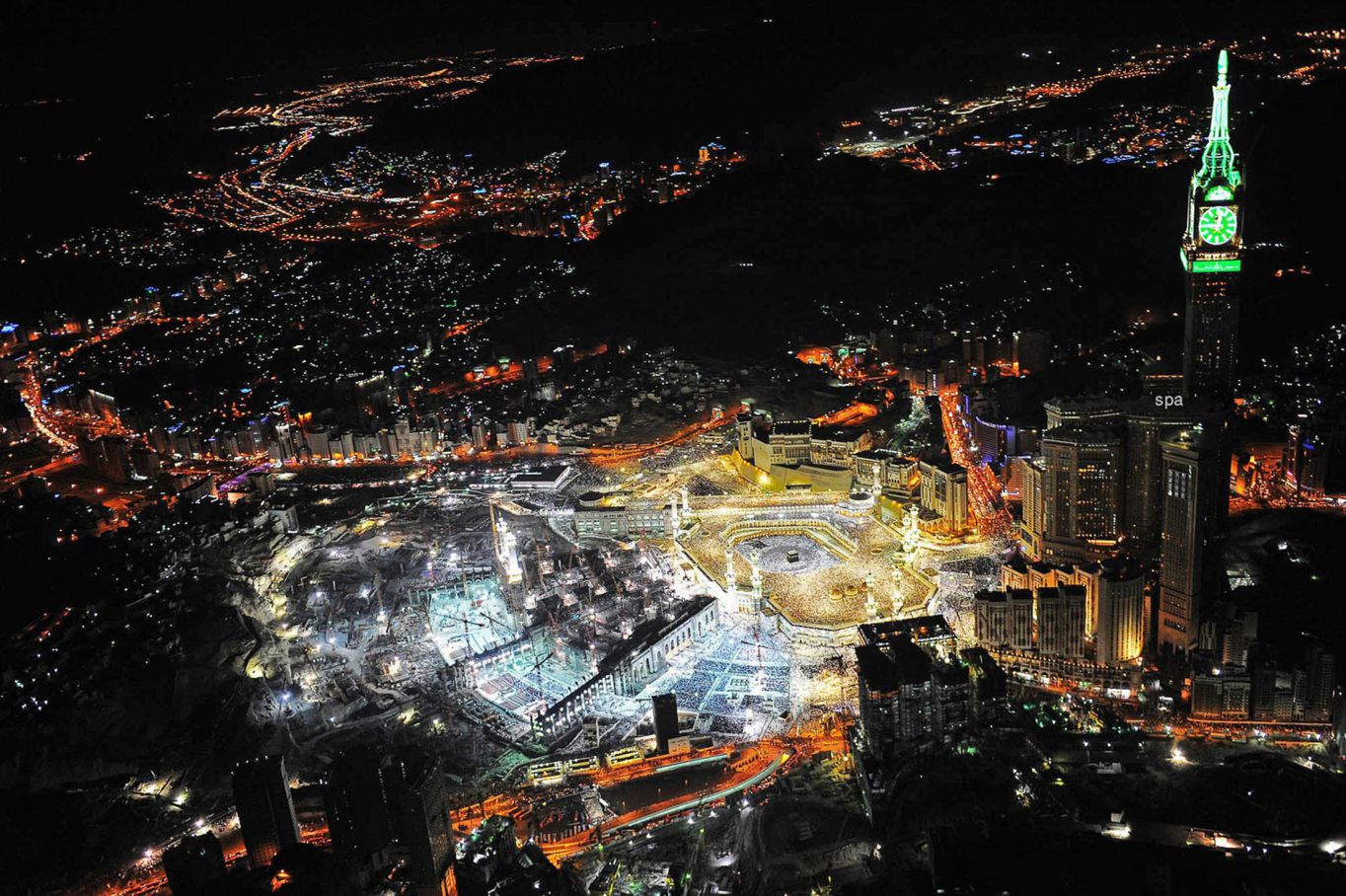
MASJID AL-HARAM AND THE KABAH
Now the pilgrim arrives at Masjid Al-Haram and the Kabah.
(The history of the Kabah was already discussed in Part 3.)
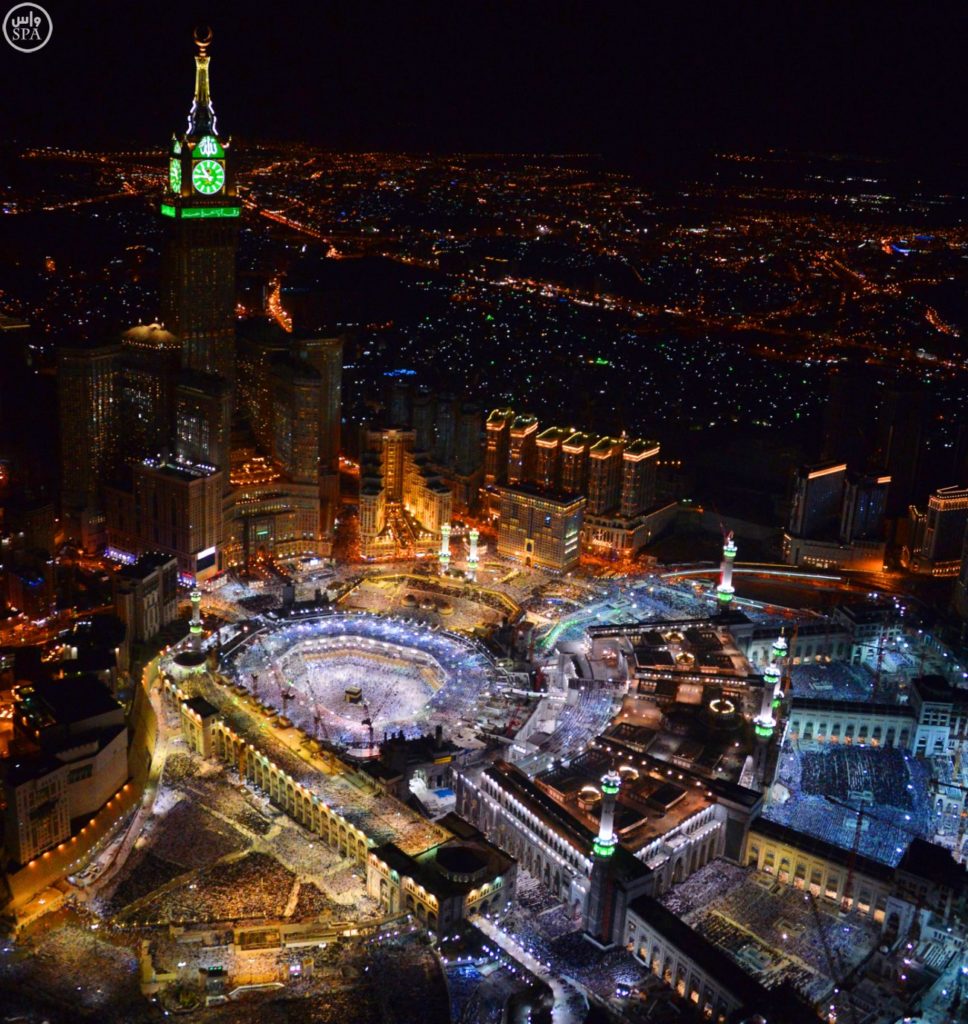
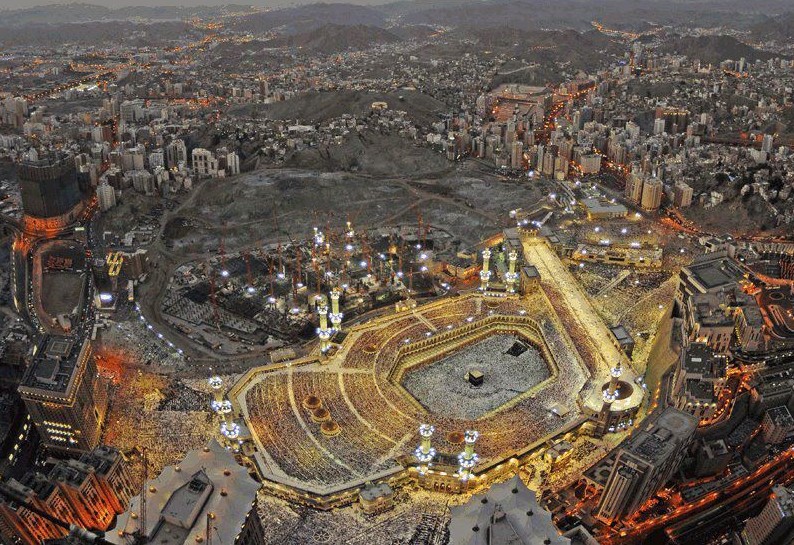
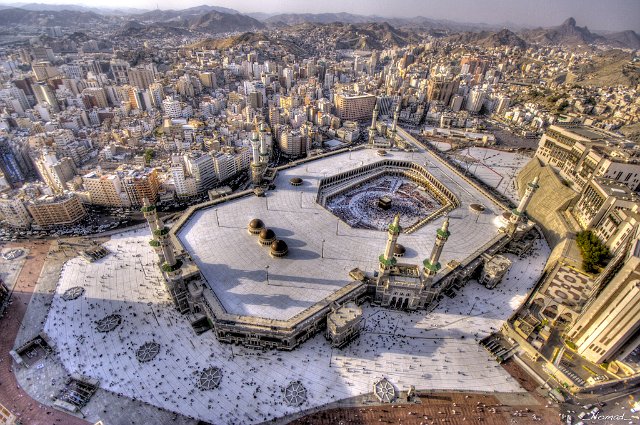
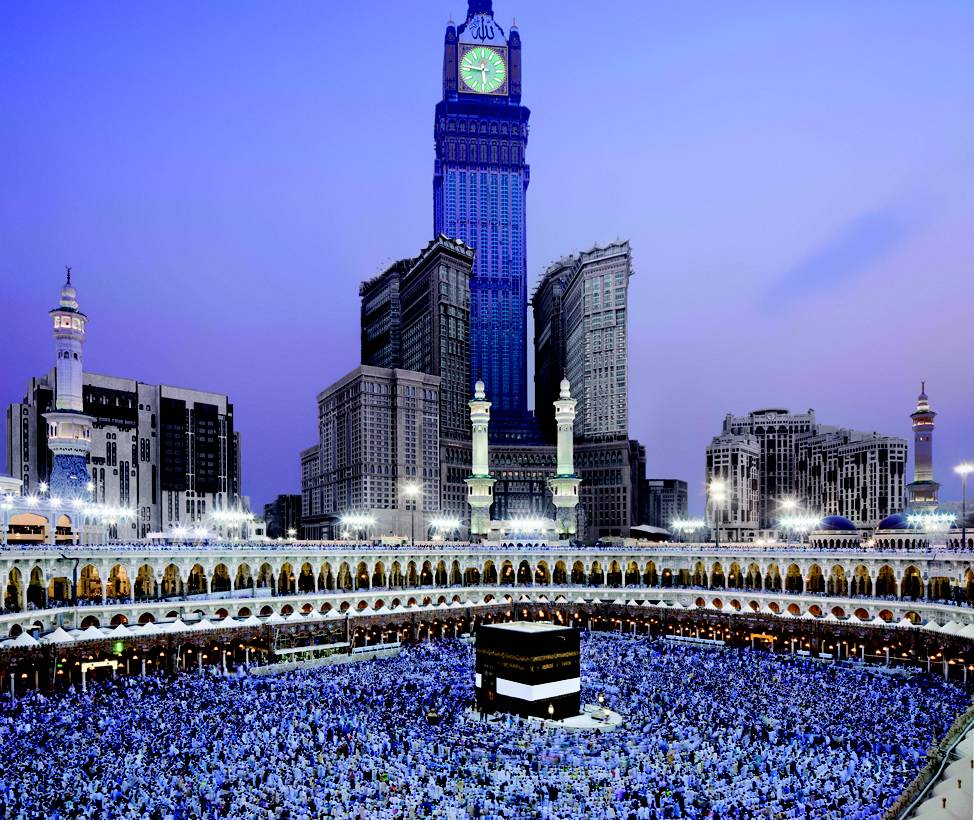
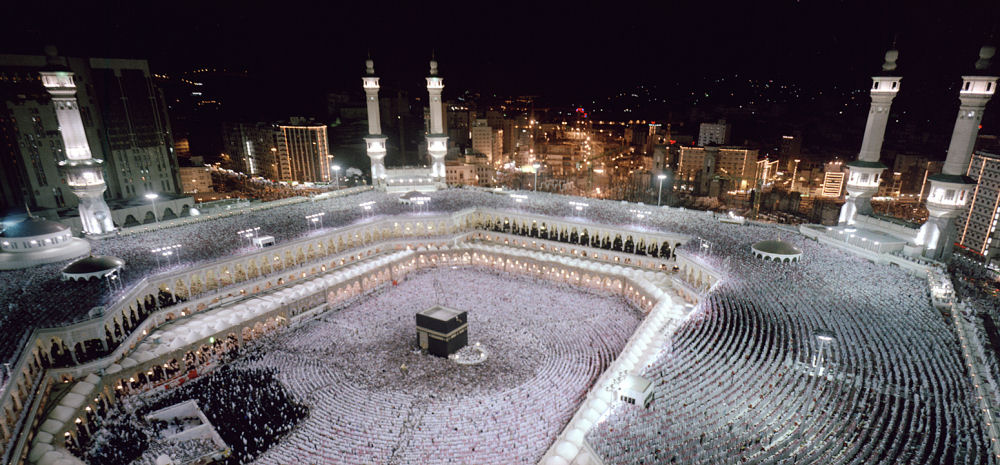
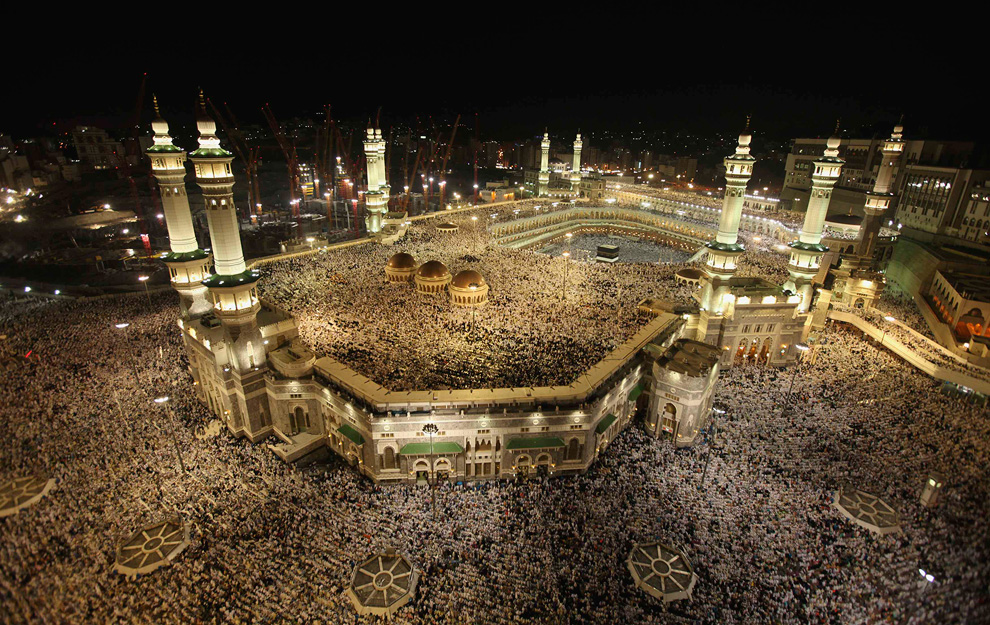
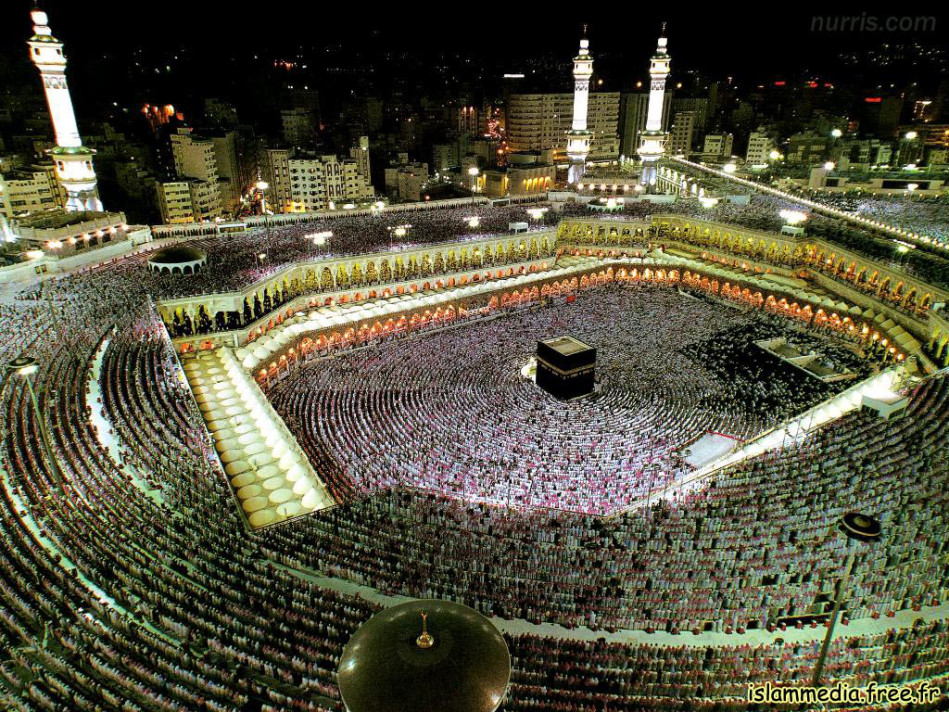
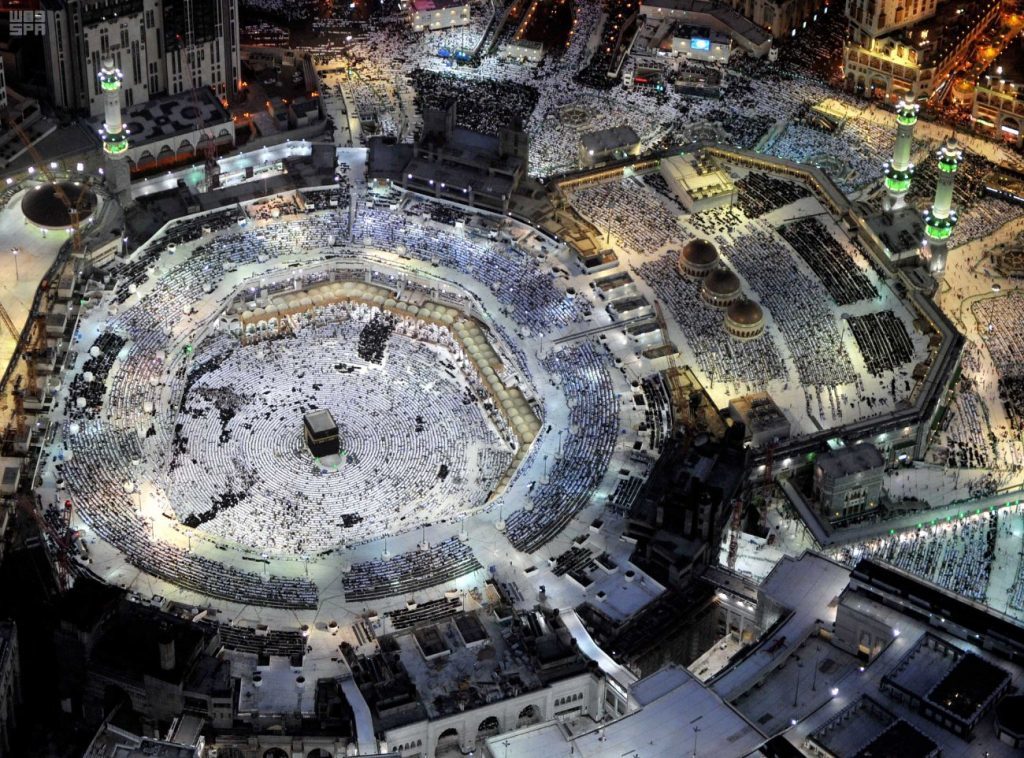
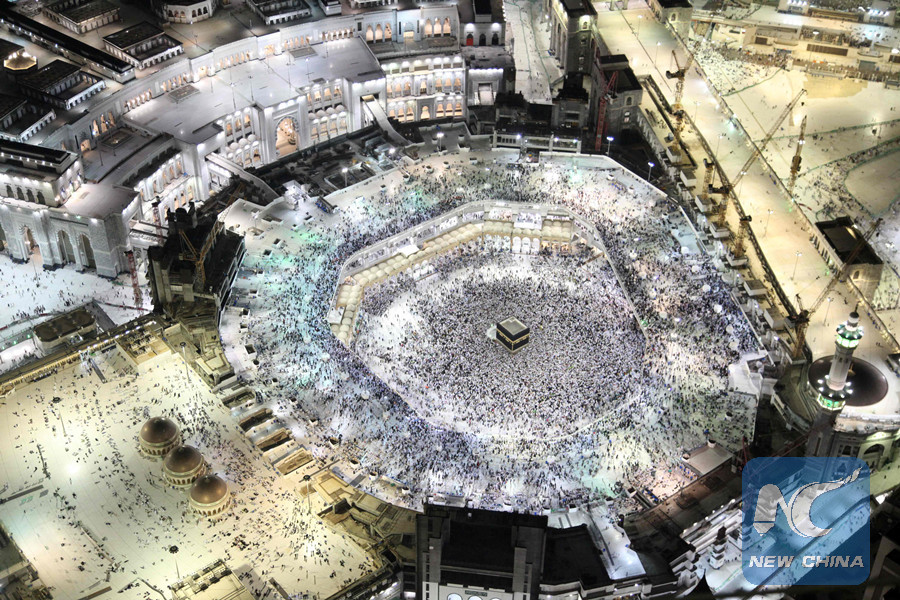
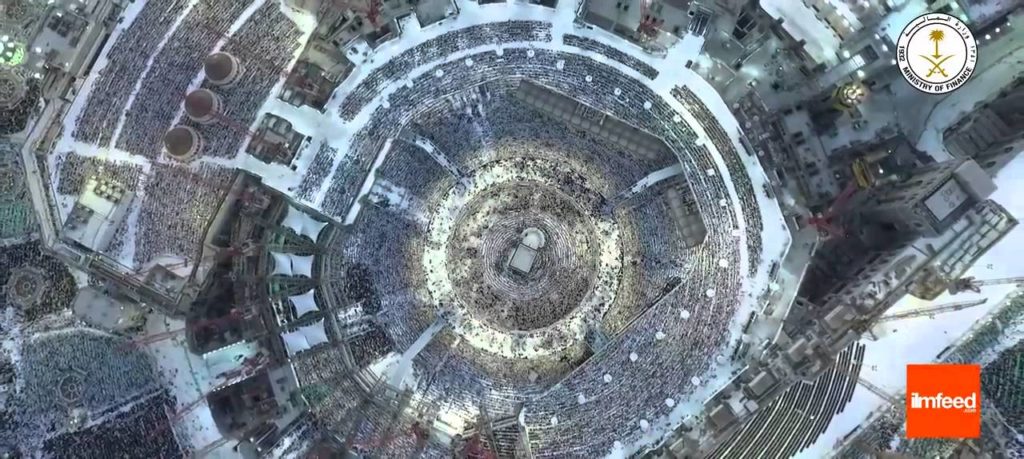
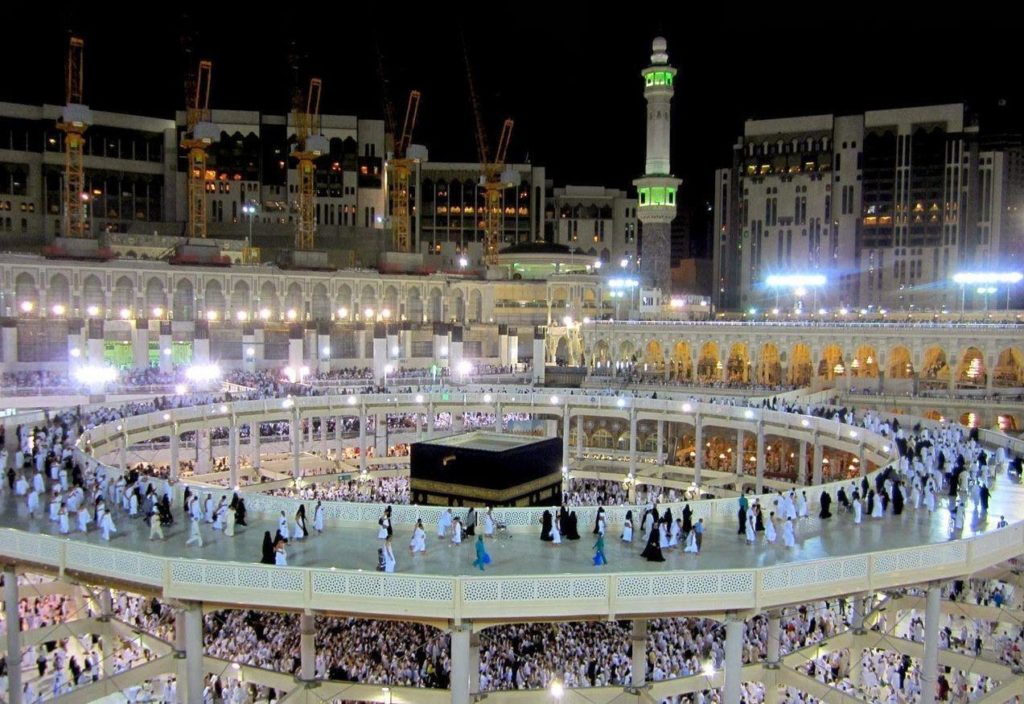
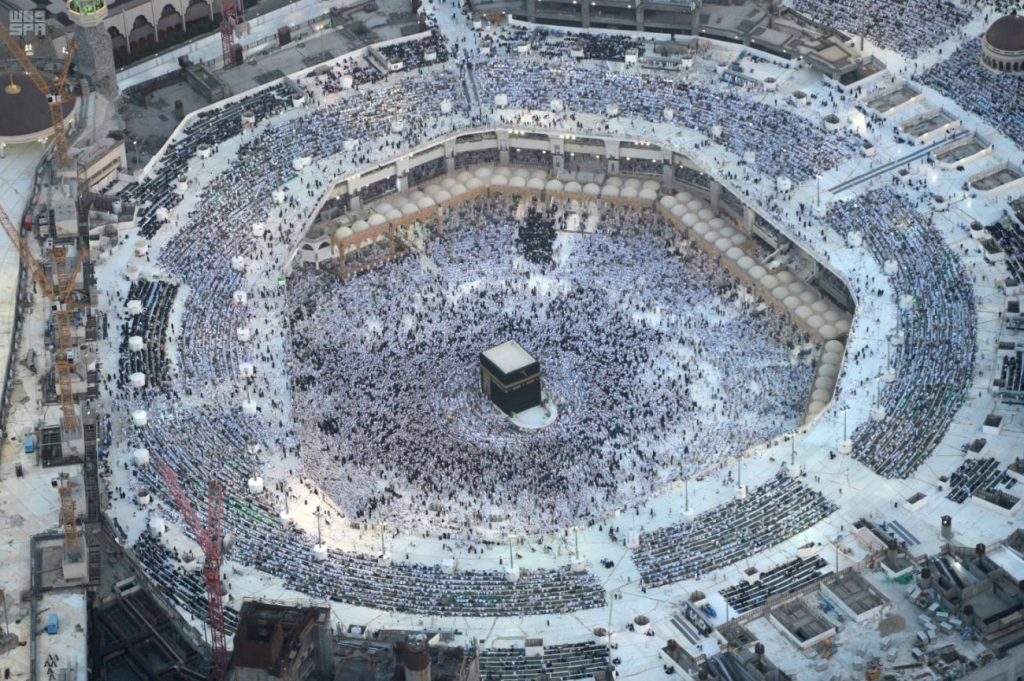
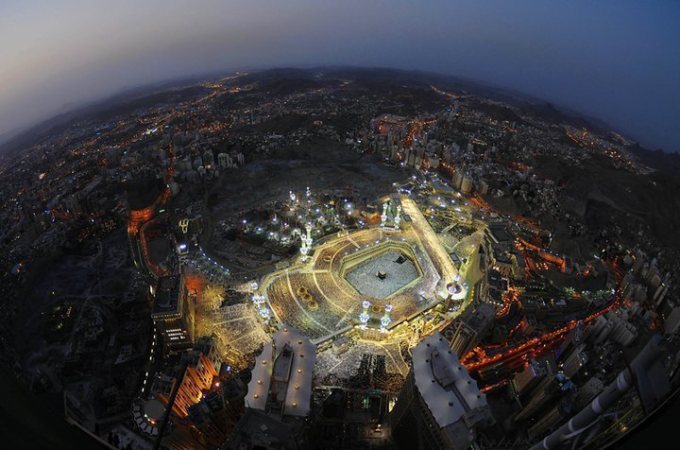
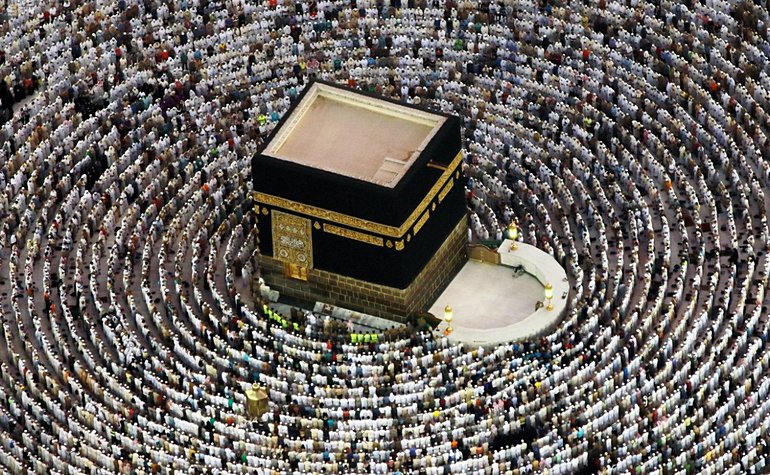
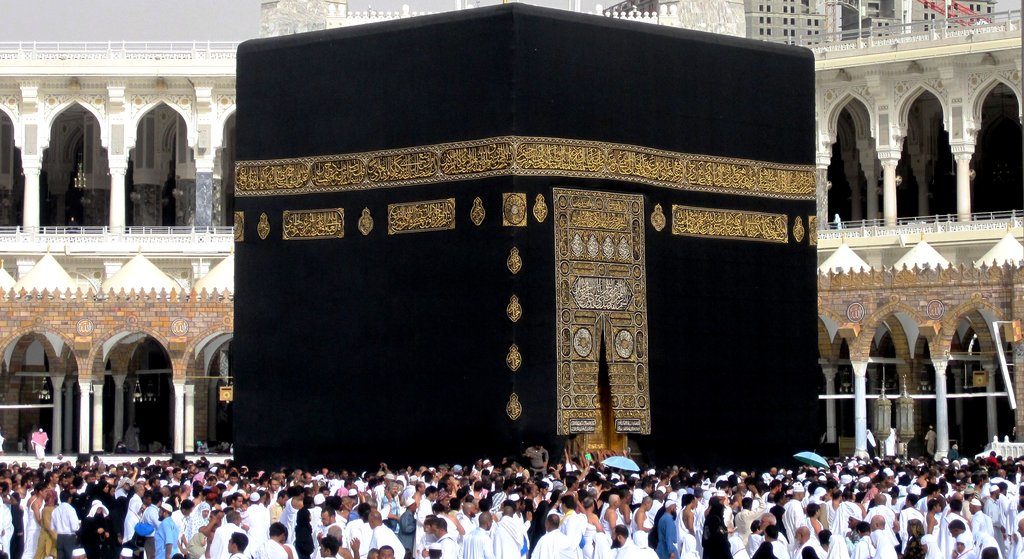
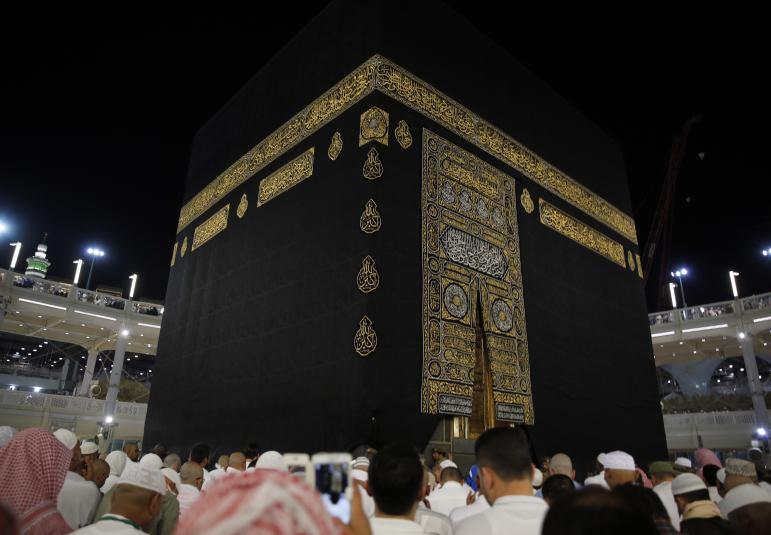
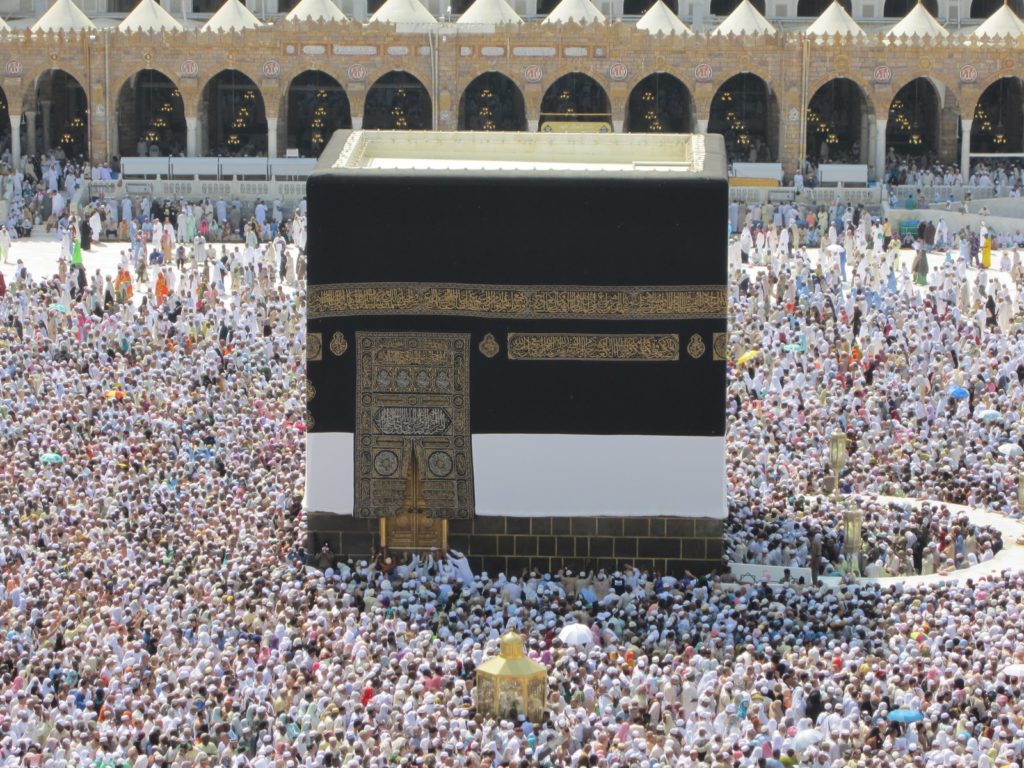
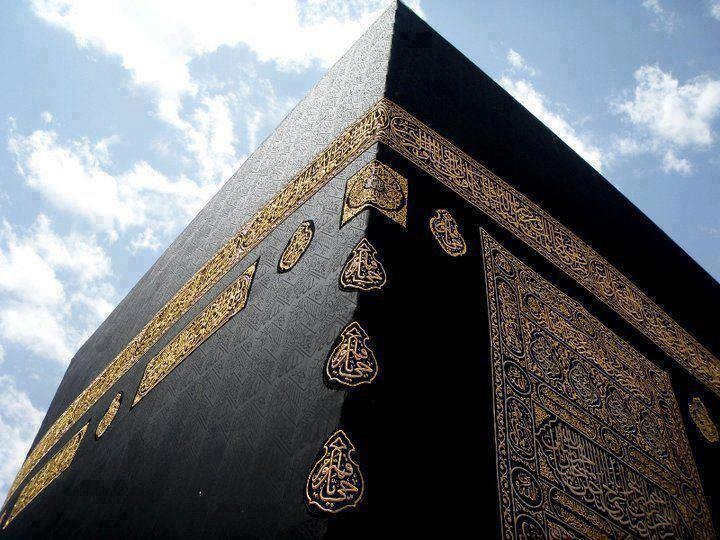
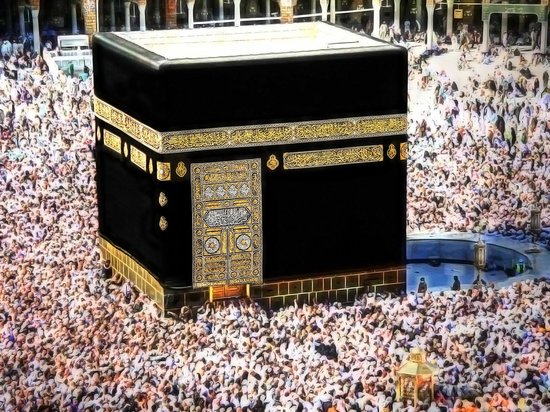
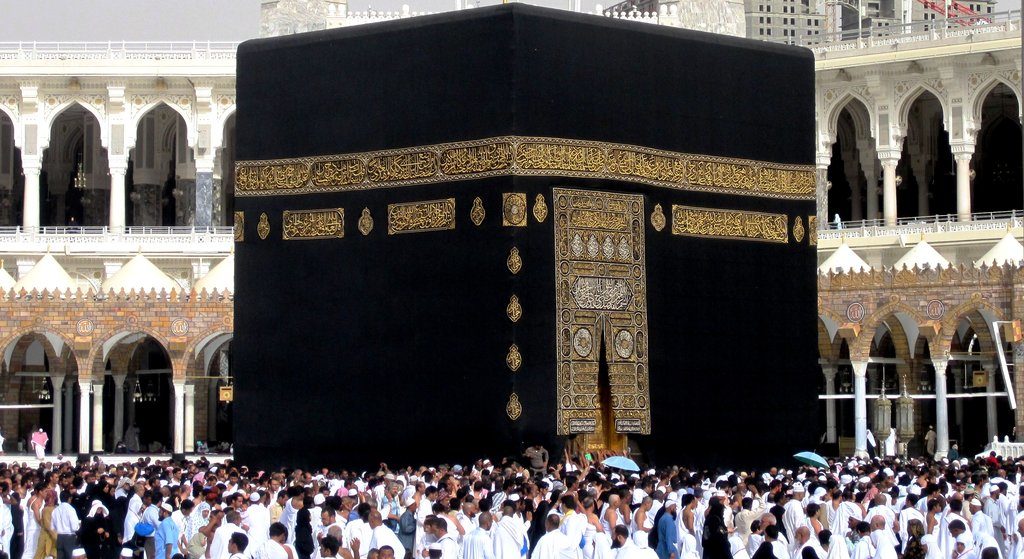
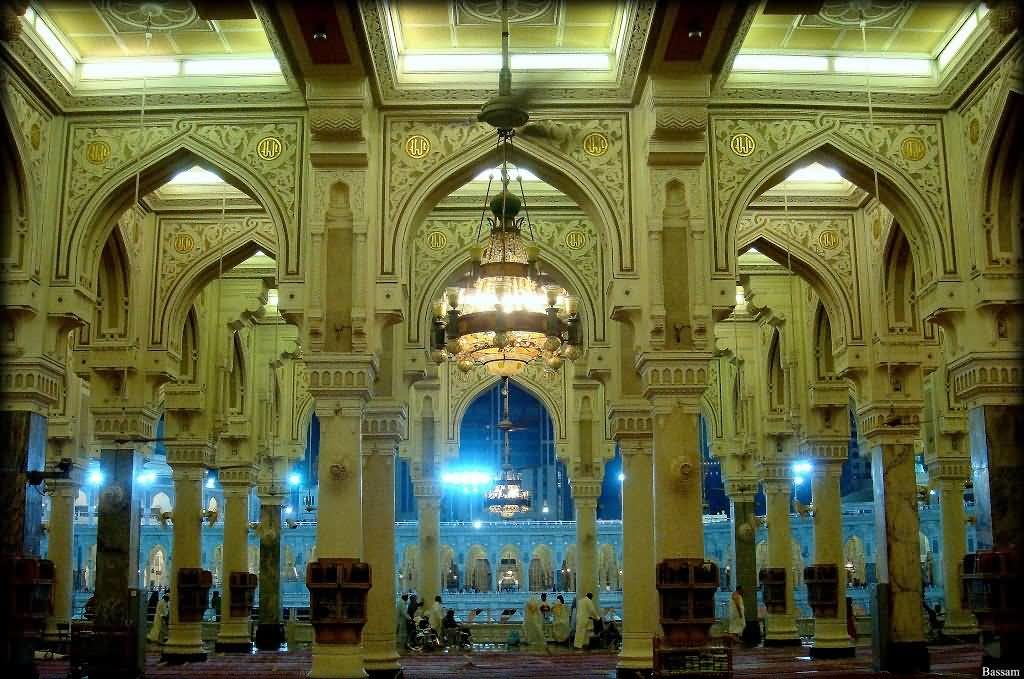
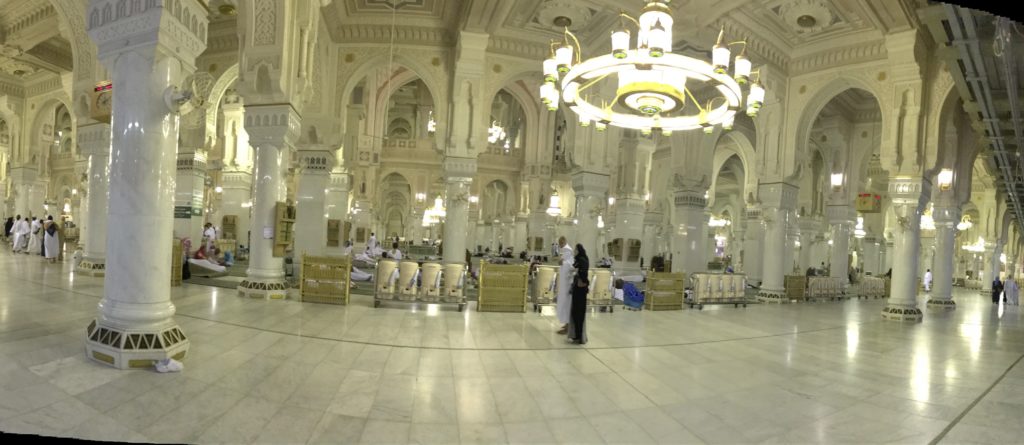
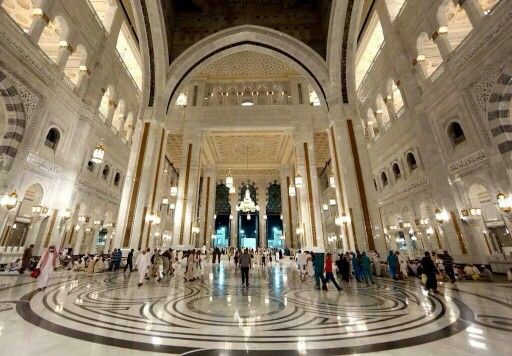
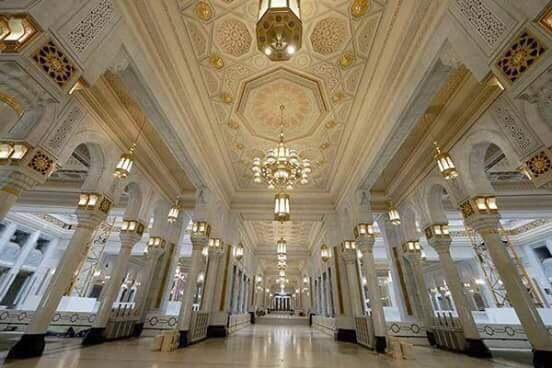

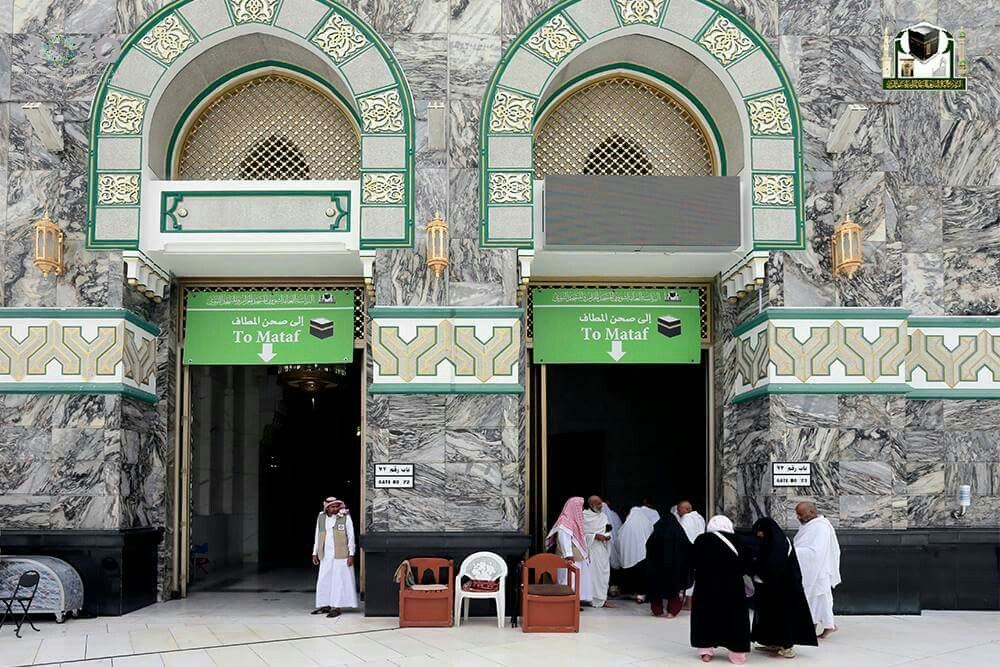
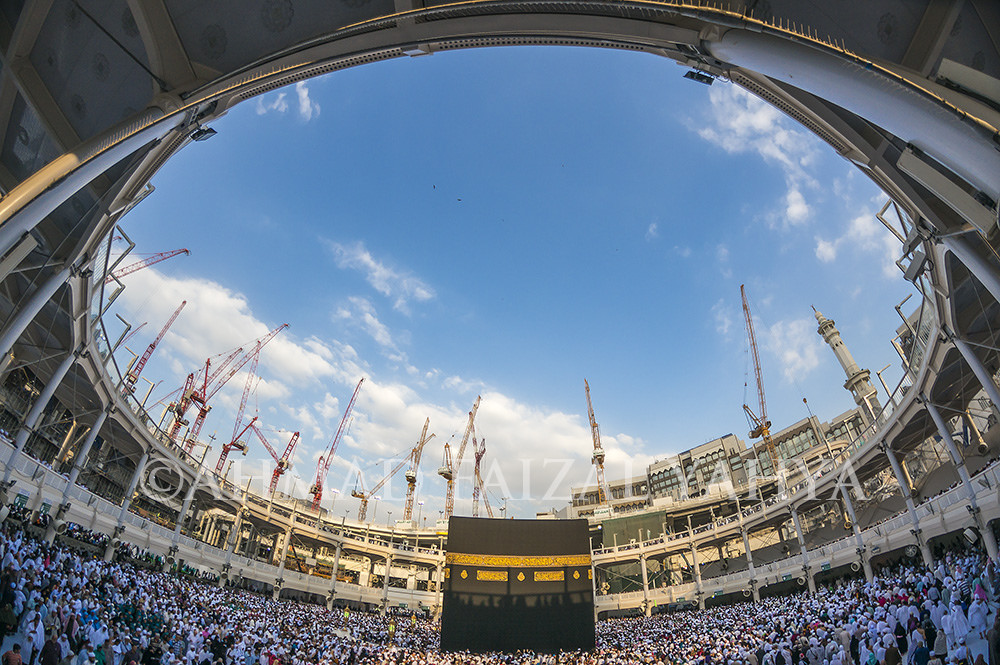
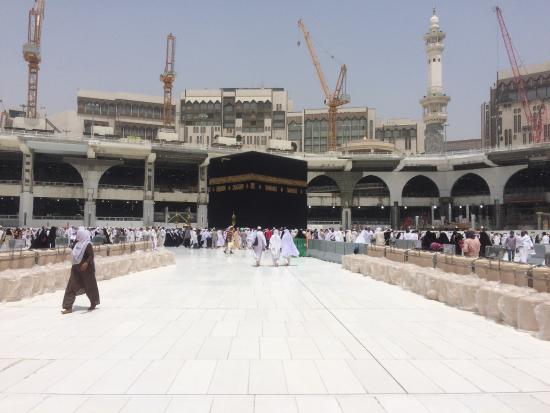
Virtues of Masjid Al-Haram and the Kabah
Before I list the virtues of Masjid Al-Haram, it’s important to understand that there is a difference of opinion over what constitutes “Masjid Al-Haram”. Is it just the masjid with the Kabah? Or the whole Haram? Or the whole of Makkah?
This article summaries the various opinions. In this series, I’ve followed the opinion that Masjid Al-Haram is the masjid with the Kabah.
-
It was the first house of worship on earth
إِنَّ أَوَّلَ بَيْتٍ وُضِعَ لِلنَّاسِ لَلَّذِي بِبَكَّةَ مُبَارَكًا وَهُدًى لِّلْعَالَمِينَ
فِيهِ آيَاتٌ بَيِّنَاتٌ مَّقَامُ إِبْرَاهِيمَ ۖ وَمَن دَخَلَهُ كَانَ آمِنًا ۗ وَلِلَّـهِ عَلَى النَّاسِ حِجُّ الْبَيْتِ مَنِ اسْتَطَاعَ إِلَيْهِ سَبِيلًا ۚ وَمَن كَفَرَ فَإِنَّ اللَّـهَ غَنِيٌّ عَنِ الْعَالَمِينَ
“Verily, the first House (of worship) appointed for mankind was that at Bakkah (Makkah), full of blessing, and a guidance for Al-Alameen (the mankind and jinns). In it are manifest signs (for example), the Maqam (place) of Ibrahim; whosoever enters it, he attains security. And Hajj (pilgrimage to Makkah) to the House (Kabah) is a duty that mankind owes to Allah, those who can afford the expenses (for one’s conveyance, provision and residence); and whoever disbelieves [i.e. denies Hajj (pilgrimage to Makkah), then he is a disbeliever of Allah], then Allah stands not in need of any of the Alameen (mankind and jinns).” [Surah Aal-Imran (3) : 96 – 97]
عَنْ أَبِي ذَرٍّ ، قَالَ: قُلْتُ: يَا رَسُولَ اللّهِ! أَيُّ مَسْجِدٍ وُضِعَ فِي الأَرْضِ أَوَّلاً؟ قَالَ: الْمَسْجِدُ الْحَرَامُ. قُلْتُ: ثُمَّ أَيٌّ؟ قَالَ: :الْمَسْجِدُ الأَقْصَى. قُلْتُ: كَمْ بَيْنَهُمَا؟ قَالَ: أَرْبَعُونَ سَنَةً، وَأَيْنَمَا أَدْرَكَتْكَ الصَّلاَةُ فَصَلِّ فَهُوَ مَسْجِدٌ. وَفِي حَدِيثِ أَبِي كَامِلٍ :ثُمَّ حَيْثُمَا أَدْرَكَتْكَ الصَّلاَةُ فَصَلِّهْ. فَإِنَّهُ مَسْجِدٌ
Abu Dharr (radiallahu anhu) reported: I said: Messenger of Allah, which masjid was set up first on the earth? He (sallallahu alaihi wasallam) said: Al-Masjid al-Haram. I (again) said: Then which next? He said: It was the Masjid Al-Aqsa. I (again) said: How long the space of time (between their setting up)? He (the Prophet) said: It was forty years. And whenever the time comes for prayer, pray there, for that is a mosque; and in the hadith transmitted by Abu Kamil (the words are):” Whenever time comes for prayer, pray, for that is a mosque (for you).” [Sahih Muslim, Hadeeth No. 1056]
2. It is a place of resort and safety
وَإِذْ جَعَلْنَا الْبَيْتَ مَثَابَةً لِّلنَّاسِ وَأَمْنًا وَاتَّخِذُوا مِن مَّقَامِ إِبْرَاهِيمَ مُصَلًّى ۖ وَعَهِدْنَا إِلَىٰ إِبْرَاهِيمَ وَإِسْمَاعِيلَ أَن طَهِّرَا بَيْتِيَ لِلطَّائِفِينَ وَالْعَاكِفِينَ وَالرُّكَّعِ السُّجُودِ
And (remember) when We made the House (the Kabah at Makkah) a place of resort for mankind and a place of safety. And take you (people) the Maqam (place) of Ibrahim [or the stone on which Ibrahim stood while he was building the Kabah] as a place of prayer (for some of your prayers, e.g. two Rakat after the Tawaf of the Kabah at Makkah), and We commanded Ibrahim and Ismail that they should purify My House (the Kaabah at Makkah) for those who are circumambulating it, or staying (Itikaf), or bowing or prostrating themselves (there, in prayer). [Surah Al-Baqarah (2) : 125]
جَعَلَ اللَّـهُ الْكَعْبَةَ الْبَيْتَ الْحَرَامَ قِيَامًا لِّلنَّاسِ وَالشَّهْرَ الْحَرَامَ وَالْهَدْيَ وَالْقَلَائِدَ ۚ ذَٰلِكَ لِتَعْلَمُوا أَنَّ اللَّـهَ يَعْلَمُ مَا فِي السَّمَاوَاتِ وَمَا فِي الْأَرْضِ وَأَنَّ اللَّـهَ بِكُلِّ شَيْءٍ عَلِيمٌ
Allah has made the Kabah, the Sacred House, an asylum of security and Hajj and Umrah (pilgrimage) for mankind, and also the Sacred Month and the animals of offerings and the garlanded (people or animals, etc. marked with the garlands on their necks made from the outer part of the stem of the Makkah trees for their security), that you may know that Allah has knowledge of all that is in the heavens and all that is in the earth, and that Allah is the All-Knower of each and everything.” [Surah Al-Maaidah (5) : 97]
إِنَّ أَوَّلَ بَيْتٍ وُضِعَ لِلنَّاسِ لَلَّذِي بِبَكَّةَ مُبَارَكًا وَهُدًى لِّلْعَالَمِينَ
فِيهِ آيَاتٌ بَيِّنَاتٌ مَّقَامُ إِبْرَاهِيمَ ۖ وَمَن دَخَلَهُ كَانَ آمِنًا ۗ وَلِلَّـهِ عَلَى النَّاسِ حِجُّ الْبَيْتِ مَنِ اسْتَطَاعَ إِلَيْهِ سَبِيلًا ۚ وَمَن كَفَرَ فَإِنَّ اللَّـهَ غَنِيٌّ عَنِ الْعَالَمِينَ
“Verily, the first House (of worship) appointed for mankind was that at Bakkah (Makkah), full of blessing, and a guidance for Al-Alameen (the mankind and jinns). In it are manifest signs (for example), the Maqam (place) of Ibrahim; whosoever enters it, he attains security. And Hajj (pilgrimage to Makkah) to the House (Kabah) is a duty that mankind owes to Allah, those who can afford the expenses (for one’s conveyance, provision and residence); and whoever disbelieves [i.e. denies Hajj (pilgrimage to Makkah), then he is a disbeliever of Allah], then Allah stands not in need of any of the Alameen (mankind and jinns).” [Surah Aal-Imran (3) : 96 – 97]
3. It is open to everyone
إِنَّ الَّذِينَ كَفَرُوا وَيَصُدُّونَ عَن سَبِيلِ اللَّـهِ وَالْمَسْجِدِ الْحَرَامِ الَّذِي جَعَلْنَاهُ لِلنَّاسِ سَوَاءً الْعَاكِفُ فِيهِ وَالْبَادِ ۚ وَمَن يُرِدْ فِيهِ بِإِلْحَادٍ بِظُلْمٍ نُّذِقْهُ مِنْ عَذَابٍ أَلِيمٍ
وَإِذْ بَوَّأْنَا لِإِبْرَاهِيمَ مَكَانَ الْبَيْتِ أَن لَّا تُشْرِكْ بِي شَيْئًا وَطَهِّرْ بَيْتِيَ لِلطَّائِفِينَ وَالْقَائِمِينَ وَالرُّكَّعِ السُّجُودِ
Verily! Those who disbelieve and hinder (men) from the Path of Allah, and from Al-Masjid Al-Haram (at Makkah) which We have made (open) to (all) men, the dweller in it and the visitor from the country are equal there [as regards its sanctity and pilgrimage (Hajj and Umrah)]. And whoever inclines to evil actions therein or to do wrong (i.e. practice polytheism and leave Islamic Monotheism), him We shall cause to taste a painful torment.
And (remember) when We showed Ibrahim the site of the (Sacred) House (the Kabah at Makkah) (saying): “Associate not anything (in worship) with Me, and sanctify My House for those who circumambulate it, and those who stand up for prayer, and those who bow (submit themselves with humility and obedience to Allah), and make prostration (in prayer, etc.);” [Surah Al-Hajj (22) : 25 – 26]
4. It is permitted to set out on a journey to visit it
عن أبي هريرةَ رضيَ اللَّهُ عنهُ عنِ النبي صلى الله عليه وسلّم قال: لا تُشَدُّ الرِّحالُ إلاّ إلى ثلاثةِ مَساجِدَ: المسجدِ الحرامِ، ومسجدِ الرسول صلى الله عليه وسلّم ومسجد الأقصى
Narrated Abu Hurairah (radiallahu anhu): The Prophet (sallallahu alaihi wasallam) said, “Do not set out on a journey except for three masjids i.e. Al-Masjid-AI-Haram, the Masjid of Allah’s Messenger (sallallahu alaihi wasallam), and the Masjid Al-Aqsa, (Masjid of Jerusalem).” [Sahih Bukhari, Volume 2, Hadeeth No. 281]
5. Prayer in it is has more reward
عَنْ أَبِي هُرَيْرَةَ ، قَالَ: قَالَ رَسُولُ اللّهِ صلى الله عليه وسلم: صَلاَةٌ فِي مَسْجِدِي هَـذَا، خَيْرٌ مِنْ أَلْفِ صَلاَةٍ فِي غَيْرِهِ مِنَ الْمَسَاجِدِ، إِلاَّ الْمَسْجِدِ الْحَرَامَ
Abu Hurairah (radiallahu anhu) reported Allah’s Messenger (sallallahu alaihi wasallam) as saying: Prayer in my masjid is more excellent than a thousand prayers observed in other masjids except the Masjid al- Haram. [Sahih Muslim, Hadeeth No. 3210]
عَنْ جَابِرٍ، أَنَّ رَسُولَ اللَّهِ ـ صلى الله عليه وسلم ـ قَالَ : صَلاَةٌ فِي مَسْجِدِي أَفْضَلُ مِنْ أَلْفِ صَلاَةٍ فِيمَا سِوَاهُ إِلاَّ الْمَسْجِدَ الْحَرَامَ وَصَلاَةٌ فِي الْمَسْجِدِ الْحَرَامِ أَفْضَلُ مِنْ مِائَةِ أَلْفِ صَلاَةٍ فِيمَا سِوَاهُ
It was narrated from Jabir (radiallahu anhu) that the Messenger of Allah (sallallahu alaihi wasallam) said: “One prayer in my masjid is better than one thousand prayers elsewhere, except Masjid Al-Haram, and one prayer in Masjid Al-Haram is better than one hundred thousand prayers elsewhere.” [Sunan Ibn Majah, Hadeeth No. 1406. Graded “sahih” (authentic) by Al-Albani.]
6. Allah has referred to Himself as the Lord of this House
فَلْيَعْبُدُوا رَبَّ هَـٰذَا الْبَيْتِ
So let them worship (Allah) the Lord of this House (the Kabah in Makkah). [Surah Quraish (106) : 3]
He also referred to it as His House.
وَإِذْ جَعَلْنَا الْبَيْتَ مَثَابَةً لِّلنَّاسِ وَأَمْنًا وَاتَّخِذُوا مِن مَّقَامِ إِبْرَاهِيمَ مُصَلًّى ۖ وَعَهِدْنَا إِلَىٰ إِبْرَاهِيمَ وَإِسْمَاعِيلَ أَن طَهِّرَا بَيْتِيَ لِلطَّائِفِينَ وَالْعَاكِفِينَ وَالرُّكَّعِ السُّجُودِ
And (remember) when We made the House (the Kabah at Makkah) a place of resort for mankind and a place of safety. And take you (people) the Maqam (place) of Ibrahim [or the stone on which Ibrahim stood while he was building the Kabah] as a place of prayer (for some of your prayers, e.g. two Rakat after the Tawaf of the Kabah at Makkah), and We commanded Ibrahim and Ismail that they should purify My House (the Kaabah at Makkah) for those who are circumambulating it, or staying (Itikaf), or bowing or prostrating themselves (there, in prayer). [Surah Al-Baqarah (2) : 125]
وَإِذْ بَوَّأْنَا لِإِبْرَاهِيمَ مَكَانَ الْبَيْتِ أَن لَّا تُشْرِكْ بِي شَيْئًا وَطَهِّرْ بَيْتِيَ لِلطَّائِفِينَ وَالْقَائِمِينَ وَالرُّكَّعِ السُّجُودِ
And (remember) when We showed Ibrahim the site of the (Sacred) House (the Kabah at Makkah) (saying): “Associate not anything (in worship) with Me, and sanctify My House for those who circumambulate it, and those who stand up for prayer, and those who bow (submit themselves with humility and obedience to Allah), and make prostration (in prayer, etc.);” [Surah Al-Hajj (22) : 26]
7. It is the Qiblah
Masjid Al-Haram is the direction of prayer for all Muslims. Facing it during prayer is one of the conditions of prayer.
سَيَقُولُ السُّفَهَاءُ مِنَ النَّاسِ مَا وَلَّاهُمْ عَن قِبْلَتِهِمُ الَّتِي كَانُوا عَلَيْهَا ۚ قُل لِّلَّـهِ الْمَشْرِقُ وَالْمَغْرِبُ ۚ يَهْدِي مَن يَشَاءُ إِلَىٰ صِرَاطٍ مُّسْتَقِيمٍ
وَكَذَٰلِكَ جَعَلْنَاكُمْ أُمَّةً وَسَطًا لِّتَكُونُوا شُهَدَاءَ عَلَى النَّاسِ وَيَكُونَ الرَّسُولُ عَلَيْكُمْ شَهِيدًا ۗ وَمَا جَعَلْنَا الْقِبْلَةَ الَّتِي كُنتَ عَلَيْهَا إِلَّا لِنَعْلَمَ مَن يَتَّبِعُ الرَّسُولَ مِمَّن يَنقَلِبُ عَلَىٰ عَقِبَيْهِ ۚ وَإِن كَانَتْ لَكَبِيرَةً إِلَّا عَلَى الَّذِينَ هَدَى اللَّـهُ ۗ وَمَا كَانَ اللَّـهُ لِيُضِيعَ إِيمَانَكُمْ ۚ إِنَّ اللَّـهَ بِالنَّاسِ لَرَءُوفٌ رَّحِيمٌ
قَدْ نَرَىٰ تَقَلُّبَ وَجْهِكَ فِي السَّمَاءِ ۖ فَلَنُوَلِّيَنَّكَ قِبْلَةً تَرْضَاهَا ۚ فَوَلِّ وَجْهَكَ شَطْرَ الْمَسْجِدِ الْحَرَامِ ۚ وَحَيْثُ مَا كُنتُمْ فَوَلُّوا وُجُوهَكُمْ شَطْرَهُ ۗ وَإِنَّ الَّذِينَ أُوتُوا الْكِتَابَ لَيَعْلَمُونَ أَنَّهُ الْحَقُّ مِن رَّبِّهِمْ ۗ وَمَا اللَّـهُ بِغَافِلٍ عَمَّا يَعْمَلُونَ
The fools (pagans, hypocrites, and Jews) among the people will say, “What has turned them (Muslims) from their Qiblah [prayer direction (towards Jerusalem)] to which they were used to face in prayer.” Say, (O Muhammad ) “To Allah belong both, east and the west. He guides whom He wills to a Straight Way.”
Thus We have made you [true Muslims – real believers of Islamic Monotheism, true followers of Prophet Muhammad and his Sunnah (legal ways)], a Wasat (just) (and the best) nation, that you be witnesses over mankind and the Messenger (Muhammad) be a witness over you. And We made the Qiblah (prayer direction towards Jerusalem) which you used to face, only to test those who followed the Messenger (Muhammad) from those who would turn on their heels (i.e. disobey the Messenger). Indeed it was great (heavy) except for those whom Allah guided. And Allah would never make your faith (prayers) to be lost (i.e. your prayers offered towards Jerusalem). Truly, Allah is full of kindness, the Most Merciful towards mankind.
Verily! We have seen the turning of your (Muhammad’s) face towards the heaven. Surely, We shall turn you to a Qiblah (prayer direction) that shall please you, so turn your face in the direction of Al-Masjid- al-Haram (at Makkah). And wheresoever you people are, turn your faces (in prayer) in that direction. Certainly, the people who were given the Scriptures (i.e. Jews and the Christians) know well that, that (your turning towards the direction of the Kabah at Makkah in prayers) is the truth from their Lord. And Allah is not unaware of what they do. [Surah Al-Baqarah (2) : 142 – 144]
وَمِنْ حَيْثُ خَرَجْتَ فَوَلِّ وَجْهَكَ شَطْرَ الْمَسْجِدِ الْحَرَامِ ۖ وَإِنَّهُ لَلْحَقُّ مِن رَّبِّكَ ۗ وَمَا اللَّـهُ بِغَافِلٍ عَمَّا تَعْمَلُونَ
وَمِنْ حَيْثُ خَرَجْتَ فَوَلِّ وَجْهَكَ شَطْرَ الْمَسْجِدِ الْحَرَامِ ۚ وَحَيْثُ مَا كُنتُمْ فَوَلُّوا وُجُوهَكُمْ شَطْرَهُ لِئَلَّا يَكُونَ لِلنَّاسِ عَلَيْكُمْ حُجَّةٌ إِلَّا الَّذِينَ ظَلَمُوا مِنْهُمْ فَلَا تَخْشَوْهُمْ وَاخْشَوْنِي وَلِأُتِمَّ نِعْمَتِي عَلَيْكُمْ وَلَعَلَّكُمْ تَهْتَدُونَ
And from wheresoever you start forth (for prayers), turn your face in the direction of Al-Masjid-al-Haram (at Makkah), that is indeed the truth from your Lord. And Allah is not unaware of what you do.
And from wheresoever you start forth (for prayers), turn your face in the direction of Al-Masjid-al-Haram (at Makkah), and wheresoever you are, turn your faces towards, it (when you pray) so that men may have no argument against you except those of them that are wrong-doers, so fear them not, but fear Me! – And so that I may complete My Blessings on you and that you may be guided. [Surah Al-Baqarah (2) : 149 – 150]
عَنْ ابْن عَبَّاسٍ، قَالَ لَمَّا دَخَلَ النَّبِيُّ صلى الله عليه وسلم الْبَيْتَ دَعَا فِي نَوَاحِيهِ كُلِّهَا، وَلَمْ يُصَلِّ حَتَّى خَرَجَ مِنْهُ، فَلَمَّا خَرَجَ رَكَعَ رَكْعَتَيْنِ فِي قُبُلِ الْكَعْبَةِ وَقَالَ : هَذِهِ الْقِبْلَةُ
Narrated Ibn Abbas (radiallahu anhuma): When the Prophet (sallallahu alaihi wasallam) entered the Kabah, he invoked Allah in each and every side of it and did not pray till he came out of it, and offered a two rakah prayer facing the Kabah and said, “This is the Qiblah.” [Sahih Al-Bukhari, Volume 1, Hadeeth No. 391]
Please note that there are certain rules associated with the Qiblah.
عَنْ أَبِي أَيُّوبَ الأَنْصَارِيِّ، قَالَ قَالَ رَسُولُ اللَّهِ صلى الله عليه وسلم : إِذَا أَتَى أَحَدُكُمُ الْغَائِطَ فَلاَ يَسْتَقْبِلِ الْقِبْلَةَ وَلاَ يُوَلِّهَا ظَهْرَهُ، شَرِّقُوا أَوْ غَرِّبُوا
Narrated Abu Ayub Al-Ansari (radiallahu anhu): Allah’s Messenger (sallallahu alaihi wasallam) said, “If anyone of you goes to defecate he should neither face nor turn his back towards the Qibla; he should either face the east or the west.” [Sahih Al-Bukhari, Volume 1, Hadeeth No. 146]
:عَنْ أَبِي هُرَيْرَةَ ، قَالَ: قَالَ رَسُولُ اللّهِ صلى الله عليه وسلم
من لم يستقبلِ القِبلةَ ، و لم يستدْبِرْها في الغائطِ كُتِبَ له حسنةٌ ، و مُحِيَ عنه سيئةٌ
Abu Hurairah (radiallahu anhu) narrated that the Messenger of Allah (sallallahu alaihi wasallam) said: “Whoever does not face the Qiblah while relieving himself, nor turn his back to it, a good deed will be written for him and an evil deed will be removed from him (i.e. his record).” [Sahih At-Targheeb Wat-Tarheeb, Hadeeth No. 151]
عَنْ زِرِّ بْنِ حُبَيْشٍ، عَنْ حُذَيْفَةَ، أَظُنُّهُ عَنْ رَسُولِ اللَّهِ صلى الله عليه وسلم قَالَ : مَنْ تَفَلَ تِجَاهَ الْقِبْلَةِ جَاءَ يَوْمَ الْقِيَامَةِ تَفْلُهُ بَيْنَ عَيْنَيْهِ وَمَنْ أَكَلَ مِنْ هَذِهِ الْبَقْلَةِ الْخَبِيثَةِ فَلاَ يَقْرَبَنَّ مَسْجِدَنَا . ثَلاَثًا .
It was narrated from Zirr ibn Hubaysh from Hudhaifah (radiallahu anhu) – I think from the Messenger of Allah (sallallahu alaihi wasallam) – that he said:”Whoever spits in the direction of the Qiblah will come on the Day of Resurrection with his saliva between his eyes; and he who eats of this foul vegetable (i.e. garlic) should not come near our masjid. And he said it three times. [Sunan Abee Dawood, Hadeeth No. 3824. Graded “sahih” (authentic) by Al-Albani.]
8. Hearts are attached to it
وَإِذْ جَعَلْنَا الْبَيْتَ مَثَابَةً لِّلنَّاسِ وَأَمْنًا وَاتَّخِذُوا مِن مَّقَامِ إِبْرَاهِيمَ مُصَلًّى ۖ وَعَهِدْنَا إِلَىٰ إِبْرَاهِيمَ وَإِسْمَاعِيلَ أَن طَهِّرَا بَيْتِيَ لِلطَّائِفِينَ وَالْعَاكِفِينَ وَالرُّكَّعِ السُّجُودِ
And (remember) when We made the House (the Kabah at Makkah) a place of resort for mankind and a place of safety. And take you (people) the Maqam (place) of Ibrahim [or the stone on which Ibrahim stood while he was building the Kabah] as a place of prayer (for some of your prayers, e.g. two Rakah after the Tawaf of the Kabah at Makkah), and We commanded Ibrahim and Ismail that they should purify My House (the Kabah at Makkah) for those who are circumambulating it, or staying (Itikaf), or bowing or prostrating themselves (there, in prayer). [Surah Al-Baqarah (2) : 125]
Ibn Kathir stated in his explanation of this verse:
“Al-Awfi reported that Ibn Abbas commented on Allah’s statement,
﴿وَإِذْ جَعَلْنَا الْبَيْتَ مَثَابَةً لِّلنَّاسِ﴾
(And (remember) when We made the House (the Kabah at Makkah) a place of resort for mankind) “They do not remain in the House, they only visit it and return to their homes, and then visit it again.” Also, Abu Jafar Ar-Razi narrated from Ar-Rabi bin Anas from Abu Al-Aliyah who said that,
﴿وَإِذْ جَعَلْنَا الْبَيْتَ مَثَابَةً لِّلنَّاسِ وَأَمْناً﴾
(And (remember) when We made the House (the Kabah at Makkah) a place of resort for mankind and a place of safety) means, “Safe from enemies and armed conflict. During the time of Jahiliyyah, the people were often victims of raids and kidnapping, while the people in the area surrounding it (Al-Masjid Al-Haram) were safe and not subject to kidnapping.” Also, Mujahid, Ata, As-Suddi, Qatadah and Ar-Rabi bin Anas were reported to have said that the Ayah (2:125) means, “Whoever enters it shall be safe.”
This Ayah indicates that Allah honored the Sacred House, which Allah made as a safe refuge and safe haven. Therefore, the souls are eager, but never bored, to conduct short visits to the House, even every year. This is because Allah accepted the supplication of His Khalil, Ibrahim, when he asked Allah to make the hearts of people eager to visit the House. Ibrahim said (14:40),
﴿رَبَّنَا وَتَقَبَّلْ دُعَآءِ﴾
(Our Lord! And accept my invocation).”
وَإِذْ قَالَ إِبْرَاهِيمُ رَبِّ اجْعَلْ هَـٰذَا الْبَلَدَ آمِنًا وَاجْنُبْنِي وَبَنِيَّ أَن نَّعْبُدَ الْأَصْنَامَ
رَبِّ إِنَّهُنَّ أَضْلَلْنَ كَثِيرًا مِّنَ النَّاسِ ۖ فَمَن تَبِعَنِي فَإِنَّهُ مِنِّي ۖ وَمَنْ عَصَانِي فَإِنَّكَ غَفُورٌ رَّحِيمٌ
رَّبَّنَا إِنِّي أَسْكَنتُ مِن ذُرِّيَّتِي بِوَادٍ غَيْرِ ذِي زَرْعٍ عِندَ بَيْتِكَ الْمُحَرَّمِ رَبَّنَا لِيُقِيمُوا الصَّلَاةَ فَاجْعَلْ أَفْئِدَةً مِّنَ النَّاسِ تَهْوِي إِلَيْهِمْ وَارْزُقْهُم مِّنَ الثَّمَرَاتِ لَعَلَّهُمْ يَشْكُرُونَ
And (remember) when Ibrahim said: “O my Lord! Make this city (Makkah) one of peace and security, and keep me and my sons away from worshipping idols.
“O my Lord! They have indeed led astray many among mankind. But whosoever follows me, he verily is of me. And whosoever disobeys me, – still You are indeed Oft-Forgiving, Most Merciful.
“O our Lord! I have made some of my offspring to dwell in an uncultivable valley by Your Sacred House (the Kabah at Makkah); in order, O our Lord, that they may perform As-Salaat (Iqaamat-as-Salaat), so fill some hearts among men with love towards them, and (O Allah) provide them with fruits so that they may give thanks. [Surah Ibrahim (14) : 35-37]
Shaikh Abdul Azeez Aal Ash-Shaikh stated regarding the above supplication of Ibrahim (alaihissalaam):
“Thus, Ibrahim (peace be upon him) beseeched his Lord (Exalted and Glorified be He) to make his offspring worship Allah Alone and observe Salah (Prayer), which is one of the most devout and best acts of worship. He also supplicated to Allah to make hearts attached to his offspring – that is, to make people love them and love the place where his offspring dwelled. Allah (Exalted and Glorified be He) answered the supplication of his Khalil (beloved, close elect) Ibrahim (peace be upon him); He produced from the offspring of Ismail (peace be upon him) Prophet Muhammad (peace be upon him), the best of Prophets and Messengers, and the Imam of monotheists, who called to the religion of Islam and the creed of Ibrahim (peace be upon him). People answered the call and established Salah. Allah also commanded mankind to make Hajj to this Sacred House of His. Allah (Exalted and Glorified be He) placed an amazing secret in this House that attracts people’s hearts to it. People make pilgrimage to it and never tire of visiting it; thus, the more the believers visit it the more they long for it and yearn to do it again and again. Allah (Exalted be He) has also made Makkah a safe place where people find all types of fruits and provisions. in Makkah you find provisions and sustenance are available at all times. This all is an answer to the supplication of Allah’s Khalil, Ibrahim (peace be upon him) and a favor bestowed by Him (Exalted and Glorified be He) on this Sacred City (Makkah) and its people.”
9. The Prophet’s (sallallahu alaihi wasallam) Night Journey started from here
The Night Journey (Al-Israa) started from Masjid Al-Haram.
سُبْحَانَ الَّذِي أَسْرَىٰ بِعَبْدِهِ لَيْلًا مِّنَ الْمَسْجِدِ الْحَرَامِ إِلَى الْمَسْجِدِ الْأَقْصَى الَّذِي بَارَكْنَا حَوْلَهُ لِنُرِيَهُ مِنْ آيَاتِنَا ۚ إِنَّهُ هُوَ السَّمِيعُ الْبَصِيرُ
Glorified (and Exalted) be He (Allah) [above all that (evil) they associate with Him] Who took His slave (Muhammad) for a journey by night from Al-Masjid-al-Haram (at Makkah) to the farthest mosque (in Jerusalem), the neighbourhood whereof We have blessed, in order that We might show him (Muhammad) of Our Ayaat (proofs, evidences, lessons, signs, etc.). Verily, He is the All-Hearer, the All-Seer. [Surah Al-Isra (17) : 1]
عَنْ مَالِكِ بْنِ صَعْصَعَةَ ـ رضى الله عنهما ـ أَنَّ نَبِيَّ اللَّهِ صلى الله عليه وسلم حَدَّثَهُمْ عَنْ لَيْلَةَ أُسْرِيَ بِهِ : بَيْنَمَا أَنَا فِي الْحَطِيمِ ـ وَرُبَّمَا قَالَ فِي الْحِجْرِ ـ مُضْطَجِعًا، إِذْ أَتَانِي آتٍ فَقَدَّ ـ قَالَ وَسَمِعْتُهُ يَقُولُ فَشَقَّ ـ مَا بَيْنَ هَذِهِ إِلَى هَذِهِ ـ فَقُلْتُ لِلْجَارُودِ وَهْوَ إِلَى جَنْبِي مَا يَعْنِي بِهِ قَالَ مِنْ ثُغْرَةِ نَحْرِهِ إِلَى شِعْرَتِهِ، وَسَمِعْتُهُ يَقُولُ مِنْ قَصِّهِ إِلَى شِعْرَتِهِ ـ فَاسْتَخْرَجَ قَلْبِي، ثُمَّ أُتِيتُ بِطَسْتٍ مِنْ ذَهَبٍ مَمْلُوءَةٍ إِيمَانًا، فَغُسِلَ قَلْبِي ثُمَّ حُشِيَ، ثُمَّ أُوتِيتُ بِدَابَّةٍ دُونَ الْبَغْلِ وَفَوْقَ الْحِمَارِ أَبْيَضَ . ـ فَقَالَ لَهُ الْجَارُودُ هُوَ الْبُرَاقُ يَا أَبَا حَمْزَةَ قَالَ أَنَسٌ نَعَمْ، يَضَعُ خَطْوَهُ عِنْدَ أَقْصَى طَرْفِهِ ـ : فَحُمِلْتُ عَلَيْهِ، فَانْطَلَقَ بِي جِبْرِيلُ حَتَّى أَتَى السَّمَاءَ الدُّنْيَا فَاسْتَفْتَحَ، فَقِيلَ مَنْ هَذَا قَالَ جِبْرِيلُ. قِيلَ وَمَنْ مَعَكَ قَالَ مُحَمَّدٌ. قِيلَ وَقَدْ أُرْسِلَ إِلَيْهِ قَالَ نَعَمْ. قِيلَ مَرْحَبًا بِهِ، فَنِعْمَ الْمَجِيءُ جَاءَ فَفَتَحَ، فَلَمَّا خَلَصْتُ، فَإِذَا فِيهَا آدَمُ، فَقَالَ هَذَا أَبُوكَ آدَمُ فَسَلِّمْ عَلَيْهِ. فَسَلَّمْتُ عَلَيْهِ فَرَدَّ السَّلاَمَ ثُمَّ قَالَ مَرْحَبًا بِالاِبْنِ الصَّالِحِ وَالنَّبِيِّ الصَّالِحِ. ثُمَّ صَعِدَ حَتَّى أَتَى السَّمَاءَ الثَّانِيَةَ فَاسْتَفْتَحَ، قِيلَ مَنْ هَذَا قَالَ جِبْرِيلُ. قِيلَ وَمَنْ مَعَكَ قَالَ مُحَمَّدٌ. قِيلَ وَقَدْ أُرْسِلَ إِلَيْهِ قَالَ نَعَمْ. قِيلَ مَرْحَبًا بِهِ فَنِعْمَ الْمَجِيءُ جَاءَ. فَفَتَحَ، فَلَمَّا خَلَصْتُ، إِذَا يَحْيَى وَعِيسَى، وَهُمَا ابْنَا الْخَالَةِ قَالَ هَذَا يَحْيَى وَعِيسَى فَسَلِّمْ عَلَيْهِمَا. فَسَلَّمْتُ فَرَدَّا، ثُمَّ قَالاَ مَرْحَبًا بِالأَخِ الصَّالِحِ وَالنَّبِيِّ الصَّالِحِ. ثُمَّ صَعِدَ بِي إِلَى السَّمَاءِ الثَّالِثَةِ، فَاسْتَفْتَحَ قِيلَ مَنْ هَذَا قَالَ جِبْرِيلُ. قِيلَ وَمَنْ مَعَكَ قَالَ مُحَمَّدٌ. قِيلَ وَقَدْ أُرْسِلَ إِلَيْهِ قَالَ نَعَمْ. قِيلَ مَرْحَبًا بِهِ، فَنِعْمَ الْمَجِيءُ جَاءَ. فَفُتِحَ، فَلَمَّا خَلَصْتُ إِذَا يُوسُفُ. قَالَ هَذَا يُوسُفُ فَسَلِّمْ عَلَيْهِ. فَسَلَّمْتُ عَلَيْهِ فَرَدَّ، ثُمَّ قَالَ مَرْحَبًا بِالأَخِ الصَّالِحِ وَالنَّبِيِّ الصَّالِحِ، ثُمَّ صَعِدَ بِي حَتَّى أَتَى السَّمَاءَ الرَّابِعَةَ، فَاسْتَفْتَحَ، قِيلَ مَنْ هَذَا قَالَ جِبْرِيلُ. قِيلَ وَمَنْ مَعَكَ قَالَ مُحَمَّدٌ. قِيلَ أَوَقَدْ أُرْسِلَ إِلَيْهِ قَالَ نَعَمْ. قِيلَ مَرْحَبًا بِهِ، فَنِعْمَ الْمَجِيءُ جَاءَ. فَفُتِحَ، فَلَمَّا خَلَصْتُ إِلَى إِدْرِيسَ قَالَ هَذَا إِدْرِيسُ فَسَلِّمْ عَلَيْهِ. فَسَلَّمْتُ عَلَيْهِ فَرَدَّ ثُمَّ قَالَ مَرْحَبًا بِالأَخِ الصَّالِحِ وَالنَّبِيِّ الصَّالِحِ. ثُمَّ صَعِدَ بِي حَتَّى أَتَى السَّمَاءَ الْخَامِسَةَ، فَاسْتَفْتَحَ، قِيلَ مَنْ هَذَا قَالَ جِبْرِيلُ. قِيلَ وَمَنْ مَعَكَ قَالَ مُحَمَّدٌ صلى الله عليه وسلم. قِيلَ وَقَدْ أُرْسِلَ إِلَيْهِ قَالَ نَعَمْ. قِيلَ مَرْحَبًا بِهِ، فَنِعْمَ الْمَجِيءُ جَاءَ. فَلَمَّا خَلَصْتُ فَإِذَا هَارُونُ قَالَ هَذَا هَارُونُ فَسَلِّمْ عَلَيْهِ. فَسَلَّمْتُ عَلَيْهِ فَرَدَّ ثُمَّ قَالَ مَرْحَبًا بِالأَخِ الصَّالِحِ وَالنَّبِيِّ الصَّالِحِ. ثُمَّ صَعِدَ بِي حَتَّى أَتَى السَّمَاءَ السَّادِسَةَ، فَاسْتَفْتَحَ، قِيلَ مَنْ هَذَا قَالَ جِبْرِيلُ. قِيلَ مَنْ مَعَكَ قَالَ مُحَمَّدٌ. قِيلَ وَقَدْ أُرْسِلَ إِلَيْهِ قَالَ نَعَمْ. قَالَ مَرْحَبًا بِهِ، فَنِعْمَ الْمَجِيءُ جَاءَ، فَلَمَّا خَلَصْتُ، فَإِذَا مُوسَى قَالَ هَذَا مُوسَى فَسَلِّمْ عَلَيْهِ، فَسَلَّمْتُ عَلَيْهِ فَرَدَّ ثُمَّ قَالَ مَرْحَبًا بِالأَخِ الصَّالِحِ وَالنَّبِيِّ الصَّالِحِ. فَلَمَّا تَجَاوَزْتُ بَكَى، قِيلَ لَهُ مَا يُبْكِيكَ قَالَ أَبْكِي لأَنَّ غُلاَمًا بُعِثَ بَعْدِي، يَدْخُلُ الْجَنَّةَ مِنْ أُمَّتِهِ أَكْثَرُ مَنْ يَدْخُلُهَا مِنْ أُمَّتِي. ثُمَّ صَعِدَ بِي إِلَى السَّمَاءِ السَّابِعَةِ، فَاسْتَفْتَحَ جِبْرِيلُ، قِيلَ مَنْ هَذَا قَالَ جِبْرِيلُ. قِيلَ وَمَنْ مَعَكَ قَالَ مُحَمَّدٌ. قِيلَ وَقَدْ بُعِثَ إِلَيْهِ. قَالَ نَعَمْ. قَالَ مَرْحَبًا بِهِ، فَنِعْمَ الْمَجِيءُ جَاءَ فَلَمَّا خَلَصْتُ، فَإِذَا إِبْرَاهِيمُ قَالَ هَذَا أَبُوكَ فَسَلِّمْ عَلَيْهِ. قَالَ فَسَلَّمْتُ عَلَيْهِ، فَرَدَّ السَّلاَمَ قَالَ مَرْحَبًا بِالاِبْنِ الصَّالِحِ وَالنَّبِيِّ الصَّالِحِ. ثُمَّ رُفِعَتْ لِي سِدْرَةُ الْمُنْتَهَى، فَإِذَا نَبِقُهَا مِثْلُ قِلاَلِ هَجَرَ، وَإِذَا وَرَقُهَا مِثْلُ آذَانِ الْفِيَلَةِ قَالَ هَذِهِ سِدْرَةُ الْمُنْتَهَى، وَإِذَا أَرْبَعَةُ أَنْهَارٍ نَهْرَانِ بَاطِنَانِ، وَنَهْرَانِ ظَاهِرَانِ. فَقُلْتُ مَا هَذَانِ يَا جِبْرِيلُ قَالَ أَمَّا الْبَاطِنَانِ، فَنَهَرَانِ فِي الْجَنَّةِ، وَأَمَّا الظَّاهِرَانِ فَالنِّيلُ وَالْفُرَاتُ. ثُمَّ رُفِعَ لِي الْبَيْتُ الْمَعْمُورُ، ثُمَّ أُتِيتُ بِإِنَاءٍ مِنْ خَمْرٍ، وَإِنَاءٍ مِنْ لَبَنٍ وَإِنَاءٍ مِنْ عَسَلٍ، فَأَخَذْتُ اللَّبَنَ، فَقَالَ هِيَ الْفِطْرَةُ أَنْتَ عَلَيْهَا وَأُمَّتُكَ. ثُمَّ فُرِضَتْ عَلَىَّ الصَّلَوَاتُ خَمْسِينَ صَلاَةً كُلَّ يَوْمٍ. فَرَجَعْتُ فَمَرَرْتُ عَلَى مُوسَى، فَقَالَ بِمَا أُمِرْتَ قَالَ أُمِرْتُ بِخَمْسِينَ صَلاَةً كُلَّ يَوْمٍ. قَالَ إِنَّ أُمَّتَكَ لاَ تَسْتَطِيعُ خَمْسِينَ صَلاَةً كُلَّ يَوْمٍ، وَإِنِّي وَاللَّهِ قَدْ جَرَّبْتُ النَّاسَ قَبْلَكَ، وَعَالَجْتُ بَنِي إِسْرَائِيلَ أَشَدَّ الْمُعَالَجَةِ، فَارْجِعْ إِلَى رَبِّكَ فَاسْأَلْهُ التَّخْفِيفَ لأُمَّتِكَ. فَرَجَعْتُ، فَوَضَعَ عَنِّي عَشْرًا، فَرَجَعْتُ إِلَى مُوسَى فَقَالَ مِثْلَهُ، فَرَجَعْتُ فَوَضَعَ عَنِّي عَشْرًا، فَرَجَعْتُ إِلَى مُوسَى فَقَالَ مِثْلَهُ، فَرَجَعْتُ فَوَضَعَ عَنِّي عَشْرًا، فَرَجَعْتُ إِلَى مُوسَى فَقَالَ مِثْلَهُ، فَرَجَعْتُ فَأُمِرْتُ بِعَشْرِ صَلَوَاتٍ كُلَّ يَوْمٍ، فَرَجَعْتُ فَقَالَ مِثْلَهُ، فَرَجَعْتُ فَأُمِرْتُ بِخَمْسِ صَلَوَاتٍ كُلَّ يَوْمٍ، فَرَجَعْتُ إِلَى مُوسَى، فَقَالَ بِمَا أُمِرْتَ قُلْتُ أُمِرْتُ بِخَمْسِ صَلَوَاتٍ كُلَّ يَوْمٍ. قَالَ إِنَّ أُمَّتَكَ لاَ تَسْتَطِيعُ خَمْسَ صَلَوَاتٍ كُلَّ يَوْمٍ، وَإِنِّي قَدْ جَرَّبْتُ النَّاسَ قَبْلَكَ، وَعَالَجْتُ بَنِي إِسْرَائِيلَ أَشَدَّ الْمُعَالَجَةِ، فَارْجِعْ إِلَى رَبِّكَ فَاسْأَلْهُ التَّخْفِيفَ لأُمَّتِكَ. قَالَ سَأَلْتُ رَبِّي حَتَّى اسْتَحْيَيْتُ، وَلَكِنْ أَرْضَى وَأُسَلِّمُ ـ قَالَ ـ فَلَمَّا جَاوَزْتُ نَادَى مُنَادٍ أَمْضَيْتُ فَرِيضَتِي وَخَفَّفْتُ عَنْ عِبَادِي
In the above hadeeth, Bait Al-Mamoor (the Oft Frequented House) has been mentioned. Allah swore by it in the Quran:
وَالْبَيْتِ الْمَعْمُورِ
And by the Bait-ul-Mamur (the house over the heavens parable to the Kabah at Makkah, continuously visited by the angels); [Surah At-Tur (52) : 4]
Ibn Kathir stated in his explanation of this verse:
“In the Two Sahihs it is confirmed that the Messenger of Allah said in the Hadith about Al-Isra, after ascending to the seventh heaven:
«ثُمَّ رُفِعَ بِي إِلَى الْبَيْتِ الْمَعْمُورِ، وَإِذَا هُوَ يَدْخُلُهُ كُلَّ يَوْمٍ سَبْعُونَ أَلْفًا، لَا يَعُودُونَ إِلَيْهِ آخِرَ مَا عَلَيْهِم»
(Then, I was taken to Al-Bayt Al-Mamur. It is visited every day by seventy thousand angels who will not come back to visit it again.) The angels worship Allah in Al-Bayt Al-Mamur and perform Tawaf around it just as the people of the earth perform Tawaf around the Kabah. Al-Bayt Al-Mamur is the Kabah of those who reside in the seventh heaven. During the Israjourney, the Prophet saw Ibrahim Al-Khalil, who was reclining with his back on Al-Bayt Al-Ma`mur. It was Ibrahim who built the Kabah on earth, and surely, the reward is compatible with the action. Al-Bayt Al-Mamur is parallel to the Kabah; every heaven has its own house of worship, which is also the direction of prayer for its residents. The house that is located in the lower heaven, is called Bayt Al-Izzah. And Allah knows best.”
The Various Parts of the Kabah
Here are the external parts of the Kabah:
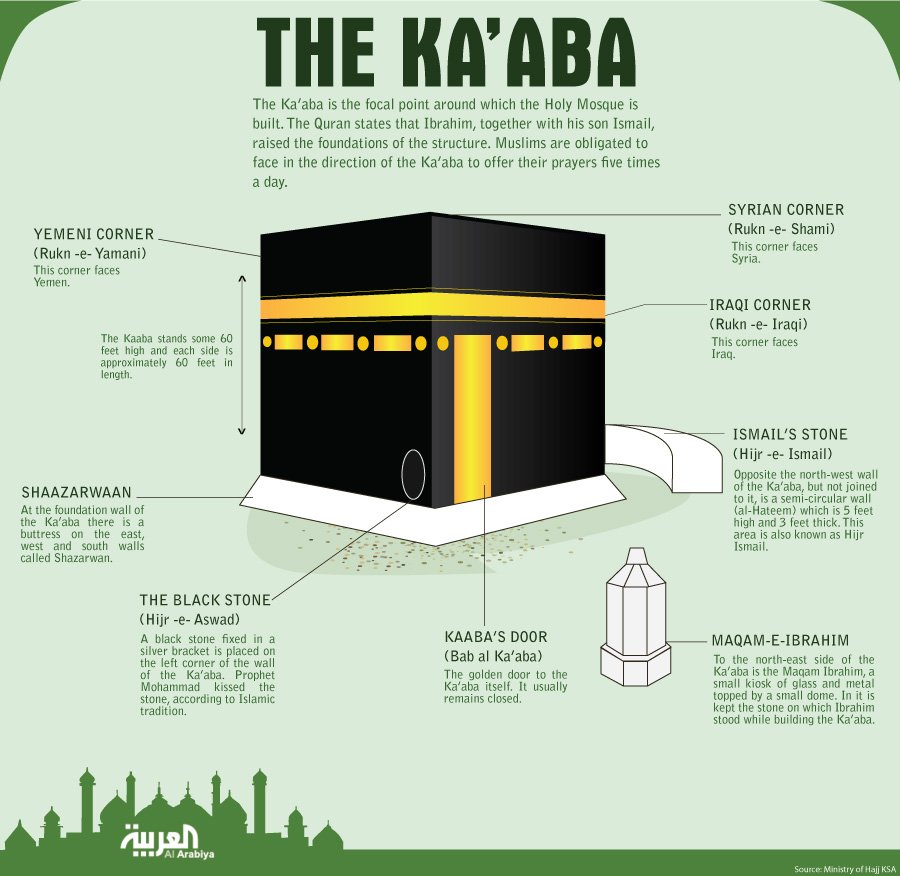

Inside the Kabah
Here’s some information on the interior of the Kabah:
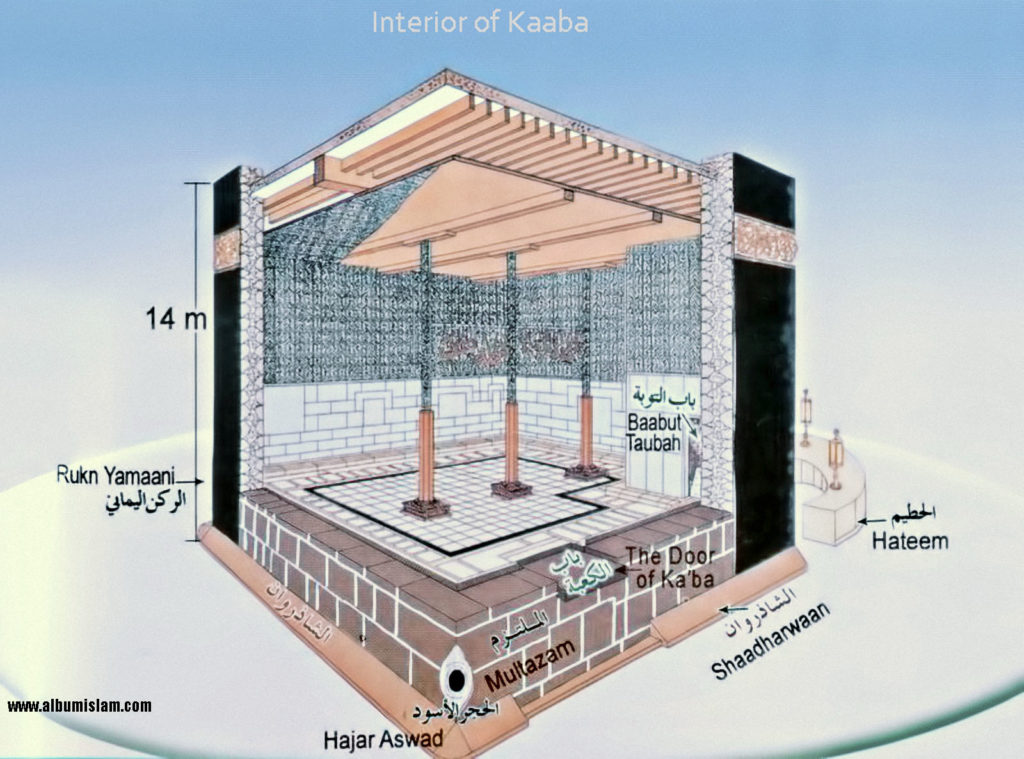
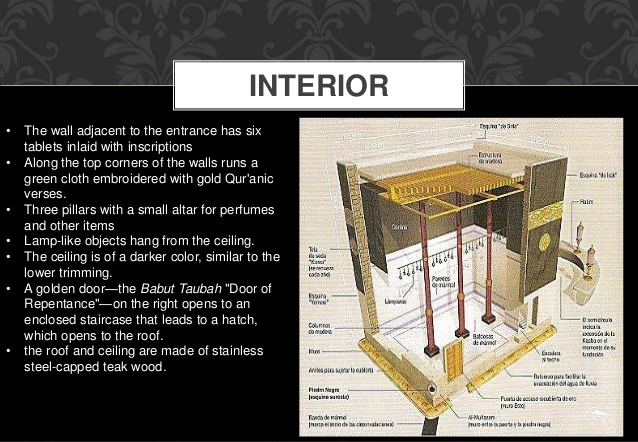
This is what it looks like inside:

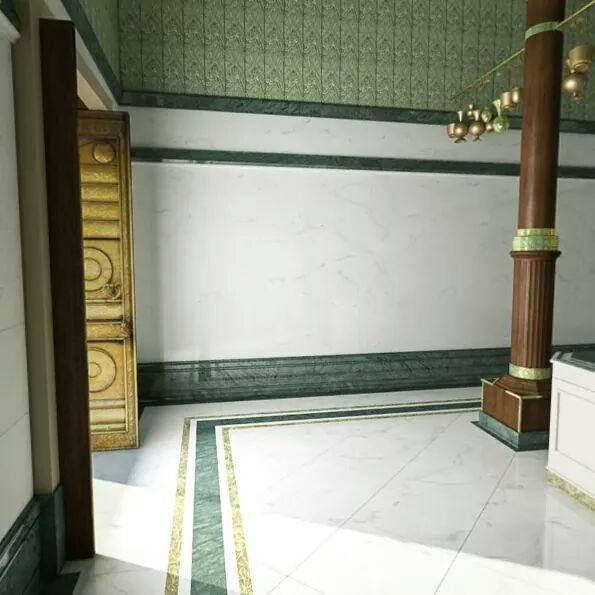
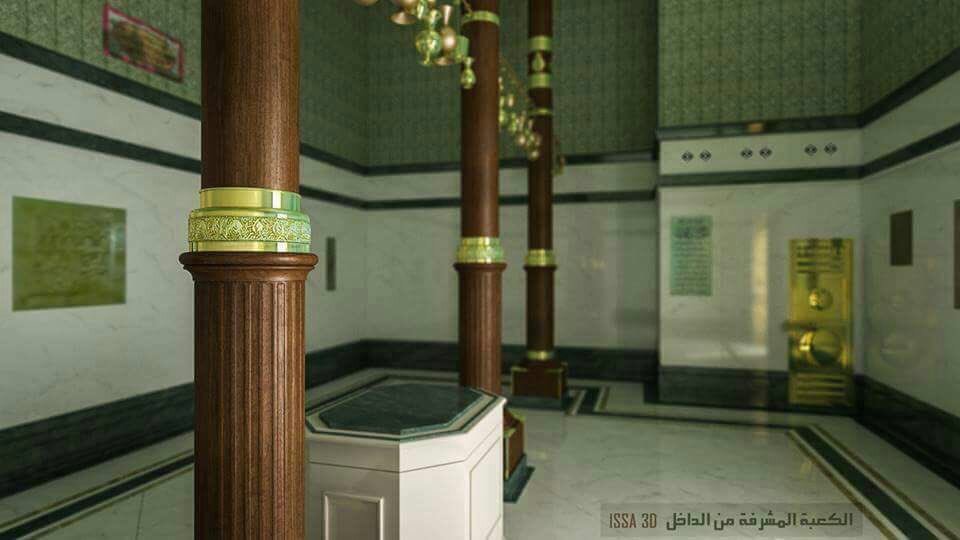

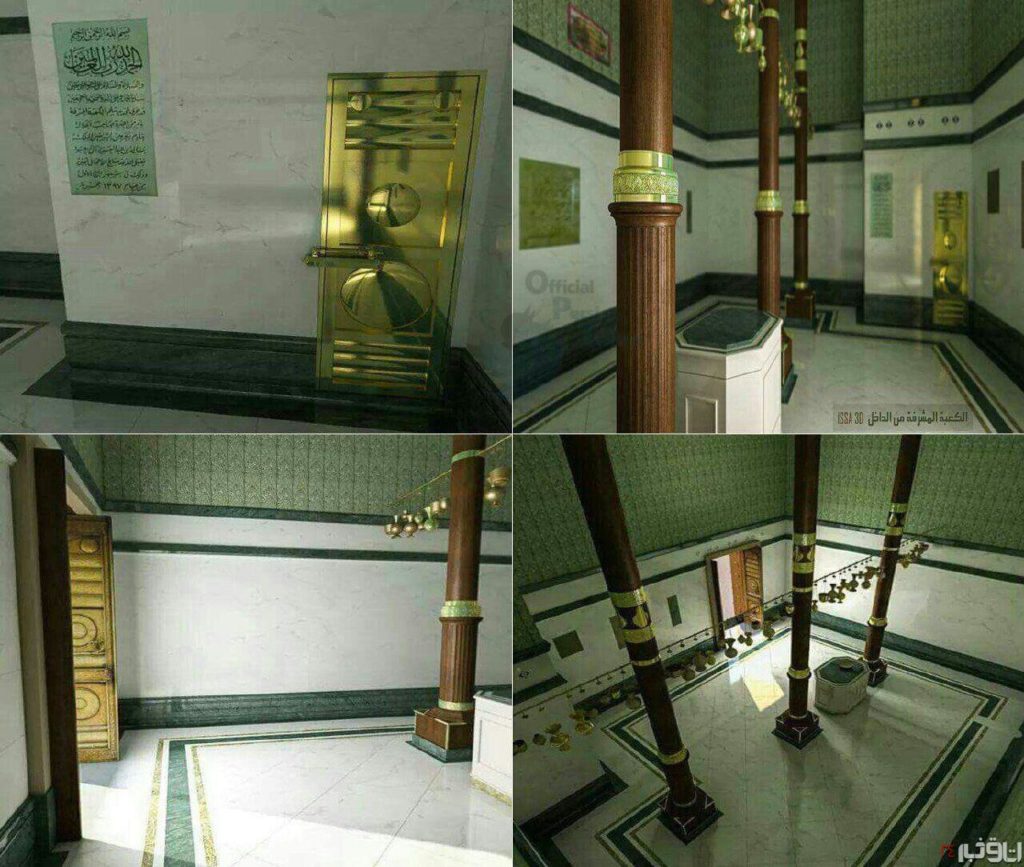
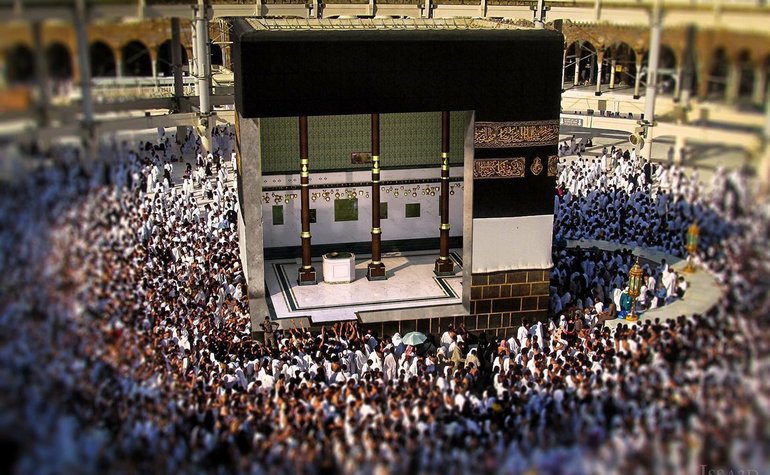
One can pray inside the Kabah as the Prophet (sallallahu alaihi wasallam) prayed inside it.
عَنْ سَالِمٍ، عَنْ أَبِيهِ، أَنَّهُ قَالَ دَخَلَ رَسُولُ اللَّهِ صلى الله عليه وسلم الْبَيْتَ هُوَ وَأُسَامَةُ بْنُ زَيْدٍ، وَبِلاَلٌ، وَعُثْمَانُ بْنُ طَلْحَةَ، فَأَغْلَقُوا عَلَيْهِمْ فَلَمَّا فَتَحُوا، كُنْتُ أَوَّلَ مَنْ وَلَجَ، فَلَقِيتُ بِلاَلاً فَسَأَلْتُهُ هَلْ صَلَّى فِيهِ رَسُولُ اللَّهِ صلى الله عليه وسلم قَالَ نَعَمْ، بَيْنَ الْعَمُودَيْنِ الْيَمَانِيَيْنِ
Narrated Salim that his father (radiallahu anhu) said:”Allah’s Messenger (sallallahu alaihi wasallam), Usama bin Zaid, Bilal, and Uthman bin Talha entered the Kabah and then closed its door. When they opened the door I was the first person to enter (the Kabah). I met Bilal and asked him, “Did Allah’s Messenger (sallallahu alaihi wasallam) offer a prayer inside (the Kabah)?” Bilal replied in the affirmative and said, “(The Prophet (sallallahu alaihi wasallam) offered the prayer) in between the two right pillars.” [Sahih Al-Bukhari, Volume 2, Hadeeth No. 668]
عَنْ نَافِعٍ، عَنِ ابْنِ عُمَرَ ـ رضى الله عنهما ـ أَنَّهُ كَانَ إِذَا دَخَلَ الْكَعْبَةَ مَشَى قِبَلَ الْوَجْهِ حِينَ يَدْخُلُ، وَيَجْعَلُ الْبَابَ قِبَلَ الظَّهْرِ، يَمْشِي حَتَّى يَكُونَ بَيْنَهُ وَبَيْنَ الْجِدَارِ الَّذِي قِبَلَ وَجْهِهِ قَرِيبًا مِنْ ثَلاَثِ أَذْرُعٍ، فَيُصَلِّي يَتَوَخَّى الْمَكَانَ الَّذِي أَخْبَرَهُ بِلاَلٌ أَنَّ رَسُولَ اللَّهِ صلى الله عليه وسلم صَلَّى فِيهِ، وَلَيْسَ عَلَى أَحَدٍ بَأْسٌ أَنْ يُصَلِّيَ فِي أَىِّ نَوَاحِي الْبَيْتِ شَاءَ
Narrated Nafi: Whenever Ibn Umar (radiallahu anhuma) entered the Kabah he used to walk straight keeping the door at his back on entering, and used to proceed on till about three cubits from the wall in front of him, and then he would offer the prayer there aiming at the place where Allah’s Messenger (sallallahu alaihi wasallam) prayed, as Bilal had told him. There is no harm for any person to offer the prayer at any place inside the Kabah. [Sahih Al-Bukhari, Volume 2, Hadeeth No. 669]
عَنْ مُجَاهِد، قَالَ أُتِيَ ابْنُ عُمَرَ فَقِيلَ لَهُ هَذَا رَسُولُ اللَّهِ صلى الله عليه وسلم دَخَلَ الْكَعْبَةَ. فَقَالَ ابْنُ عُمَرَ فَأَقْبَلْتُ وَالنَّبِيُّ صلى الله عليه وسلم قَدْ خَرَجَ، وَأَجِدُ بِلاَلاً قَائِمًا بَيْنَ الْبَابَيْنِ، فَسَأَلْتُ بِلاَلاً فَقُلْتُ أَصَلَّى النَّبِيُّ صلى الله عليه وسلم فِي الْكَعْبَةِ قَالَ نَعَمْ رَكْعَتَيْنِ بَيْنَ السَّارِيَتَيْنِ اللَّتَيْنِ عَلَى يَسَارِهِ إِذَا دَخَلْتَ، ثُمَّ خَرَجَ فَصَلَّى فِي وَجْهِ الْكَعْبَةِ رَكْعَتَيْنِ
Narrated Mujahid: Someone came to Ibn Umar (radiallahu ahuma) and said, “Here is Allah’s Messenger (sallallahu alaihi wasallam) entering the Kabah.” Ibn Umar (radiallahu ahuma) said, “I went there but the Prophet (sallallahu alaihi wasallam) had come out of the Kabah and I found Bilal standing between its two doors. I asked Bilal, ‘Did the Prophet (sallallahu alaihi wasallam) pray in the Kabah?’ Bilal replied, ‘Yes, he prayed two rakahs between the two pillars which are to your left on entering the Kabah. Then Allah’s Messenger (sallallahu alaihi wasallam) came out and offered a two rakahs prayer facing the Kabah.’ “ [Sahih Al-Bukhari, Volume 1, Hadeeth No. 390]
The Keys of the Kabah
Of course, not everyone can pray in the Kabah because it is locked to the public and only dignitaries get to go in.
Who has the keys to the Kabah? Well, it’s not the King of Saudi Arabia.
The key keeper in the Prophet’s time (sallallahu alaihi wasallam) was Uthman ibn Talha (radiallahu anhu) who was mentioned in the first narration above. He had been the keeper before he accepted Islam (a position that was passed down from his fathers) and he retained that privilege after he accepted Islam.
عَنِ ابْنِ عُمَرَ، قَالَ قَدِمَ رَسُولُ اللَّهِ صلى الله عليه وسلم يَوْمَ الْفَتْحِ فَنَزَلَ بِفِنَاءِ الْكَعْبَةِ وَأَرْسَلَ إِلَى عُثْمَانَ بْنِ طَلْحَةَ فَجَاءَ بِالْمِفْتَحِ فَفَتَحَ الْبَابَ – قَالَ – ثُمَّ دَخَلَ النَّبِيُّ صلى الله عليه وسلم وَبِلاَلٌ وَأُسَامَةُ بْنُ زَيْدٍ وَعُثْمَانُ بْنُ طَلْحَةَ وَأَمَرَ بِالْبَابِ فَأُغْلِقَ فَلَبِثُوا فِيهِ مَلِيًّا ثُمَّ فَتَحَ الْبَابَ . فَقَالَ عَبْدُ اللَّهِ فَبَادَرْتُ النَّاسَ فَتَلَقَّيْتُ رَسُولَ اللَّهِ صلى الله عليه وسلم خَارِجًا وَبِلاَلٌ عَلَى إِثْرِهِ فَقُلْتُ لِبِلاَلٍ هَلْ صَلَّى فِيهِ رَسُولُ اللَّهِ صلى الله عليه وسلم قَالَ نَعَمْ . قُلْتُ أَيْنَ قَالَ بَيْنَ الْعَمُودَيْنِ تِلْقَاءَ وَجْهِهِ . قَالَ وَنَسِيتُ أَنْ أَسْأَلَهُ كَمْ صَلَّى
Ibn Umar (radiallahu anhuma) reported: Allah’s Messenger (sallallahu alaihi wasallam) came on the Day of Victory, and got down in the courtyard of the Kabah and he sent (a message) for Uthman ibn Talha (radiallahu anhu). He came with the key and opened the door. Allah’s Messenger (sallallahu alaihi wasallam) then entered therein and Bilal, Usama bin Zaid, and Uthman bin Talha (along with him), and then commanded the door to be closed. They stayed there for a considerable time, and then the door was opened, and Abdullah said: I was the first to meet Allah’s Messenger. (sallallahu alaihi wasallam). outside (the Kabah), and Bilal was close behind him. I said to Bilal: Did Allah’s Messenger (sallallahu alaihi wasallam) observe prayer therein? He said: Yes. I said: Where? He said: Between the two pillars in front of his face. He said: I forgot to ask him as to the number of rakahs he prayed. [Sahih Muslim, Hadeeth No. 3069]
The following verse was said to be revealed about the keys of the Kabah and Uthman ibn Talha:
إِنَّ اللَّـهَ يَأْمُرُكُمْ أَن تُؤَدُّوا الْأَمَانَاتِ إِلَىٰ أَهْلِهَا وَإِذَا حَكَمْتُم بَيْنَ النَّاسِ أَن تَحْكُمُوا بِالْعَدْلِ ۚ إِنَّ اللَّـهَ نِعِمَّا يَعِظُكُم بِهِ ۗ إِنَّ اللَّـهَ كَانَ سَمِيعًا بَصِيرًا
Verily! Allah commands that you should render back the trusts to those, to whom they are due; and that when you judge between men, you judge with justice. Verily, how excellent is the teaching which He (Allah) gives you! Truly, Allâh is Ever All-Hearer, All-Seer. [Surah An-Nisaa (4) : 58]
Ibn Kathir states in his explanation of this verse:
“Allah commands that the trusts be returned to their rightful owners. Al-Hasan narrated that Samurah said that the Messenger of Allah said,
«أَدِّ الْأَمَانَةَ إِلى مَنِ ائْتَمَنَكَ، وَلَا تَخُنْ مَنْ خَانَك»
(Return the trust to those who entrusted you, and do not betray those who betrayed you.) Imam Ahmad and the collectors of Sunan recorded this Hadith. This command refers to all things that one is expected to look after, such as Allah’s rights on His servants: praying, Zakah, fasting, penalties for sins, vows and so forth. The command also includes the rights of the servants on each other, such as what they entrust each other with, including the cases that are not recorded or documented. Allah commands that all types of trusts be fulfilled. Those who do not implement this command in this life, it will be extracted from them on the Day of Resurrection. It is recorded in the Sahih that the Messenger of Allah said,
«لَتُؤَدَّنَّ الْحُقُوقُ إِلى أَهْلِهَا حَتَّى يُقْتَصَّ لِلشَّاةِ الْجَمَّاءِ مِنَ الْقَرْنَاء»
(The rights will be rendered back to those to whom they are due, and even the sheep that does not have horns will take revenge from the horned sheep.) Ibn Jarir recorded that Ibn Jurayj said about this Ayah, “It was revealed concerning Uthman bin Talhah from whom the Messenger of Allah took the key of the Kabah and entered it on the Day of the victory of Makkah. When the Prophet went out, he was reciting this Ayah,
﴿إِنَّ اللَّهَ يَأْمُرُكُمْ أَن تُؤدُّواْ الاحَمَـنَـتِ إِلَى أَهْلِهَا﴾
(Verily, Allah commands that you should render back the trusts to those, to whom they are due). He then called Uthman and gave the key back to him.” Ibn Jarir also narrated that Umar bin Al-Khattab said, “When the Messenger of Allah went out of the Kabah, he was reciting this Ayah,
﴿إِنَّ اللَّهَ يَأْمُرُكُمْ أَن تُؤدُّواْ الاحَمَـنَـتِ إِلَى أَهْلِهَا﴾
(Verily, Allah commands that you should render back the trusts to those, to whom they are due). May I sacrifice my father and mother for him, I never heard him recite this Ayah before that.” It is popular that this is the reason behind revealing the Ayah (4:58). Yet, the application of the Ayah is general, and this is why Ibn Abbas and Muhammad bin Al-Hanafiyyah said, “This Ayah is for the righteous and wicked,” meaning it is a command that encompasses everyone.”
(Please note that the narration about Uthman ibn Talha seems to be weak. However, the reason for revelation is always mentioned as being about him.)
The keys of the Kabah then passed on to his cousin Shaiba. All the key keepers after him until the present time are from the descendants of Shaiba.
Here’s a video where the history of this profession is discussed.
Here’s what some of the keys of the past looked like:
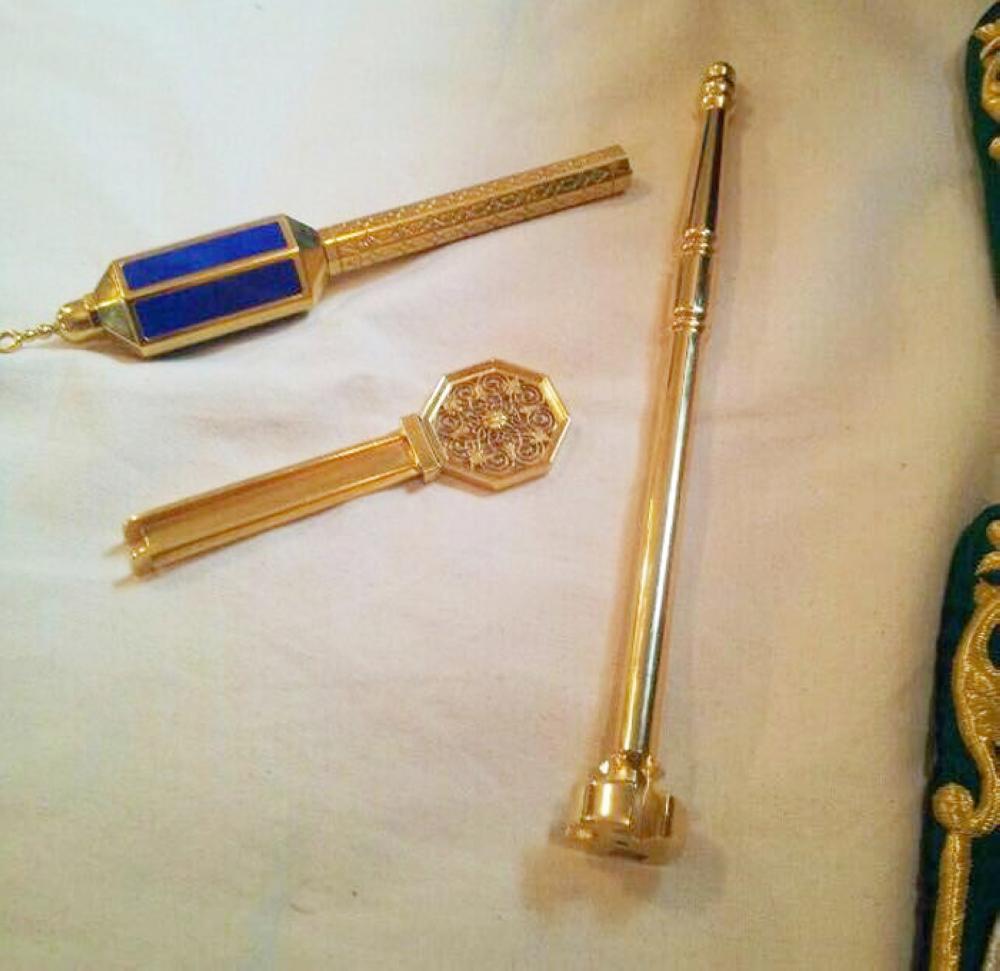
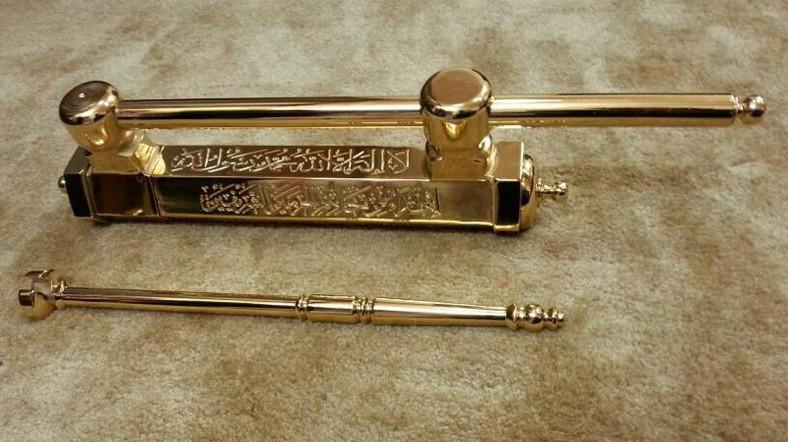
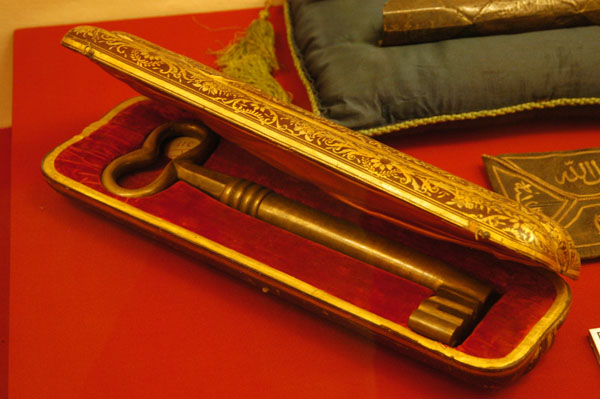
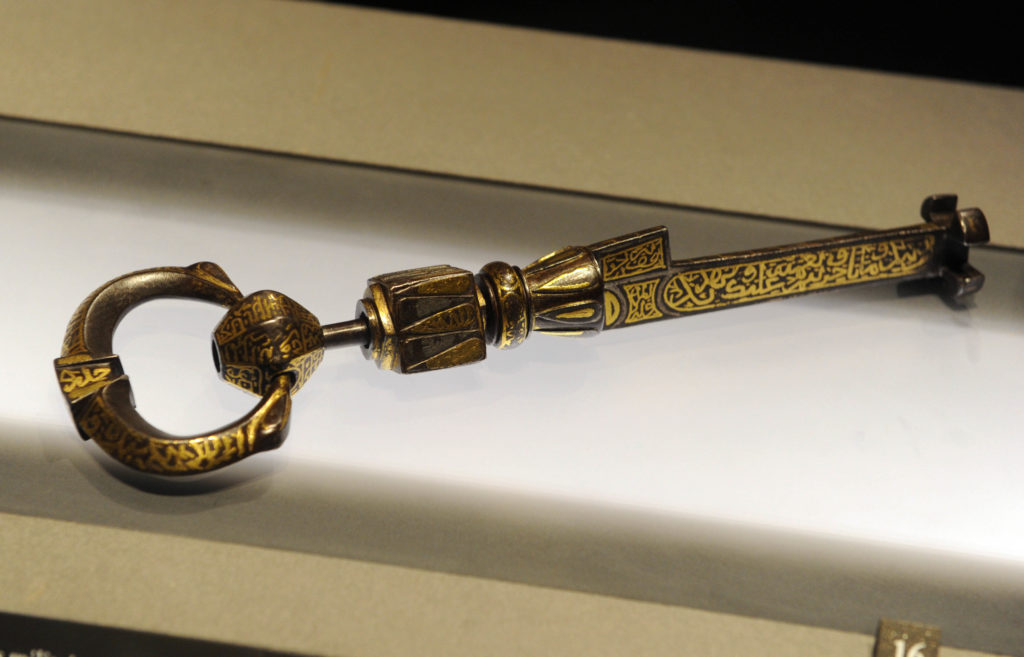
The Hijr (Hateem)
As mentioned in Part 3, the Hijr (also known as the Hateem) is part of the Kabah, so praying there is like praying in the Kabah.
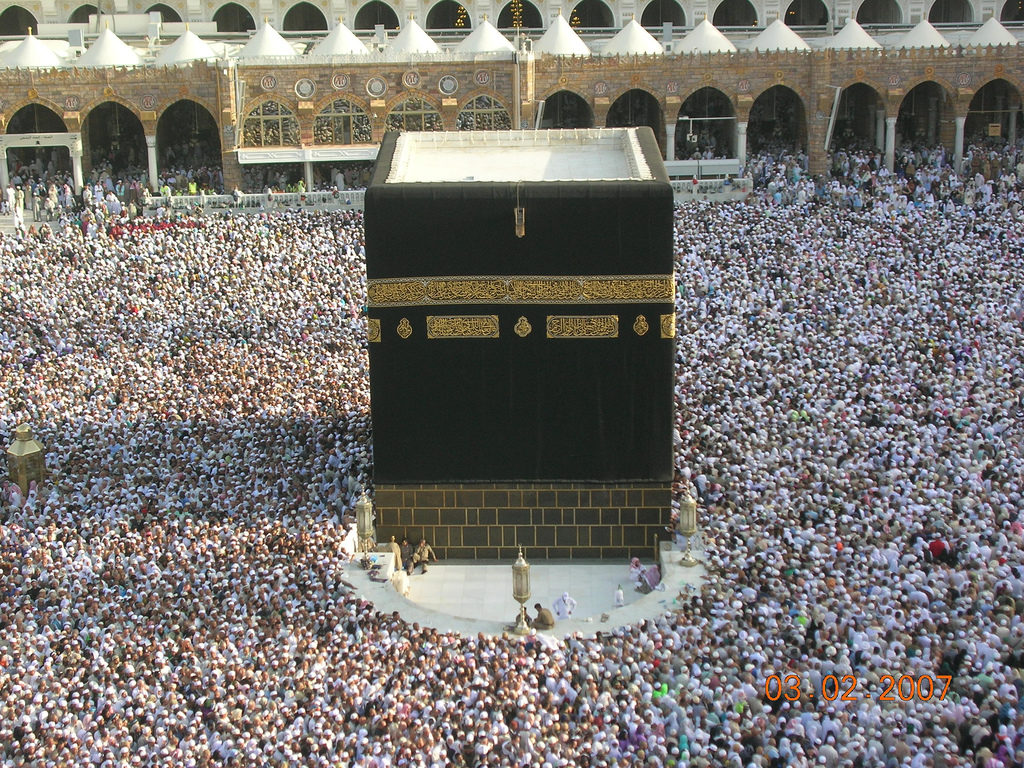
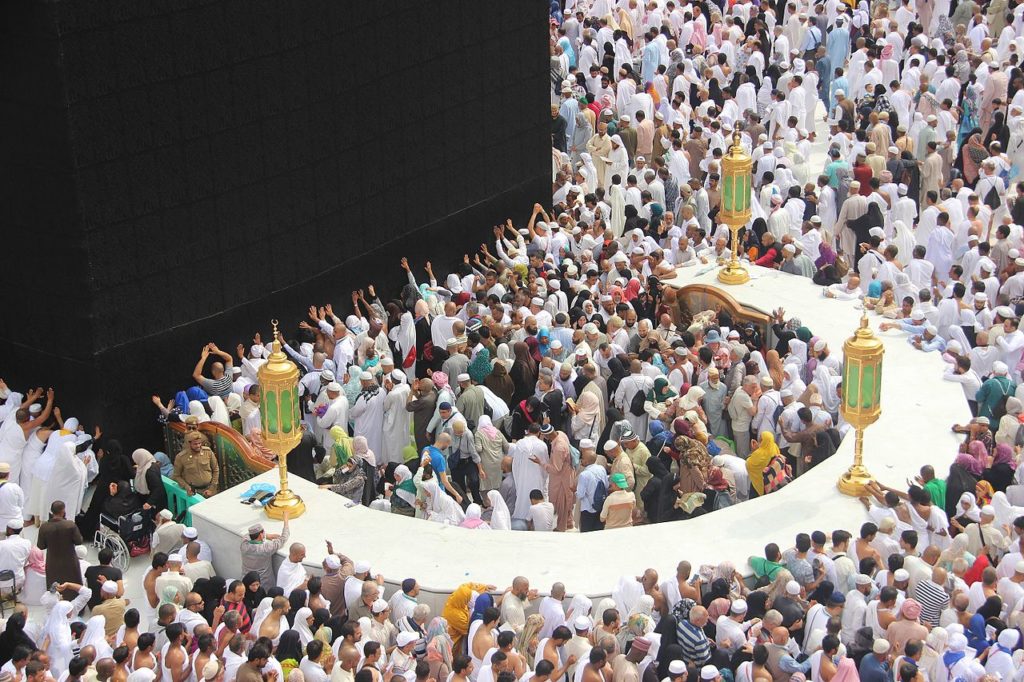
عَنْ عَائِشَةَ، أَنَّهَا قَالَتْ كُنْتُ أُحِبُّ أَنْ أَدْخُلَ الْبَيْتَ فَأُصَلِّيَ فِيهِ فَأَخَذَ رَسُولُ اللَّهِ صلى الله عليه وسلم بِيَدِي فَأَدْخَلَنِي فِي الْحِجْرِ فَقَالَ : صَلِّي فِي الْحِجْرِ إِذَا أَرَدْتِ دُخُولَ الْبَيْتِ فَإِنَّمَا هُوَ قِطْعَةٌ مِنَ الْبَيْتِ فَإِنَّ قَوْمَكِ اقْتَصَرُوا حِينَ بَنَوُا الْكَعْبَةَ فَأَخْرَجُوهُ مِنَ الْبَيْتِ
Narrated Aishah (radiallahu anha), Ummul Mumineen: I liked to enter the House (the Kabah) and pray therein. The Messenger of Allah (sallallahu alaihi wasallam) caught me by hand and admitted me to al-Hijr. He then said: Pray in al-Hijr when you intend to enter the House (the Kabah), for it is a part of the House (the Kabah). Your people shortened it when they built the Kabah, and they took it out of the House. [Sunan Abee Dawood, Hadeeth No. 2028. Graded “hasan sahih” (authentic) by Al-Albani.]
Please note that the prayers in the Hijr, and in the Kabah and on its roof should be limited to nafl (voluntary) prayers. Why? Because there is a dispute amongst the scholars over whether fard (obligatory) prayers are valid in these places as they do not face the Qiblah (as the Kabah itself is the Qiblah). You may refer to this article for more information.
The Kiswa (Cover) of the Kabah
The cover of the Kabah is called kiswa. Every year (on the Day of Arafah), a new one is placed on the Kabah.
Here’s what some of the past covers have looked like:
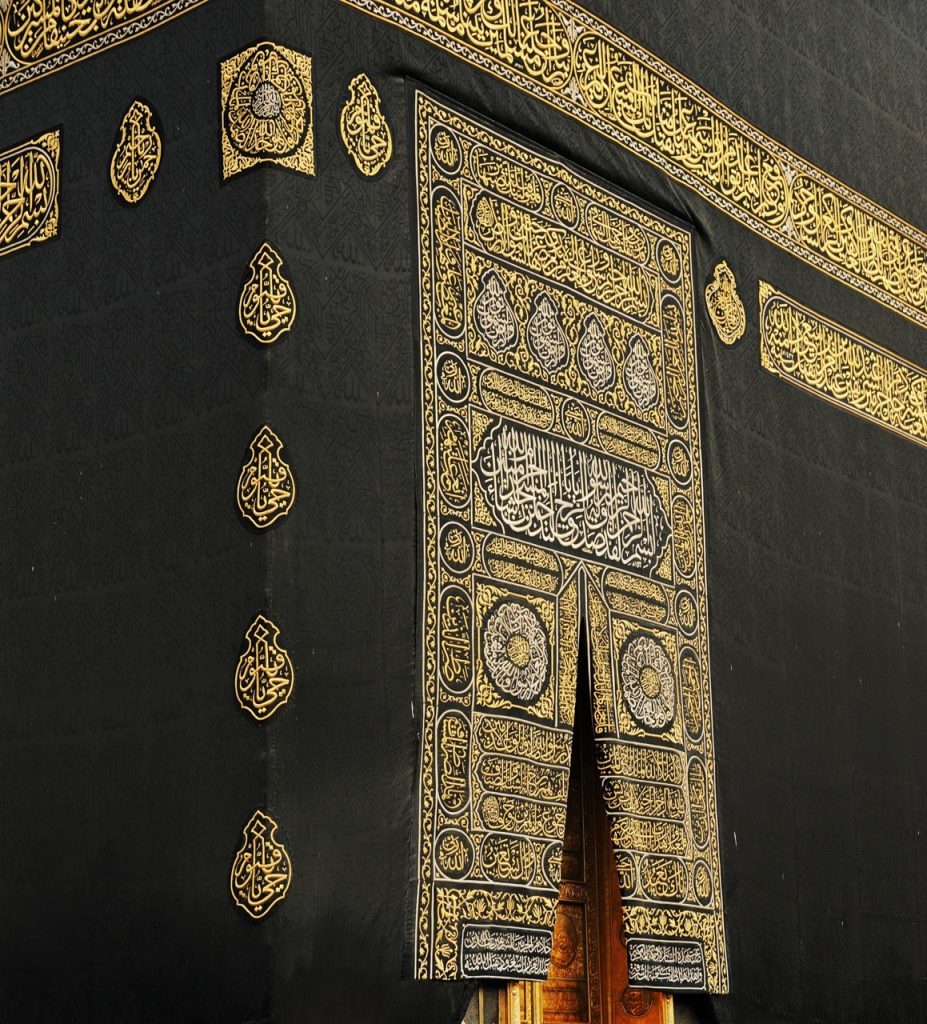
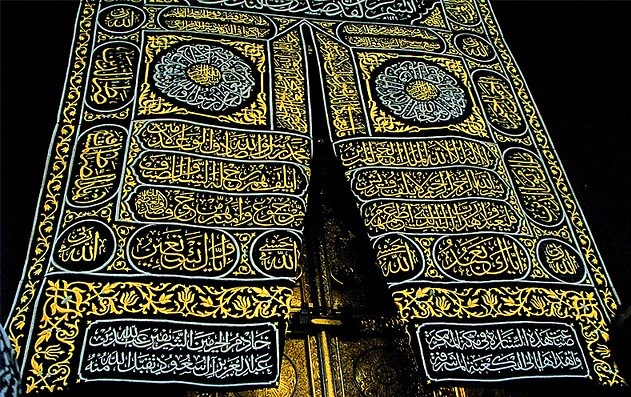
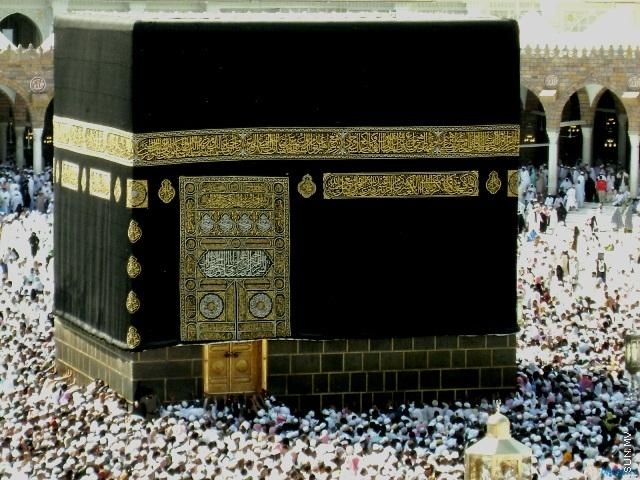
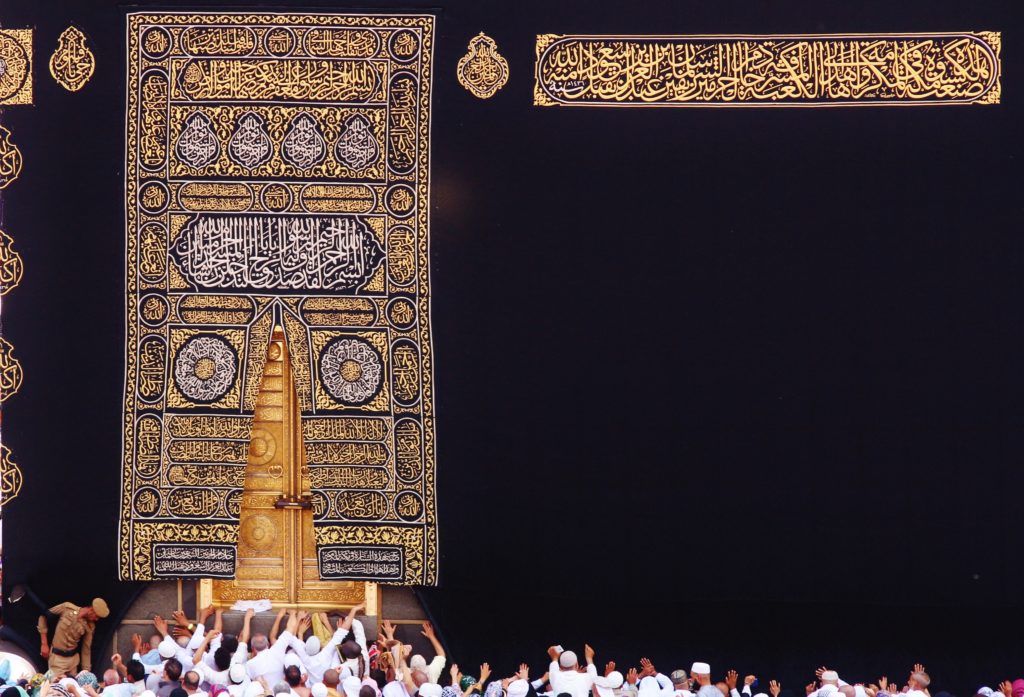
Here’s a video on the history of the kiswa:
And here’s a video showing the cover being changed:
Entering Masjid Al-Haram
Before entering the Haram, one needs to realised that they are going to the best masjid on the planet. Therefore, one needs to know all the rules associated with masjids.
Here are some resources that will help one to behave appropriately in the Houses of Allah:
Etiquettes within the Houses of Allah (Masaajid) – Brother Mustafa George
Speaking about worldly matters in the mosque – Islam QA
The Book of Manners – Brother Fuad ibn Abdul Azeez Ash-Shulhoob. This book has a nice section on the manners related to masjids.
Here’s a look at some of the gates of the Haram:
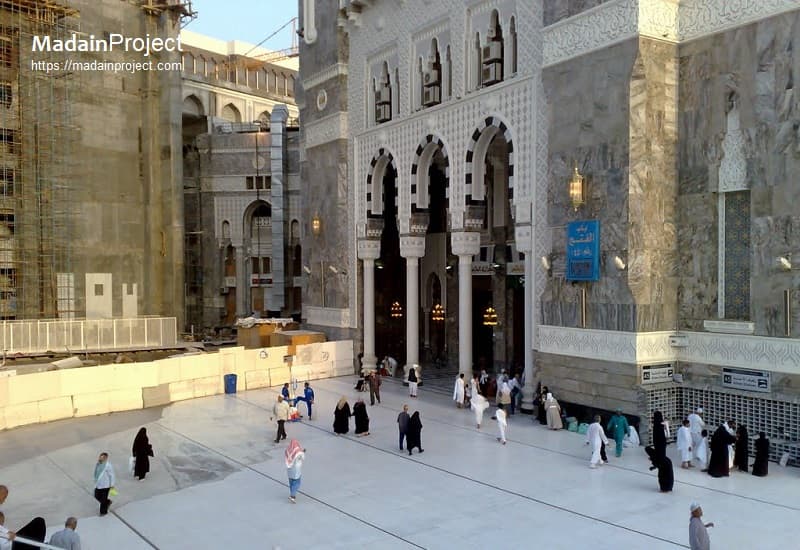
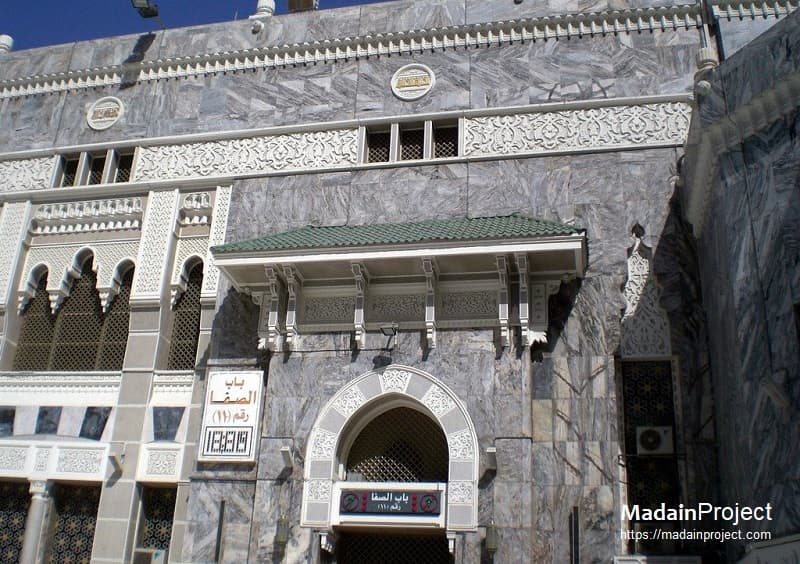
Now, what should a pilgrim to first – tawaf or tahiyyatul masjid (the 2 rakahs prayer for greeting the masjid)?
Well, this article discusses the issue. To summarise, the pilgrim needs to do tawaf if that’s what they came to do.
What about if he comes in Ramadan and its taraweeh time? Should he pray first or do tawaf? Well, this article has the answer.
Now, the pilgrim needs to head straight for Tawaf. He/she shouldn’t forget the following advice of the Prophet (sallallahu alaihi wasallam):
عن ابن عمر قال: قال رسول الله صلى الله عليه وسلم: استمتِعوا مِن هذا البيتِ فإنَّه قد هُدِم مرَّتَيْنِ ويُرفَعُ في الثَّالثةِ
Ibn Umar (radiallahu anhuma) narrated that the Messenger of Allah (sallallahu alaihi wasallam) said: “Enjoy this House, as it has been destroyed twice and will be raised up on the third.” [Sahih Ibn Hibban, Hadeeth No. 6753. Shuaib Al-Arnaut said that its isnaad (chain) was sahih (authentic).]
You’ll notice the masjid is very clean – which it should be because we were commanded to purify the place.
وَإِذْ بَوَّأْنَا لِإِبْرَاهِيمَ مَكَانَ الْبَيْتِ أَن لَّا تُشْرِكْ بِي شَيْئًا وَطَهِّرْ بَيْتِيَ لِلطَّائِفِينَ وَالْقَائِمِينَ وَالرُّكَّعِ السُّجُودِ
And [mention, O Muhammad], when We designated for Ibrahim the site of the House, [saying], “Do not associate anything with Me and purify My House for those who perform Tawaf and those who stand [in prayer] and those who bow and prostrate.” [Surah Al-Hajj (22) : 26]
Of course, the most important type of purification is purifying the place from shirk (attributing partners to Allah) and sins. However, the meaning includes keeping the place clean from filth as pointed out by Imam As-Saadi in his explanation of this verse.
Here’s a look at the people who keep the place clean:
The Haram always looks spick and span but we never appreciate all the workers who do all the hard work. May Allah accept it from them and grant them Al-Firdaus.
One day in the Haram
A brother made a whole documentary on what one day in the Haram is like, subhan Allah! It seems to be approved by the Saudi Government as well, alhamdulillah.
I purchased the documentary and found it to be wonderful. It was very informative and the camera work was excellent. There was no music (only some after the end credits). There were some errors in it but overall, I would say that it is a must watch especially for those who need to be convinced to go for Hajj and Umrah, and also for the younger generation.
It was about one hour in length so not too long.
Here are some clips from it (there’s no music, just a music-free nasheed):
Warning
I should end this part with a warning. The Haram is swarming with thieves. Yes, you read that correctly.
You need to NOT take any valuable items when you go there. You need to put on your cheapest shoes and also try to wear khuffs (leather socks) so just in case your shoes get stolen you can walk home in the khuffs.
Ladies, you need to make sure to use the ugliest bag possible.
And no, I’m not joking. My bag got stolen in Masjid An-Nabawi and a relative’s relative had her money stolen during Tawaf if I recall correctly. Sadly, some people just come to the Haram to loot others so everyone needs to be careful.
[Here’s Part 7.]
